THE HARVARD CRIMSON
Black Students Form AFRO, Activism Org
ACTIVISM. A group of Black students formed the African and African American Resistance Organization, a space for activism around issues relevant to Black students across the University.
SEE PAGE 4
ARTS
‘It Lives Inside’ Review:
CULTURAL IDENTITY.
Bishal Dutta crafts a tale that transcends the bounds of conventional horror. Beneath the eerie whispers and unsettling visuals lies a deeper, uncharted abyss — a profound exploration of cultural identity.
SEE PAGE 14
Eliot House Faculty Deans to Step Down
HOUSE LIFE. Kevin J. Madigan and Stephanie A. Paulsell will
Students Hold Vigil to Mourn Victims in Morocco, Libya
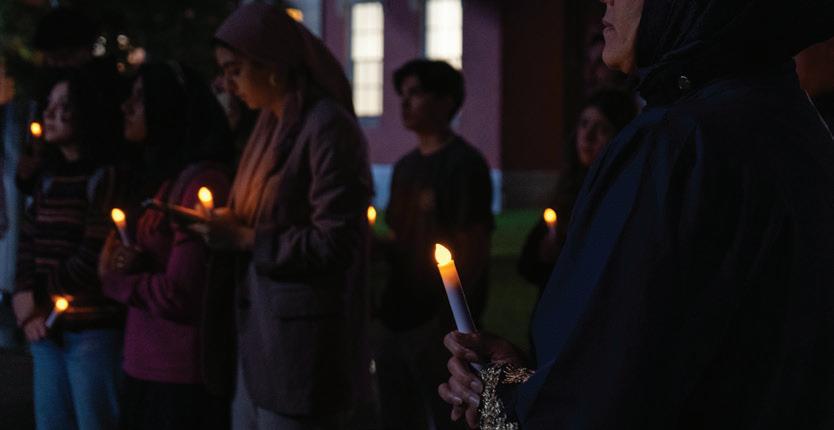
Joe’s Pizza Makes its Debut in Harvard Square
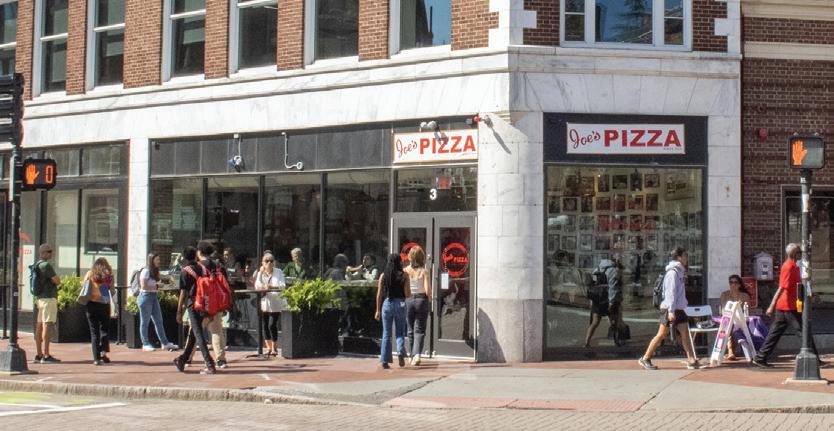
Harvard, Securitas Retaliated Against Guard, Regional National Labor Relations Board Claims
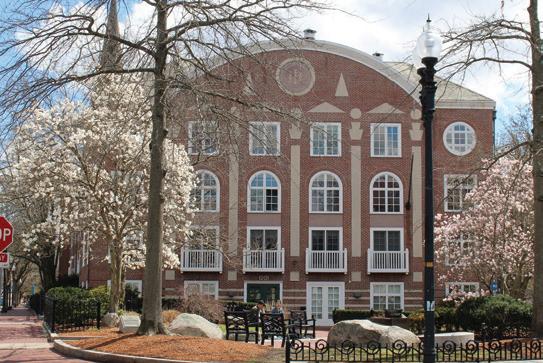
Harvard University and Securitas retaliated against Walter J. Terzano, a guard who has worked for Securitas since 2009, Boston’s regional labor relations board alleged in a previously unreported complaint issued earlier this month.
A regional division of the National Labor Relations Board concluded in the Sept. 14 complaint and notice of hearing that Terzano was unfairly suspended and removed from his post on campus for protesting during Securitas’ 2022 union contract negotiations. Because Harvard contracts nearly 300 guards through Securitas, it never directly employed Terzano, who initially filed a
ADMISSIONS
SEE
An Overdue Process for Misconduct
Following the Supreme Court’s decision to strike down affirmative action in higher education admissions, Harvard has instructed alumni interviewers to not take an applicant’s race or ethnicity into account in evaluations, according to updated guidelines obtained by The Crimson.
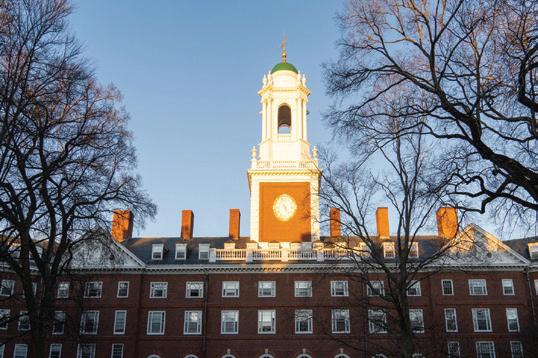
“To the extent that an applicant’s race, ethnicity, or family’s country of origin seems apparent to an interviewer, the interviewer may not consider that information in the interview process, including evaluation, making recommendations about, or assigning ratings to the student,” state the guidelines, which apply to applicants for the College’s Class of 2028. After nearly a decade of litigation between anti-affirmative action group Students for Fair Admissions and Harvard,
retaliation charge with the NLRB in April 2022.
Terzano had created protest signs and encouraged other guards to rally outside former University President Lawrence S. Bacow’s house in January and February 2022 amid a particularly contentious contract negotiation period for the guards’ union, Service Employees International Union 32BJ.
According to the complaint, less than a month later, Harvard Director of Facilities and Maintenance Kate Loosian “complained about Terzano” to Securitas representatives, and Securitas suspended him. Harvard then “directed that Terzano be removed” from campus on Feb. 21, 2022.
Securitas then “involuntarily transferred” Terzano out of Harvard Square on March 28, 2022, the same day the union
voted to ratify their contract.
These actions, the NLRB alleges, were causally related to Terzano’s protest activity and constitute unfair labor practices taken to discourage other guards from engaging in similar forms of protest.
The complaint determined that Harvard and Securitas “have been interfering with, restraining, and coercing employees in the exercise of the rights” guaranteed under the National Labor Relations Act.
Securitas Area Vice President Christopher Connolly and Area Manager Alonzo B. Herring did not respond to multiple requests for comment, and Harvard spokesperson Jason A. Newton declined to comment for this article.
After a party files a charge against their employer or organization, NLRB agents investigate the charge by collect-
COLLEGE
the Supreme Court ruled in favor of SFFA in June — declaring race-based affirmative action in violation of the Equal Protection Clause of the 14th Amendment. That day, Harvard said it would abide by the ruling but reaffirmed its commitment to diversity. The Court’s decision, however, contained a significant exception: Universities may still take into account how an applicant’s identity has shaped their personal growth.
The Court’s majority opinion, written by Chief Justice John Roberts ’76, states that nothing in the opinion prohibits universities “from considering an applicant’s discussion of how race affected his or her life.” Still, the opinion holds that universities may not “simply establish through application essays or other means the regime we hold unlawful today.”
Harvard’s refreshed guidelines for alumni interviewers include sample
SEE PAGE 4
The Harvard College Dean of Students Office will not recognize newly formed student organizations for the 2023-24 academic year, according to a Sept. 13 statement from Assistant Dean of Student Engagement and Leadership Andrew Donahue.
The pause on recognition of new clubs “will allow the Dean of Students Office and Office of Student Engagement to conduct a thorough assessment of the independent student engagement environment on Harvard’s campus,” reads the statement.
The DSO first proposed a freeze in recognizing new student organizations in April, when Associate Dean for Student Engagement Jason R. Meier said it would give the DSO a chance to address an imbalance between the number of clubs it
ing evidence and, in some cases, affidavits from witnesses and involved parties. The regional director then evaluates the evidence and makes a decision related to the merits of the charge. If the charge is not dismissed, withdrawn, or settled, the regional board issues a complaint and notice of hearing. Then, the board serves as the charging party’s representative, and respondents and other involved parties appear before an NLRB administrative law judge for a hearing.
In the complaint, NLRB Regional Director Laura A. Sacks set Terzano’s hearing for Jan. 9, 2024. Harvard and Securitas have until Thursday to respond to the complaint.
Terzano declined to comment for this
SEE PAGE 5
supports and the resources it has to do so.
Though the decision was first publicized in Donahue’s statement, which was embedded in the Sept. 14 Harvard College weekly update newsletter, an email obtained by The Crimson shows that the DSO had turned away new club applications since as early as July.
The pause is the latest in a series of interventions by the College — including updated restrictions on Harvard branding guidelines and DSO plans for an audit of independent student organizations — that have increased the regulation of student organizations.
According to Harvard spokesperson Jonathan Palumbo, the College recognizes more than 470 independent student organizations. Clubs receive benefits related to event advising and planning, on-campus recruitment, use of the Harvard College name, support services, and finance and fundraising management,
SEE PAGE 8
THE UNIVERSITY DAILY, EST. 1873 | VOLUME CL, NO. 22 | CAMBRIDGE, MASSACHUSETTS | FRIDAY, SEPTEMBER 29, 2023
FAS LABOR
PAGE
SQUARE PAGE 4 VIGIL
11
COLLEGE
step down from their role as Eliot House faculty deans at the end of the 2023-24 academic year, citing a family illness.
PAGE 5
LIFE TRANSPARENCY. Harvard has
responsibility
step up and lead by establishing detailed procedures for a transparent, fair system of adjudication in response to claims of research misconduct.
PAGE 9
HOUSE
a
to
SEE
EDITORIAL Alumni Interviewers Not to Consider Race College DSO Freezes New Club Recognition
CAM
BY ELLA L. JONES AND JOHN N. PEÑA CRIMSON STAFF WRITERS RestructuringHumanitiesthe A NEW CHAPTER. An internal document and interviews with professors and Arts and Humanities Dean Robin Kelsey suggest new directions for Harvard’s humanities. But a proposal that would combine four language programs has faced resistance from some faculty. SEE PAGE 6 BY
STAFF WRITERS SAMI E. TURNER — CRIMSON DESIGNER
BY
E. KETTLES CRIMSON STAFF WRITER
MICHELLE N. AMPONSAH AND EMMA H. HAIDAR CRIMSON
LAST WEEK 2
Unequal Mortgage Loan Denial Rates
Tensions Rise in City Council Forum
MORTGAGE DENIAL. Black and Latinx borrowers faced significantly higher mortgage lending denial rates in Cambridge and in Massachusetts broadly in 2021, according to a June 2023 report. Published by the Woodstock Institute and the Partnership for Financial Equity, the June report analyzed 2021 Massachusetts data from the Home Mortgage Disclosure Act, coming as the latest installment of an annual report examining financial opportunity in Massachusetts. The mortgage data mirrors broader trends in Massachusetts. BY ERIKA K. CHUNG AND EMILY L. DING — CRIMSON STAFF WRITERS
AROUND THE IVIES
WORKERS AND STUDENTS RALLY OVER EMPLOYEES’ LACK OF SUPPORT FROM UNIVERSITY
Last week, Princeton students joined campus workers to voice concerns over employees’ inadequate wages, restrictions on speech, and lack of support from the University. Many service workers submitted anonymous statements to be read aloud at the protest that captured frustrations over the lack of a livable wage they are offered.
THE DAILY PRINCETONIAN
COLUMBIA HOSTS ANNUAL WORLD LEADERS FORUM
At its 20th World Leader’s Forum, Columbia welcomed a number of political leaders to campus last week. Luis Abinader Corona, president of the Dominican Republic, spoke about the costs of climate change and condemned the international community for not doing more to help Haiti. Klaus Werner Iohannis, president of Romania shared his country’s concerns on the refugee crisis developing due to the Russia-Ukraine war.
THE COLUMBIA SPECTATOR
YALE SHUTTLE OPERATOR FINED $725,000 TO SETTLE LAWSUIT
First Transit Inc. — the company operating the Yale Shuttle system — will pay local environmental justice organizations Gather New Haven and Connecticut Coalition for Environmental Justice $362,500 each as part of a settlement between the parties. The Conservation Law Foundation — an environmental advocacy foundation — first sued First Transit in 2022 for violating Connecticut’s Clean Air Act, which states that it is illegal for vehicles to idle for more than three minutes.
THE YALE DAILY NEWS
PENN CONDEMNS ANTISEMITISM FOLLOWING VANDALISM OF PENN HILLEL
Penn administrators condemned the vandalism at Penn Hillel and a swastika discovered at Meyerson Hall last Friday in an emailed statement to the Penn community. The day before, an individual vandalized the Hillel building and shouted “antisemitic obscenities about Jewish people,” according to a Hillel statement. In the University statement, Penn administrators acknowledged that the incident coincided with an on-campus event featuring “controversial speakers.”
THE DAILY PENNSYLVANIAN
CORNELL UNVEILS NEW ARTIFICIAL INTELLIGENCE GUIDELINES, EMBRACES NEW TECHNOLOGY

Cornell’s official stance on A.I. was outlined in an email sent to the student body on Wednesday after faculty and administration voiced concerns over the use of A.I. The guidelines hold users accountable for any erroneous information generated by A.I. and prohibit entering University information that may be confidential, proprietary, or otherwise considered sensitive or restricted into public generative A.I. tools. Otherwise, class guidelines are at an instructor’s discretion.
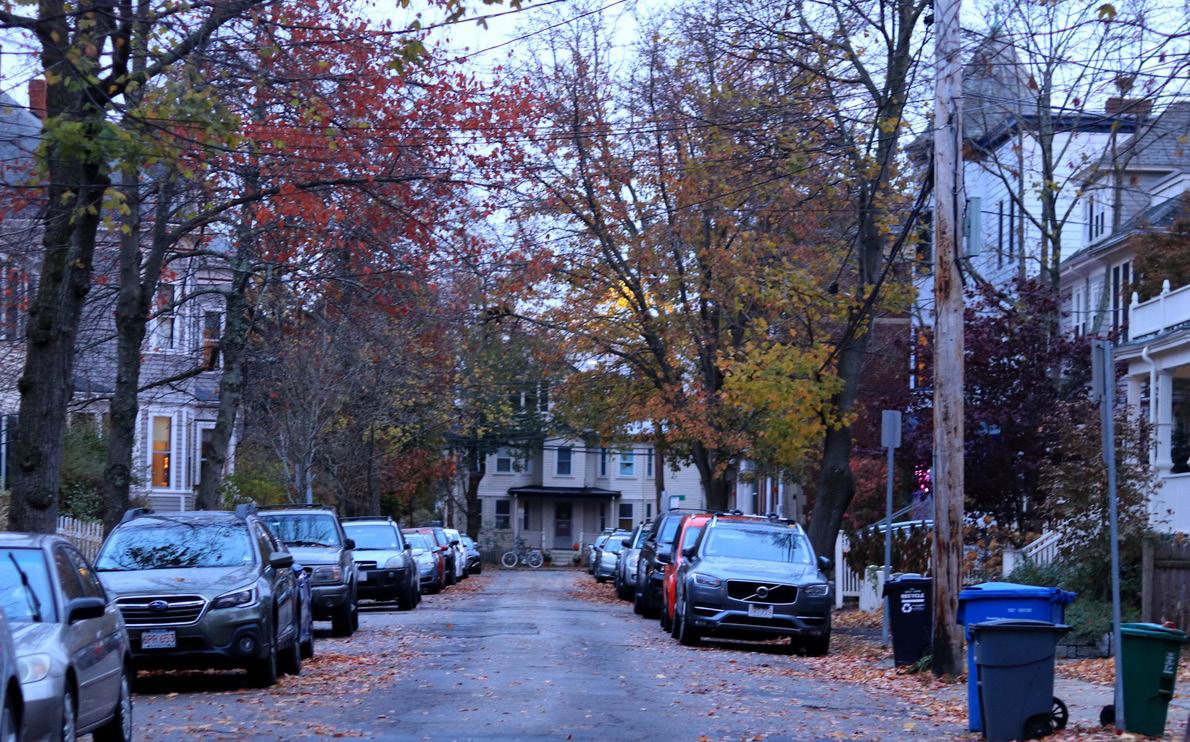
THE CORNELL DAILY SUN
CANDIDATE FORUM. Fourteen candidates for Cambridge City Council gathered at Emerson Hall in Harvard Yard for a forum organized by Harvard’s graduate student union on Tuesday. Two dozen people attended the forum — held both online and in person — which was jointly moderated by one Harvard and one MIT graduate student. Candidates were asked to share their positions on five issues — labor rights, public safety, affordable housing, bike safety, and climate change — and answer one question from the audience.
J. GIORDANO — CRIMSON STAFF WRITERS
JULIAN
BY MUSKAAN ARSHAD AND
STUDENT GOVERNMENT
HUA Seeks Budget Increase

BUDGET. The Harvard Undergraduate Association is requesting a significant budget increase from the Dean of Students Office to fund a larger portion of student organizations’ funding requests. Student organizations collectively requested more than $1 million in funding for the fall semester — nearly double the amount requested for the fall semester last year, which totaled around $505,530. Under the current budget, $180,000 of the HUA’s budget would be available for fall semester club funding requests — a median of $490 per club, per HUA projections. BY NATALIE K. BANDURA — CRIMSON STAFF WRITER
In Photos: Grupo Frontera Comes to Harvard




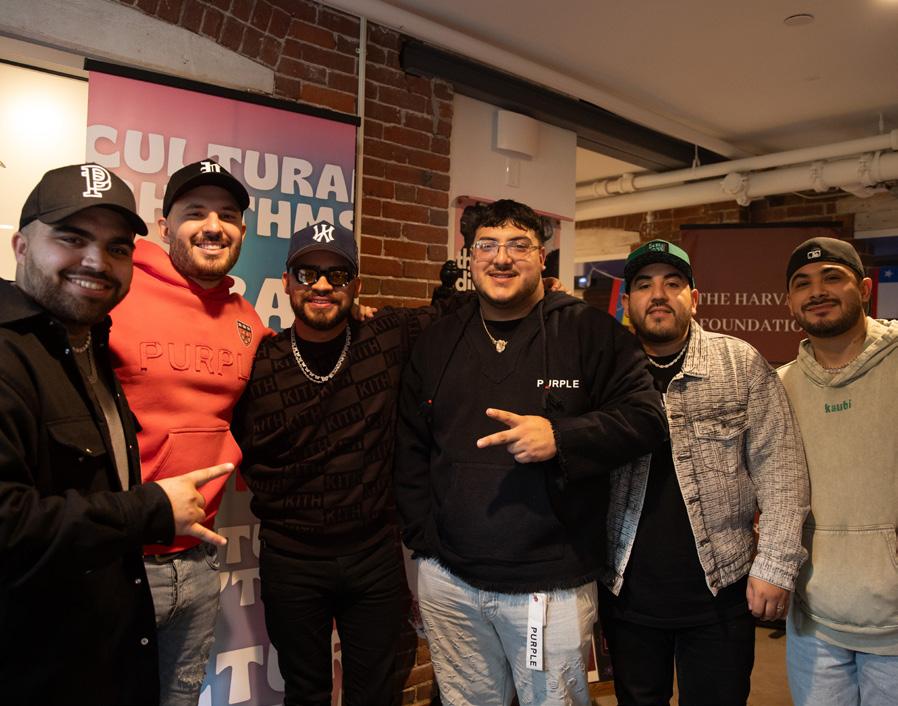
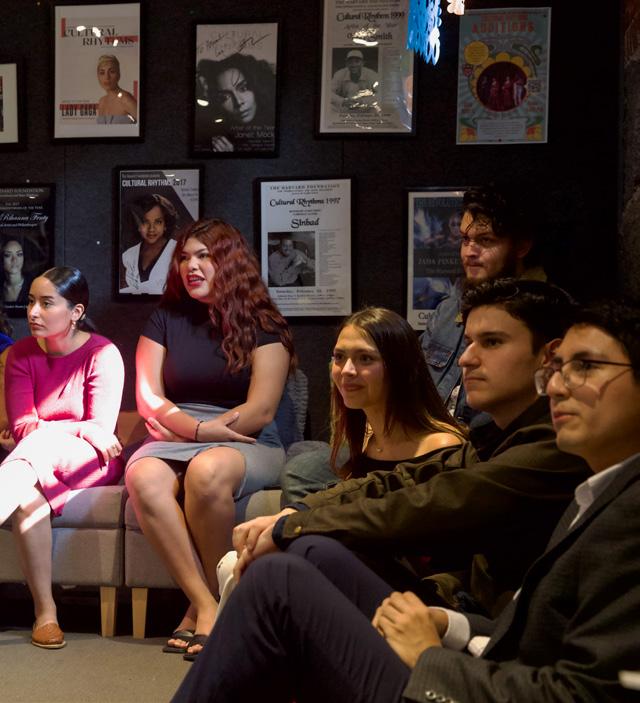
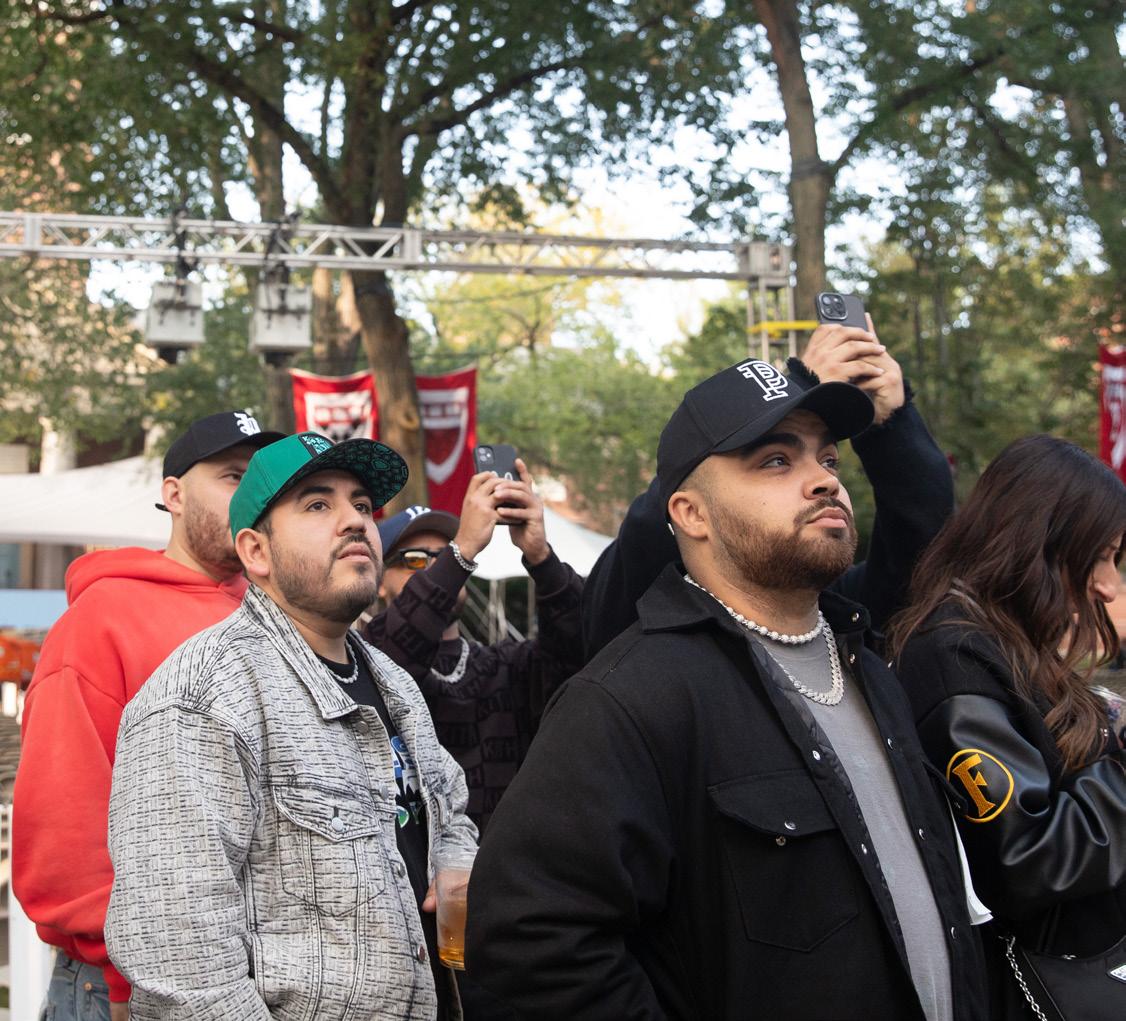
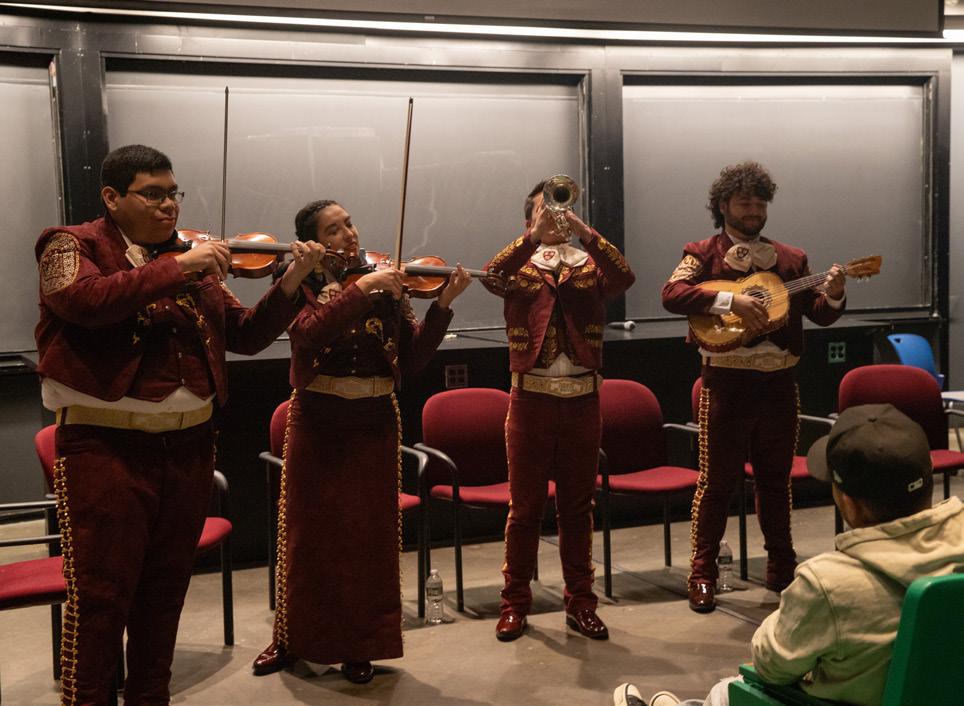
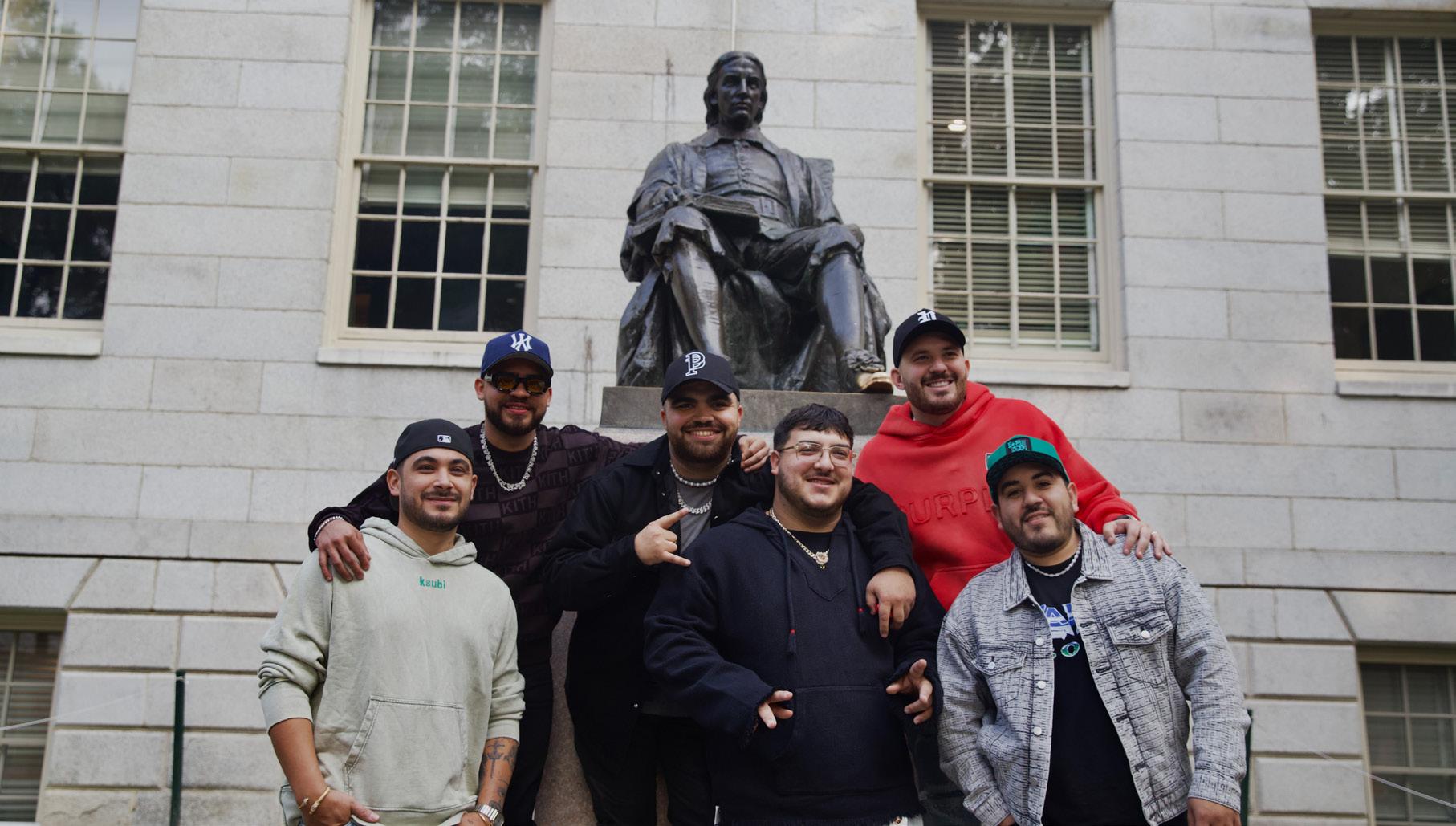 BY LEANNE ALVARADO — CRIMSON PHOTOGRAPHER
BY LEANNE ALVARADO — CRIMSON PHOTOGRAPHER
FROM EL VALLE TO HARVARD YARD
Grupo Frontera, a Mexican band from the Rio Grande Valley “el valle,” Texas visited Harvard on Wednesday for a conversation on their rise to fame. The band was hosted by Harvard-Radcliffe Raza, a student organization that honors Mexican and Latine student excellence on campus. The band members spoke to students about their lives in “el valle” Texas, growing up in a border city and reckoning with a new responsibility to their community after achieving stardom.
PHOTO OP. Grupo Frontera members pose for a photo with the John Harvard statue in Harvard Yard.
MARIACHI. Harvard Mariachi Veritas performs for Grupo Frontera at the Science Center.
IN THE YARD. Grupo Frontera members look up at Widener Library from Tercentenary Theatre during a tour of Harvard Yard.
VERITAS. Grupo Frontera member Julian Peña Jr. stands on the steps of Widener Library as he visits it for the first time.
FOUNDATION. Grupo Frontera at the Harvard Foundation for Intercultural & Race Relations.
CONVERSATION. Raza board members speak with Grupo Frontera.
GROUP PHOTO. Grupo Frontera members hold their award and pose with Harvard Raza members.
PANEL. Adelaido “Payo” Solis speaks to attendees about his experience coming from a border city.
GIFTS. President Leo Barrera ’24 and the Harvard Raza board prepare to present Harvard-themed gifts and a “Trailblazer” award to Grupo Frontera.
SEPTEMBER 29, 2023 THE HARVARD CRIMSON
CITY COUNCIL METRO
BIDEN CUTS FEDERAL FUNDING FOR COLLEGES WHOSE GRADUATES HAVE HIGH DEBT AND LOW PAY
College programs that leave graduates with unaffordable loans and low-paying jobs will lose access to federal money under a new rule being finalized by the Biden Administration. Proposed in May, the final rule will be published on Oct. 10, according to the Associated Press. Known as gainful employment, the idea was an Obama-era policy dismantled by the Trump administration. Under the rule, all for-profit college programs will be tested to check if graduates of the program carry heavy student debt compared to their salary. A second test will see if at least half of a program’s graduates earn more than working adults in their state with only a high school diploma.
SHUTDOWN IMMINENT AS GOP REJECTS SENATE PLAN
A federal government shutdown is more likely after House Republicans indicated they would not consider a bipartisan Senate plan to fund the government. According to the Washington Post, federal agencies were told to prepare to notify employees of the status of government funding. On Wednesday, House Speaker Kevin McCarthy (R-Calif.) rejected a Senate bill to continue funding through November. The two chambers are working on separate plans to extend government funding which expires on Sunday. One Wednesday, House Speaker Kevin McCarthy (R-Calif.) rejected a Senate bill to continue funding at current levels through mid-November.
CANDIDATES DISPUTE BORDER, CRIME AND EDUCATION IN SECOND GOP DEBATE
Republican candidates took aim at Donald Trump, President Joe Biden and each other during the second G.O.P Primary debate on Wednesday night. Major topics of discussion included education with candidates touching on parental rights, transgender children and mental health issues, as well as health care. The candidates’ mixed opinions of Ukrainian funding reflected a broader intraparty fight, according to the Washington Post, with some candidates for continued military support of Ukraine, while candidates like Vivek G. Ramasawamy and Ron D. Desantis showed skepticism.
TRUMP’S ATTEMPT TO DELAY FRAUD TRIAL REJECTED
Donald Trump attempted to delay the trial for his upcoming fraud case — which accuses him of inflating his net worth by up to $2.2 billion to secure more favorable loan terms from banks — by suing the judge presiding over the case, Arthur F. Engoron. The new lawsuit brought forth by Trump’s legal team was rejected by an appeals court on Thursday, allowing the fraud trial to begin as early as next Monday. The trial is one of a number of legal challenges brought against Trump.
THE HARVARD CRIMSON
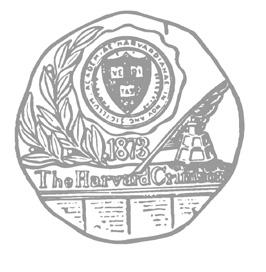

Associate Managing Editors
Leah J. Teichholtz ’24
Meimei Xu ’24
Editorial Chairs Eleanor V. Wikstrom 24
Christina M. Xiao ’24
Arts Chairs
Anya L. Henry ’24
Alisa S. Regassa ’24
NEXT WEEK 3
Friday 9/29
THE INAUGURATION OF CLAUDINE GAY Tercentenary Theatre, 10:15a.m.-4:00p.m.
The Harvard community will come together to inaugurate Claudine Gay as Harvard’s 30th president. The event will include an academic symposium to discuss the challenges and opportunities facing Harvard, the inauguration ceremony, and a celebration in the Old Yard.
Saturday 9/30
SURVEILLANCE: FROM VISION TO DATA Science Center, 11 a.m-4 p.m. Learn about the history and technology behind surveillance. Explore the types of devices that have been used to collect data in the past.
Sunday 10/1
RICE: A STORY OF AFRICA AND THE AMERICAS
Peabody Museum
Spend some time this weekend at this mini-exhibit to learn about how the cultivation of rice played into the legacy of the Americas. The exhibit explores how rice cultivation became a booming industry, the negative impact of the the Atlantic Slave Trade, and the culture of the Gullah Geechee.
Monday 10/2
FOOD SUSTAINABILITY AND CLIMATE CHANGE TALK
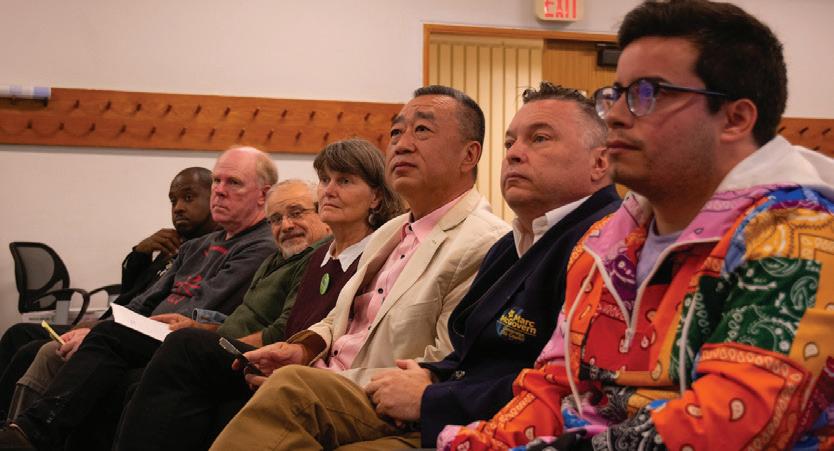
Knafel Center, 7 p.m.-8 p.m. Join Irene Shiang Li, co-founder and owner of Mei Mei Dumplings, to discuss the creation of a sustainable food system through business. The conversation will be moderated by WBUR correspondent Barbara Moran.
Tuesday 10/3
GRIEVING AND COPING TOGETHER
Smith Campus Center, 3:30 p.m.-4:30p.m. Join a supportive group for students to talk about a significant loss in their life. The group meets weekly and offers an opportunity to have a safe space on campus. This workshop is organized by Harvard University Health Services’ Counseling and Mental Health Service and is co-led by Tammy McLeod, the president of the Harvard Chaplains.
Wednesday 10/4
WHEN MISFORTUNE BECOMES INJUSTICE Law School Library, 1 p.m.-2 p.m.
Meet Alicia Ely Yamin, author of book When Misfortune Becomes Injustice: Evolving Human Rights Struggles for Health and Social Equality and hear from panelists from Boston University Law School and Harvard School of Public Health.
Thursday 10/5
DEEP DIVE INTO SHARK BIOLOGY AND BEHAVIOR
Harvard Museum of Natural History, 9 a.m.-5 p.m. Visit the Swimming with Sharks exhibit to explore the history, biology, and impact of sharks. The exhibit features pictures taken by wildlife photographer Keith Ellenbogen and preserved artifacts such as shark bones and teeth.
Friday 10/6
ALL THE WORLD IS HERE GALLERY Peabody Museum of Archaeology and Ethnology, 9 a.m.-5 p.m. Explore a exhibition featuring 600+ artifacts from Asia, Oceania, and the Americas — many of which are being displayed publicly for the first time. Visit the fourth floor to explore the origins and evolution of American anthropology.
Magazine Chairs Io Y. Gilman ’25 Amber H. Levis ’25
Blog Chairs Tina Chen ’24
Hana Rehman ’25
Sports Chairs Mairead B. Baker ’24
Aaron B. Schuchman ’25
Associate Business Manager Derek S. Chang ’24
STAFF FOR THIS ISSUE
Night Editors Isabella B. Cho ’24
Eric Yan ’24
Vivian Zhao ’24
Design Chairs Sophia Salamanca ’25
Sami E. Turner ’25
Multimedia Chairs Joey Huang ’24
Julian J. Giordano ’25
Technology Chairs Kevin Luo ’24
Justin Y. Ye ’24
Assistant Night Editors
Krishi Kishore ’25
Erika K. Chung ’26
Emily L. Ding ’26
Caroline K. Hsu ’26
Asher J. Montgomery ’26
Jasmine Palma ’26
Camilla Wu ’26
Story Editors Brandon L. Kingdollar ’24
Vivi. E Lu ’24
Leah J. Teichholtz ’24
Meimei Xu ’24
Eric Yan ’24
Design Editors Toby R. Ma ’24
Nayeli Cardozo ’25
Sami E.
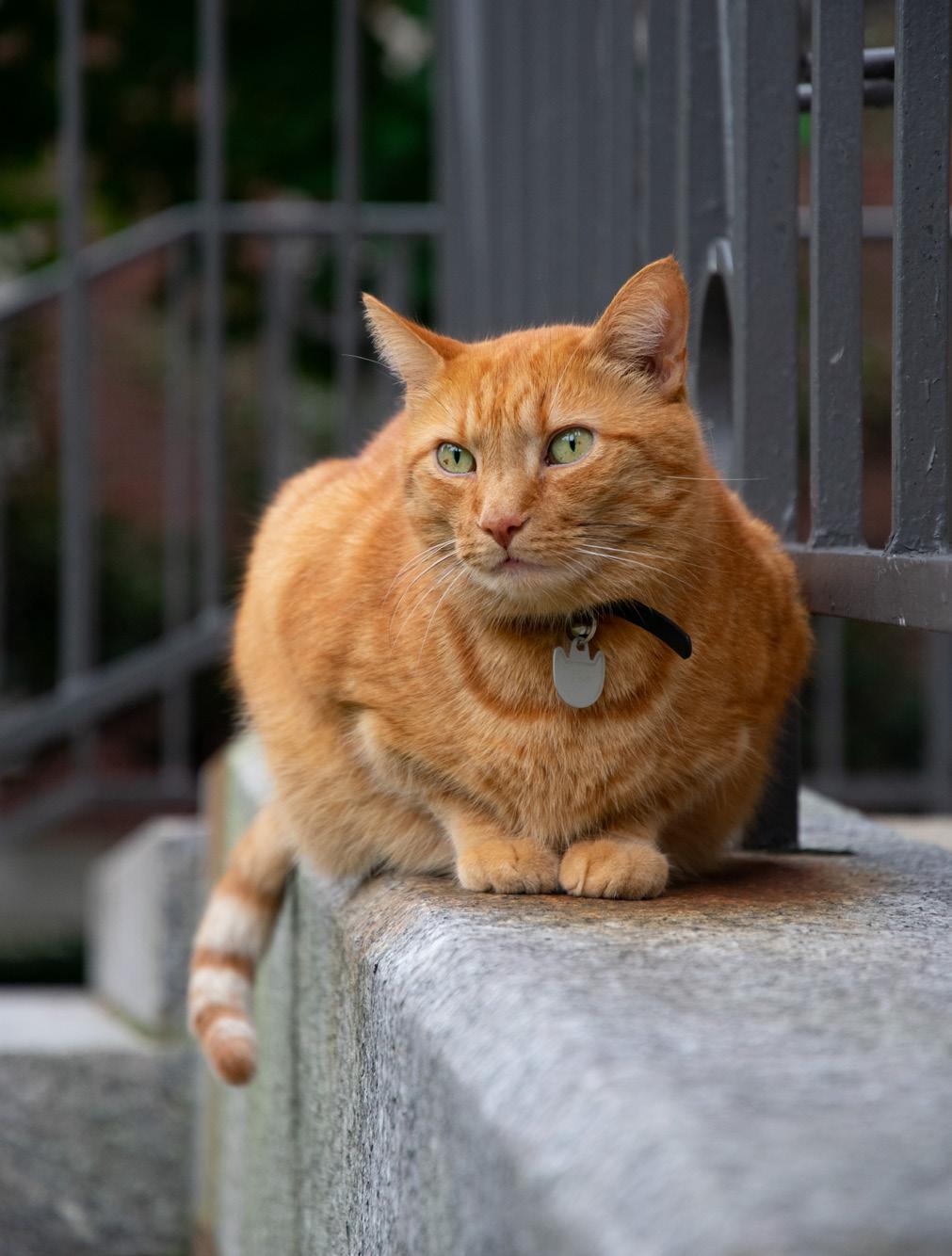
Turner ’25 Laurinne P. Eugenio ’26 Photo Editors Joey Huang ’24 Julian J. Giordano ’25 Addison Y. Liu ’25 Nathanael Tjandra ’26 Editorial Editors Jacob M. Miller ’25 Arts Editor Zachary J. Lech ’24 Sports Editors Mairead B. Baker ’24 Aaron B. Shuchman ’25 Copyright 2023, The Harvard Crimson (USPS 236-560). No articles, editorials, cartoons or any part thereof appearing in The Crimson may be reproduced in any form without the express written permission of the President. The Associated Press holds the right to reprint any materials published in The Crimson. The Crimson is a non-profit, independent corporation, founded in 1873 and incorporated in 1967. Second-class postage paid in Boston, Massachusetts. Published Monday through Friday except holidays and during vacations, three times weekly during reading and exam periods by The Harvard Crimson Inc., 14 Plympton St., Cambridge, Mass. 02138 CORRECTIONS Cara J. Chang ’24 President Brandon L. Kingdollar ’24 Managing Editor Cynthia V. Lu ’24 Business
The Harvard Crimson is committed to accuracy in its reporting. Factual errors are corrected promptly on this page. Readers with information about errors are asked to e-mail the managing editor at managingeditor@thecrimson.com. boba
every week with a preview of what’s on the agenda around Harvard University
Manager
What’s Next Start
OF THE EYE
APPLE
JULIAN J. GIORDANO — CRIMSON PHOTOGRAPHER
IN THE REAL WORLD
29, 2023
SEPTEMBER
THE HARVARD CRIMSON
JULIAN J. GIORDANO — CRIMSON PHOTOGRAPHER
College Suspends ‘Senior Gift’ Campaign
GIFT CHANGES. The Senior Gift campaign will be suspended, starting with the Class of 2024.
BY J. SELLERS HILL CRIMSON STAFF WRITER
Beginning this year, graduating seniors will not be asked to contribute to the Senior Gift fund, marking the end of a decades-long philanthropic campus tradition amid low student participation. Instead of soliciting contributions to the Senior Gift fund, the six Harvard College Fund marshals who sit on the 2024 Class Committee will work to educate classmates on the impact of the Harvard College Fund, according to official role descriptions released by the University.
The Harvard College Fund and the Senior Gift do not enter Harvard’s endowment and are spent more immediately on areas of student need including financial aid, house life, libraries, and athletics.
In previous years, the Harvard College Fund marshals were referred to as “Gift Marshals” and were responsible for convincing and reminding their peers to make contributions to the Senior

Gift fund, among their other roles on the Class Committee, a body responsible for organizing classwide events leading up to Commencement and post-graduation reunions.
According to a document obtained by The Crimson, as of May 22, 2023, three days before Commencement, only 167 seniors had contributed a Senior Gift — just 8.7 percent of the class of 2023.
This number includes donations from the 32 members of the
2023 Class Committee, who until this year were required to “make a Gift to the Harvard College Fund as part of Senior Gift,” in role descriptions. The role descriptions for the Class of 2024 make no mention of a donation.
The single-digit result caps off several decades of ups and downs for the Senior Gift, which garnered both praise and criticism from students. Though the University does not currently publish the Senior Gift participation
Black Students Form AFRO to Unite Activism Across Harvard
rate each year, the rate of donation spiked as high as 79 percent in the 1980s.
Over the years, however, concerns about students’ ability to give and the true impact of the campaign have plagued the program. In 2000, two students established an “Alternative Senior Gift,” which invited graduating students to give to charitable organizations.
In 2015, amid the backdrop of a multi-billion dollar capital
campaign, seniors at the College publicly lampooned a Senior Gift solicitation email with over 150 replies containing GIFs, one-liners, and rants questioning the value of donating to the world’s wealthiest institution of higher education.
Similar sentiments appear to have persisted in student interviews conducted by the Gift Marshals of the Class of 2023, according to a list of responses obtained by The Crimson.
“I’m pretty hostile to the idea of giving Harvard more money –I feel like we’ve spent a lot for not very much AND we’ve suffered from COVID and the university is yet to apologize,” one response reads.
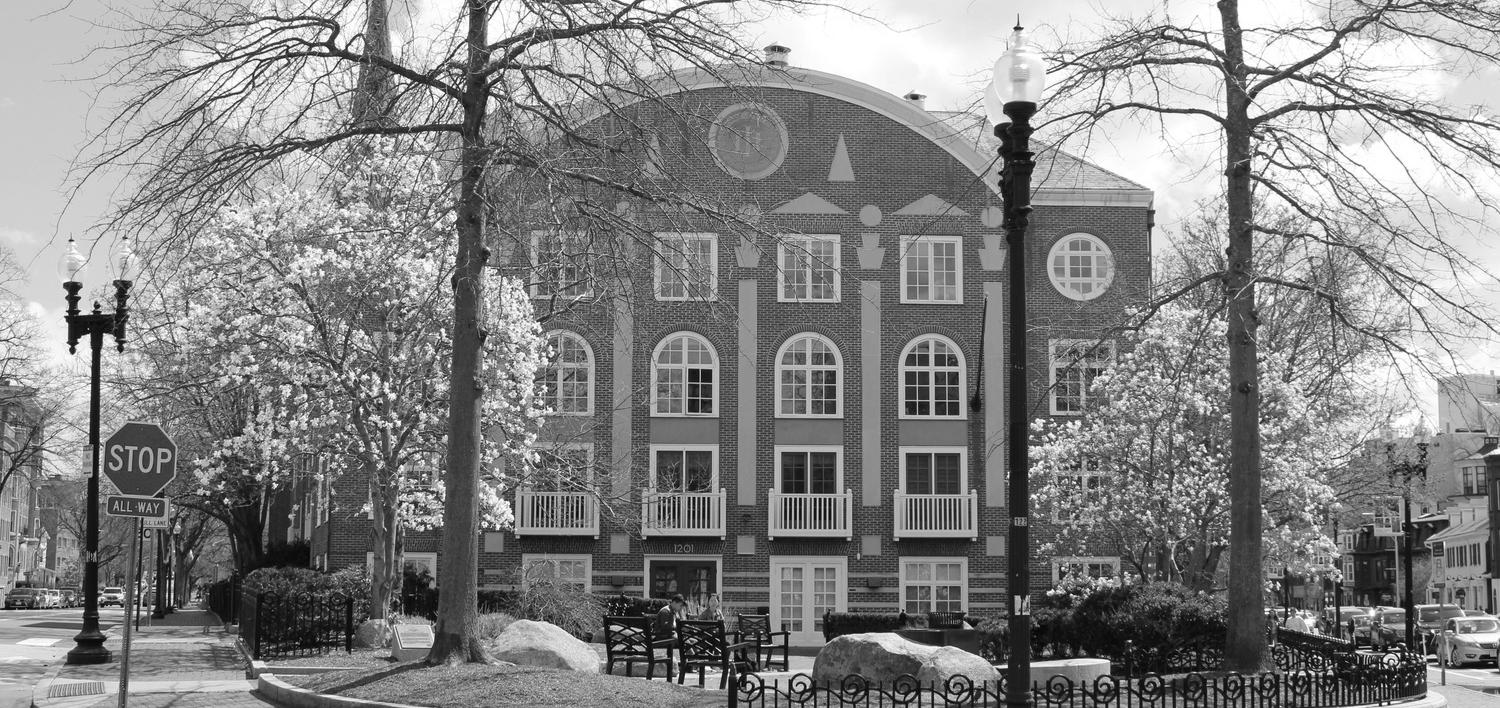
“It feels like [you’re] the lapdog of Harvard and you’re doing their dirty work of asking people for more money,” another entry reads.
College spokesperson Jonathan Palumbo declined to comment on the policy change and student feedback.
Programs like the Senior Gift are not typically intended to raise significant capital. In years where data has been public, the Senior Gift campaign has rarely, if ever, exceeded $100,000. Meanwhile, alumni contributions to the HCF have totaled millions.
Instead, the program has previously been touted as a way to build the habit of giving in the College’s youngest alumni or to boost the school’s alumni giving rate, a measure used by some to evaluate alumni satisfaction.
Last year, U.S. News & World Report announced that it would no longer consider alumni giving in its college ranking methodology.
sellers.hill@thecrimson.com
Vigil Held for Victims of Natural Disasters in Morocco, Libya
BY ALEX CHOU AND AYUMI NAGATOMI CRIMSON
Around two dozen Harvard affiliates gathered on the steps of Memorial Church Tuesday evening for a candlelight vigil to mourn the victims of natural disasters in Morocco and Libya that occurred earlier this month.
The Harvard Islamic Society and Society of Arab Students hosted the vigil to honor the victims of the recent 6.8 magnitude earthquake, which has killed more than 2,900 people in Morocco and injured more than 5,500 others, and severe flooding in Libya, which has killed more than 4,000 people, with 9,000 people still missing.
BY NIA L. ORAKWUE CRIMSON STAFF WRITER
A group of Black students at Harvard early this semester formed the African and African American Resistance Organization, a dedicated space for activism around issues relevant to Black students across the University.
Co-founders said the group — also known as AFRO — was created in response to the Supreme Court’s ruling against race-based affirmative action as well as a “swatting” last spring that saw four Black undergraduates ordered out of their bedrooms at gunpoint by campus police officers. Harvard’s subsequent response drew criticism from campus activists.
The group’s formation was also largely inspired by the Harvard-Radcliffe Association for African and Afro-American Students, a student group that contributed to the creation of the African and African American Studies Department in 1968 by publishing an advertisement in The Crimson with a set of demands for the administration.
Currently, the group has roughly 56 members, according to co-founder Clyve Lawrence ’25.
Kojo Acheampong ’26, one of the co-founders of the group, said he and the other founders noticed a lack of organization among Black students’ engagement with political issues.
“There was no real political space for people to actually do organizing work,” Acheampong said. “It became very evident with the swatting incident, especially, that this was such a needed space and something that could actually create the change on campus that we need to see.”
Both AFRO and the Harvard-Radcliffe Association for African and Afro-American Stu-
dents — which also called itself AFRO — self-identify as “militant” in that they do not “seek to engage with” administration and do not see the administration as a “method of change.”
Harvard spokesperson Jason
A. Newton declined to comment for this article.
The modern group is co-founded by Acheampong, Kiersten B. Hash ’25, Amari M. Butler ’25, and Crimson Editorial editors Prince A. Williams ’25 and Lawrence.
Lawrence said the group has three primary short-term goals.
First, the group aims to address concerns surrounding campus policing, including calling for the complete demilitarization of the Harvard University Police Department.
Second, the group plans to organize around changes to Harvard College’s admissions practices, including ending legacy preferences and encouraging a “more reparative view” of affirmative action geared toward benefitting Black applicants.
Finally, the group is calling for an increase in Black mental health professionals in Counseling and Mental Health Service, including reviewing the organization’s purpose on campus.
In the long term, Lawrence said the group wants to see a Harvard that is more “inclusive” for Black students.
“Not just more inclusive in the way that we typically think about it, but one that is actually working toward more liberatory ends — ones that address the needs of Black people more holistically, ones that Black people feel proud of, ones that Black people take ownership of and derive selfworth from,” Lawrence said.
AFRO held its second meeting of the semester on Sunday to discuss goals for the semester and bring together interested students.
Isaac Lagrandeur Brown ’27, who attended the meeting because he witnessed social change through organizing in his hometown of Miami, said he is interested in addressing concerns around HUPD.
“I want AFRO to talk about how [police] are part of a broader system of criminalizing poverty, and then sending the same people that are then criminalized for poverty to jail, and creating a vicious cycle of poor living conditions,” Brown said. “I want political education when it comes to that. I want demonstrations right outside of Smith.”
HUPD spokesperson Steven G. Catalano wrote in an emailed statement that the department “is committed to providing a safe and secure campus through quality policing and treats all persons with dignity and respect.”
The Dean of Students Office has paused official recognition for new clubs for the 2023-24 year, but Lawrence said AFRO has no interest in this designation.
“We do not believe that being a DSO-recognized organization will help our cause because we feel like we are inherently pushing the University for something that is outside the typical purview of a Harvard-recognized organization,” Lawrence said.
Acheampong said he believes the Harvard administration is “naturally” unlikely to produce change for Black students.
“We need to pressure administration. We need to demand of administration, we need to work against administration to get what we deserve on campus,” Acheampong said. “So, how are we a recognized group if that’s their ideology? If that’s their stance?”
“We believe our recognition comes from the students themselves,” Lawrence added.
nia.orakwue@thecrimson.com
Wasan M. Rafat ’27, whose extended family members have been affected by the disaster in Libya, said the catastrophe has left her feeling “heartbroken.”
“It’s hard to not let the guilt overwhelm me as I stand here today in Harvard Yard while my extended family is suffering,” Rafat said during the vigil.
Harvard Muslim Chaplain Khalil Abdur-Rashid, who read an excerpt from the Quran during the
ADMISSIONS FROM PAGE 1
vigil, said in his speech that when experiencing tragedies, “we should not feel hopeless and helpless.”
Despite the substantial impact of the disasters, SAS President Jana Amin ’25 said during an interview after the vigil that she hasn’t “heard anything” from the Harvard administration.
“We haven’t seen a lot of recognition about what’s been going on in Libya and Morocco around the College,” HIS Co-President Maryam S.K. Tourk ’25 said during an interview.
SAS has organized a fundraiser to support two grassroots organizations — El Baraka Angels Association and the Association Amis du CHU Mohammed VI — and has raised nearly $6,000 to support disaster relief in Morocco as of Sept. 26.
“We’re currently in discussions with a number of Libyan alumni and Harvard affiliates to figure out what the best organization to donate to is,” Amin said in an interview after the vigil. “But the fundraiser has already begun, and it’s continuing to raise money.”
The Sept. 8 earthquake, which struck in the Atlas mountains, roughly 50 miles southwest of the major tourist destination Marrakesh, caused tremors through-
out Morocco and as far as Spain and Portugal. Followed by a 4.9 magnitude aftershock, the earthquake left residents without electricity and cell phone service. According to the Associated Press, the earthquake has killed more than half of the population in some rural villages like Tafeghaghte.
On Sept. 11, rainfall from Storm Daniel caused the collapse of two already-fractured dams in the port city of Derna in Libya. The head of the U.N.’s World Meteorological Organization Petteri Taalas cites that a majority of casualties from the flooding could have been prevented with a functioning meteorological service.
“People don’t have food. People don’t have shelter anymore. People aren’t even really able to access their families and really understand what has happened to their families,” Amin said. Amin urged affiliates to “do as much as possible,” whether it be donating or raising awareness.
“Just checking in on the people around us that might be affected by these tragedies, I think is also really important,” Tourk said.
alex.chou@thecrimson.com ayumi.nagatomi@thecrimson.com
Alumni Interviewers Not to Consider Race and Ethnicity
evaluations that demonstrate how applicants’ racial identities have shaped their interests.
“Xavier’s most rewarding high school experiences have been his social justice work. He is the president of his school’s Black Student Union and has collaborated with his local NAACP chapter, youth council, and local elementary and middle schools,” one example states. “He shared that there is not a large African American nor Latinx community local to him, so he has found a lot of fulfillment growing this community, connecting with people with similar backgrounds, and making local change.”
The interviewer guidelines for the 2022-23 admissions cycle did not mention race and ethnicity and did not explicitly instruct alumni to exclude race from their evaluations.
In last year’s interviewer handbook, the admissions committee states that some students have the ability to suc -
ceed despite hardship in their lives, “whether financial or otherwise.”
“These qualities and experiences are valuable and can add depth and diversity to the undergraduate experience at large,” the handbook continues.
The Class of 2028 interviewer eligibility form for alumni also contains a provision that interviewers may not ask about a student’s racial background or ethnicity. In addition, the interviewer “may not consider that information in the interview process, including evaluation, making recommendations about, or assigning ratings to the students,” according to a screenshot of the form obtained by The Crimson.
A September email to Harvard Club of Washington, D.C., alumni encourages “veteran interviewers” to attend a training to familiarize themselves with the new admissions landscape.
“There is new guidance from Admissions in light of the Su -
preme Court decision on affirmative action, as well as a new interview report form,” the email reads.
Harvard spokesperson Jonathan Palumbo declined to comment on the changes to guidelines for alumni interviewers.
Last month, the College released significant changes to its application on the Common Application portal, eliminating the long-standing optional Harvard supplemental essay and replacing it with five required short-answer questions. The Common Application opened for students on Aug. 1.
The deadline for restrictive early action applications to the Class of 2028 is Nov. 1, marking the beginning of the first admissions cycle after the end of affirmative action. These applicants can expect to hear back by mid-December.
michelle.amponsah@thecrimson.com emma.haidar@thecrimson.com
COLLEGE
Inn. CHRISTOPHER HIDALGO — CRIMSON PHOTOGRAPHER
The African and African American Resistance Organization, a new group dedicated to activism around issues related to Black students, held its second meeting at the
NEWS 4 SEPTEMBER 29, 2023 THE HARVARD CRIMSON
STAFF WRITERS
The Class Committee will not solicit contributions to the Senior Gift fund from graduating seniors starting this year. MARINA QU — CRIMSON PHOTOGRAPHER
ADMISSIONS
Panelists Call for End of Legacy
LEGACY ADMISSIONS.
Panelists condemned legacy admissions at a Wednesday panel.
BY MICHELLE N. AMPONSAH AND EMMA H. HAIDAR CRIMSON STAFF WRITERS
Michael A. Kippins, a litigation fellow for Lawyers for Civil Rights who filed a complaint with the U.S. Department of Education over Harvard’s legacy preferences, argued for ending legacy admissions at a Wednesday panel.
Harvard Alumni Against Legacy hosted the event, which marked the new activism group’s official launch. Kippins and Viet A. Nguyen, the executive director of educational equity advocacy group EdMobilizer, discussed misconceptions about legacy admissions and ways universities can end the practice during the panel. The discussion, hosted at Harvard Divinity School, was moderated by Harvard Graduate School of Education student Jordan A. Weatherl.
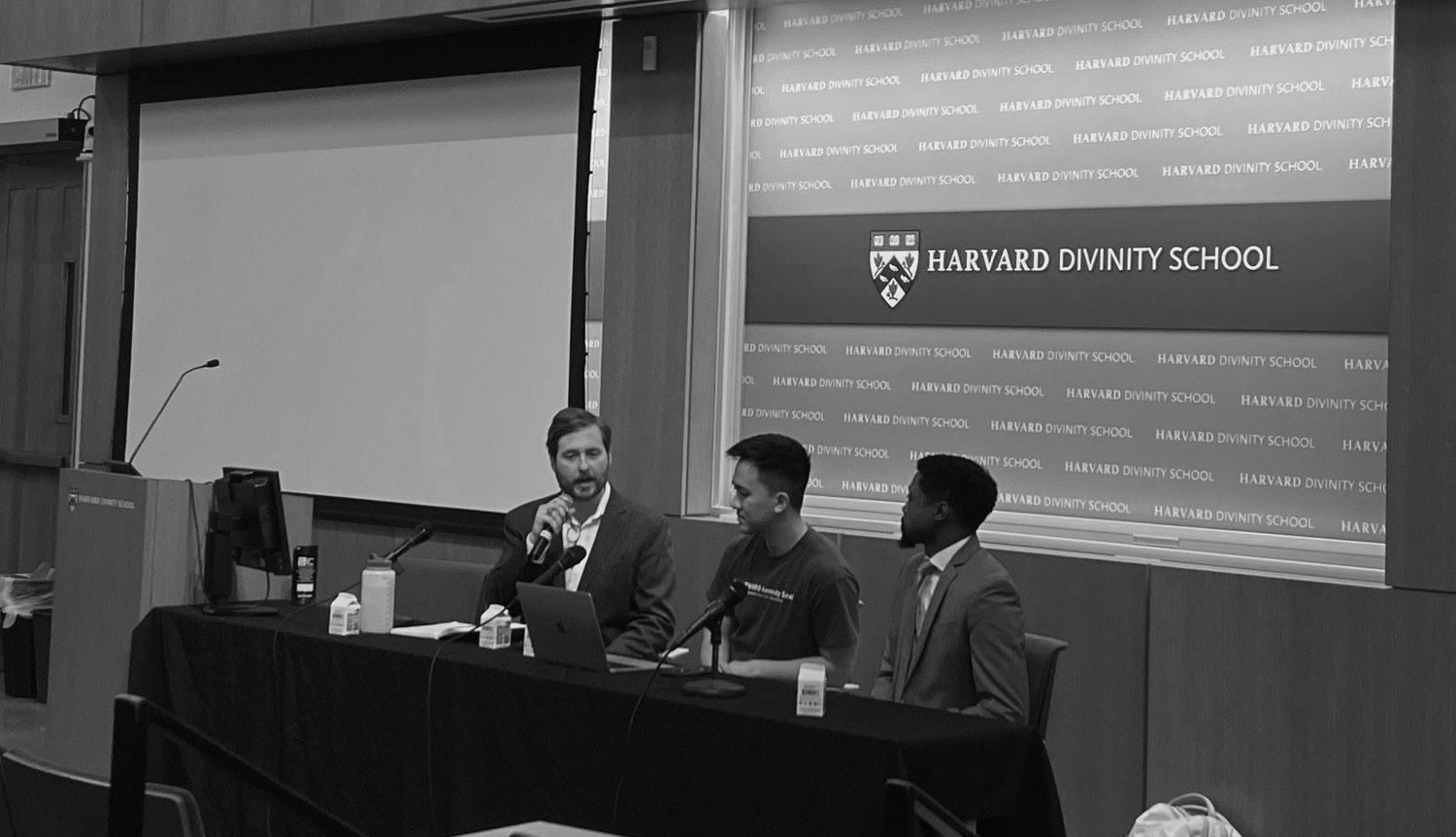
Just five days after the Supreme Court ruled to overturn race-based affirmative action in higher education, Lawyers for Civil Rights filed a complaint with the Department of Education Office for Civil Rights, alleging that Harvard’s use of legacy and donor preferences in admissions violates Title VI of the Civil Rights Act of 1964.
The complaint, filed on behalf of three Black and Latinx groups,
requested the Department of Education investigate Harvard’s admissions process. The Ed Department opened a civil rights investigation into Harvard’s use of legacy and donor preferences in July.
During the panel, Kippins said he believes legacy admissions create a “self-fulfilling prophecy,” where the country’s highest earners are disproportionately likely to gain admissions to top schools and maintain their status.
“Twelve universities or colleges are producing the top 1 percent of people who are earners, for example, or who run businesses or run for office, or who just in general control money and power,” Kippins said. “And this is one way of ensuring that that
power stays put.”
Kippins also argued that eliminating legacy preferences does not have a meaningful impact on alumni donations, contrary to popular belief.
“There are certainly studies out there that say, particularly to this myth, that the top 100 schools have been analyzed and changes to legacy admissions have been shown to have little to no effect on what the donations look like,” Kippins said.
Nguyen said EdMobilizer’s research found that legacy admissions were a major factor “creating economic inequality within higher education” and preventing first-generation students from applying.
“Legacy preferences just kept
coming up over and over again. And for us, it was so blatantly clear that this was a classist and racist policy,” Nguyen said.
In response to criticisms of the University’s admissions practices, Harvard spokesperson Jonathan Palumbo pointed to a statement the University released following the Ed Department’s announcement that it would investigate the complaint brought by Lawyers for Civil Rights.
“We are in the process of reviewing aspects of our admissions policies to assure compliance with the law and to carry forward Harvard’s long standing commitment to welcoming students of extraordinary talent and promise who come from a wide range of backgrounds, perspec-
Eliot Deans to Step Down
BY J. SELLERS HILL AND JOHN N. PEÑA CRIMSON STAFF WRITERS
tives, and life experiences,” the July statement reads.
Still, Nguyen said it can be challenging to engage alumni in advocacy work because they have both “the biggest incentive to save” legacy preferences and “the most sway within the institution.”
“Because of Operation Varsity Blues, because of the scandals, because of the affirmative action case — more and more folks are coming out,” Nguyen said. “I think everyone’s realizing that the racial and economic disparities in America have gotten so much worse, so people can’t stay silent anymore.”
When asked whether eliminating legacy admissions could also cause people to rally against the consideration of first-generation status in admissions processes, Nguyen said that the topic “hasn’t come up before.”
“Even when I talk to admissions offices now, one of the proxies to account for race — it has been first-generation status,” Nguyen said. “And I think the reason for that is class tends to be less divisive in the U.S. than race.”
In an interview following the panel, Kippins said he is unsure how long the issue of legacy admissions might be contested legally, describing it as “something that can’t really be pinned down.”
“The investigation needs to be thorough and the Department of Education needs to interview the right people — analyze the right data,” he added.
michelle.amponsah@thecrimson.com emma.haidar@thecrimson.com
Warren Wants to Teach Students to ‘Lead Politically’
BY THOMAS J. METE CRIMSON STAFF WRITER
Harvard Institute of Politics
Di-
rector Setti D. Warren, who is entering his first full semester in the role, said in an interview on Friday that he aims to bolster the political training undergraduates receive from the IOP during his term.
Warren, a former politician who served as mayor of Newton, Massachusetts, said he remains “100 percent dedicated” to the original intent of the IOP — to inspire undergraduates to engage with public service and politics — but said the current “crisis of confidence” in American institutions has turned his focus to preparing students to become political leaders.
“What’s really important to me is that we get our students ready to lead politically in this really challenging polarizing environment,” Warren said during the interview, his first with The Crimson as IOP director.
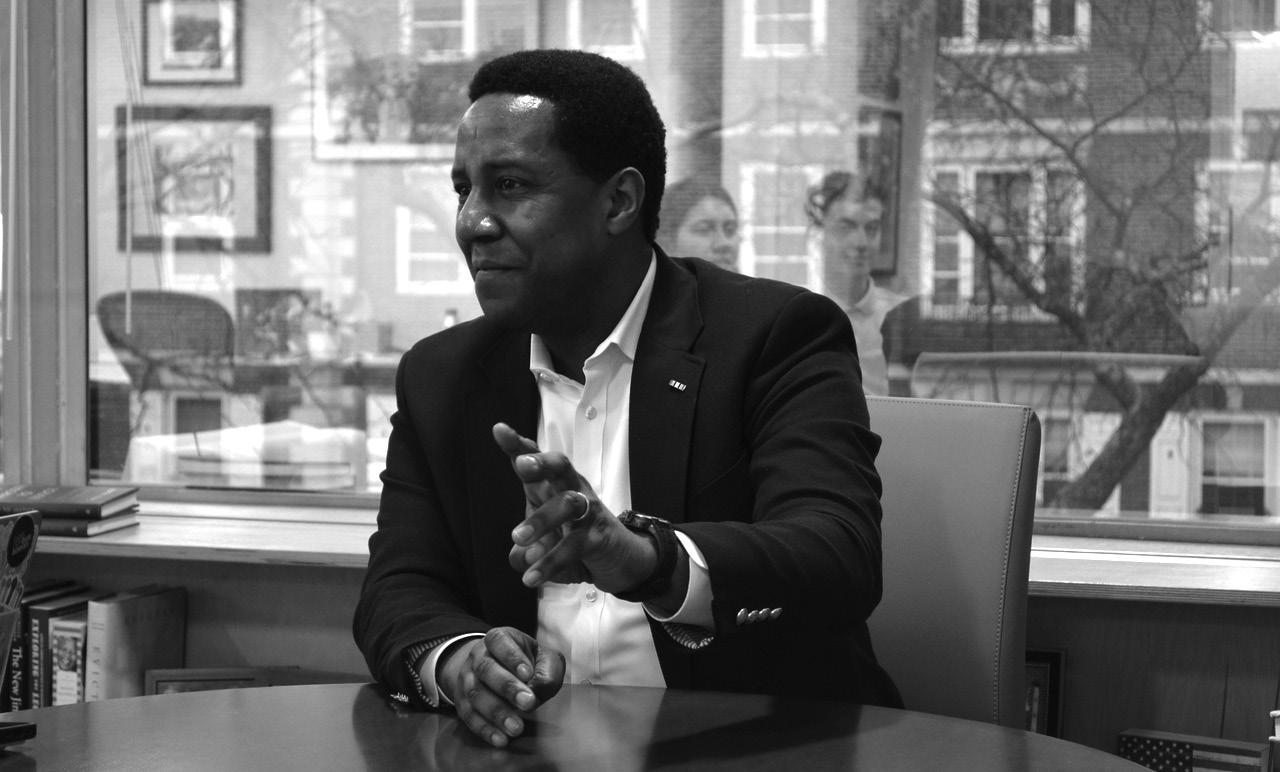
“If we want to get our young people ready to lead they have to be able to have dialogue and understand perspectives. And then lead all people,” he added.
Throughout this year, Warren
LABOR FROM PAGE 1
said, the IOP will focus on three points that will help mold students into better political leaders: understanding those with different backgrounds, fostering the ability to agree to disagree, and getting students outside of the Harvard bubble.
“As our students look at being in public life — being possibly elected officials — these are skill sets that they have to work on,” Warren said. “I know because I ran for office and I was in office.”
With programming already underway for the semester, the IOP has begun building on Warren’s ambitions. The IOP held a JFK Jr. Forum earlier this month on a “Disagree Better” campaign and is planning student trips to New Hampshire and New Bedford, Massachusetts.
This semester also marks the IOP’s first with Morgan S. Brown ’06 as executive director. Brown, who was appointed to the role this August, is returning to the IOP for the first time since his student days at the College.
“It’s a wonderful, wonderful place to be and I’m just really honored to be back and working with everyone here to keep that going,” Brown said.
Brown said while “the dayto-day issues have certain-
ly changed” since his time at the College, the IOP still fosters meaningful and relevant conversations among the student body.
“I’ve changed — more gray hair than I did the first time I came through — but I think the energy in the hallways, the things that really attracted me to the IOP as an undergrad, those are really consistent and stayed the same,”
Brown said.
During the interview, Warren also discussed the IOP’s planned approach to the 2024 elections, emphasizing the importance of bringing America’s political diversity to Harvard, which is ideologically to the left of the broader electorate.
“This is the United States of America in 2024. There are peo -
NLRB Alleges Retaliation Against Guard
article, citing the advice of his legal counsel.
Arun K. Malik, Terzano’s union steward, said Terzano’s transfer was intentional. Securitas moved Terzano from his original position at the Cronkhite Center, which houses Harvard’s admissions office, to a Harvard Art Museums storage facility in Somerville.
“He would be completely isolated from contact with all other guards so he would no longer be able to engage in union activities,” Malik said of the Somerville location.
“It was a dirty trick to discourage protest in support of higher wages and better working conditions, and his removal created a chilling effect in that others became fearful after witnessing what happened to him in broad daylight,” 32BJ shop steward Mi-
chael A. Nowiszewski wrote in a statement.
According to Malik, Terzano’s ban from campus was lifted four days after the contract was ratified.
“Moving Walter so abruptly did have a chilling effect on the ability to get more people interested in picketing,” Malik said.
Such physical restriction prevented him from participating in any on-campus union activities in the month leading up to the successful ratification vote.
The March vote was particularly important because an earlier version of the contract had failed in January, and both Harvard and the union were under greater pressure to successfully ratify a contract and conclude negotiations. Malik said the January vote was the first time guards had voted down a contract in Harvard’s history.
Terzano later led an effort to decertify 32BJ last April, alleging it had not properly represented union guards during the 2022 contract negotiations. The NLRB denied the petition that month.
Frank Soults, a 32BJ SEIU spokesperson, and Roxana L. Rivera, assistant to the 32BJ president, did not respond to a request for comment.
Multiple Harvard guards said Terzano’s case could represent a significant turning point in their standing with the University as contracted workers, pointing to the fact that the complaint alleges that Securitas suspended Terzano after Harvard complained to the contractor.
“The fact that they were able to get the contractor — Securitas — to retaliate against Walter proves that Harvard is a co-employer of the guards,” Malik said.
“This makes it a nationally significant story because if the NLRB can nail Harvard on this, then that means that all the universities that have outsourced their security guard services nationwide could be ordered to treat them as co-employers.”
“It would be the start of the avalanche of going after every corporation in America,” he added.
The NLRB General Counsel requested an order requiring Securitas and Harvard to rehire Terzano, offer him his former position, reimburse him for lost wages, and send him a written apology “for any hardship or distress caused.”
“Harvard should make it right, or at least Harvard should make Securitas make it right,” Nowiszewski said.
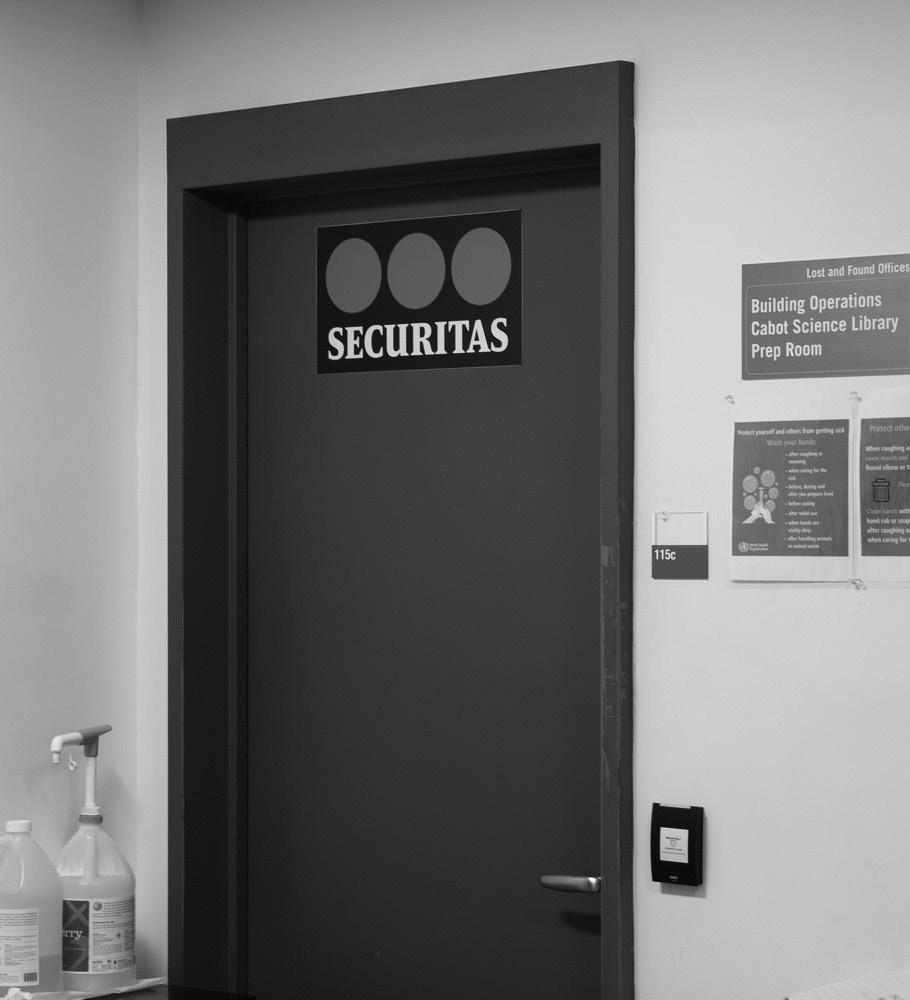
cam.kettles@thecrimson.com
Kevin J. Madigan and Stephanie A. Paulsell will step down from their role as Eliot House faculty deans at the end of the 2023-24 academic year, citing an illness in their family in a Monday morning email announcement to House residents.
Madigan, a professor of ecclesiastical history, and Paulsell, a professor of the practice of Christian studies, will remain on the faculty of the Harvard Divinity School.
“This was a difficult decision for us because we love this house, the staff with whom we are privileged to work, and all of you. Being your Faculty Deans has been one of the great experiences of our lives,” the pair wrote in the email.
“Even with all the challenges of the last few years, we wouldn’t have wanted to miss a single minute of our life in this extraordinary community,” they added.
Dean of the College Rakesh Khurana appointed Madigan and Paulsell as faculty deans in June 2020 to lead the House at a time when the Covid-19 pandemic forced students off campus.
In a separate email to House affiliates, Khurana praised the deans’ leadership of Eliot.
“Stephanie and Kevin have been extraordinary leaders and ideal colleagues, and it is clear how much they care for each of you,” he wrote. “I will miss them dearly as Faculty Deans, as I am sure you will, but I am reassured that they will remain treasured community members.”
Eliot House Committee CoChair Delaney C. Jones ’24 said she was “shocked” when she read about the deans’ plans to step down, adding that their departure is a “big loss” for the House.
“They open their homes so often, and they constantly want to get to know students not just on an academic level, but a personal level,” Jones said.
Jon D. May ’25 credits Madigan and Paulsell for their role in creating a “unique culture” in Eliot.
“You could always count on them to be at events, to be in the dining hall meeting with students,” May said. “They were just very, very involved.”
In the coming weeks, the search process for the House’s next deans will begin, during which Khurana will solicit nominations from students, gauge interest from tenured faculty, and assemble a search committee to inform his final selection.
In their email, Madigan and Paulsell explained they had made their announcement early in order to kick off the search process this fall, in hopes of an announcement by January.
ple that have many different views about the election. What happened in 2020? What happened in 2016? What should happen moving forward?” Warren said.
“We have to make sure that we represent politics in America in 2024,” he added.
thomas.mete@thecrimson.com
“Dean Khurana hopes to appoint new FDs before the spring semester so that you can begin to get to know them and they can begin to experience this vibrant, caring community for themselves before they start their term in July,” Madigan and Paulsell wrote. May said he’s hopeful the committee can find “someone to fill their shoes.”
“But that’ll be a difficult job,” he added.
sellers.hill@thecrimson.com john.pena@thecrimson.com
NEWS 5 SEPTEMBER 29, 2023 THE HARVARD CRIMSON
From left to right: HGSE student Jordan A. Weatherl, EdMobilizer executive director Viet A. Nguyen, and litigation fellow Michael A. Kippins. EMMA H. HAIDAR — CRIMSON PHOTOGRAPHER
Setti D. Warren, pictured at a February interview, is starting his first full semester as the director of the Harvard Institute of Politics. CLAIRE YUAN — CRIMSON PHOTOGRAPHER
Harvard contracts nearly 300 guards through Securitas, a security company based in Stockholm, Sweden. PEI CHAO ZHUO — CRIMSON PHOTOGRAPHER
BY RAHEM D. HAMID AND ELIAS J. SCHISGALL CRIMSON STAFF WRITERS
Proposal to Restructure Humanities Falls Flat
to its chair, Arts and Humanities Dean Robin E. Kelsey.
Nonetheless, the document, which has not been previously reported, signals a fresh direction for the Arts and Humanities division, whose structure has been left largely unchanged even as concerns over the health of the humanities — at Harvard and throughout higher education — have grown.
Anew chapter may be coming to humanities education at Harvard.
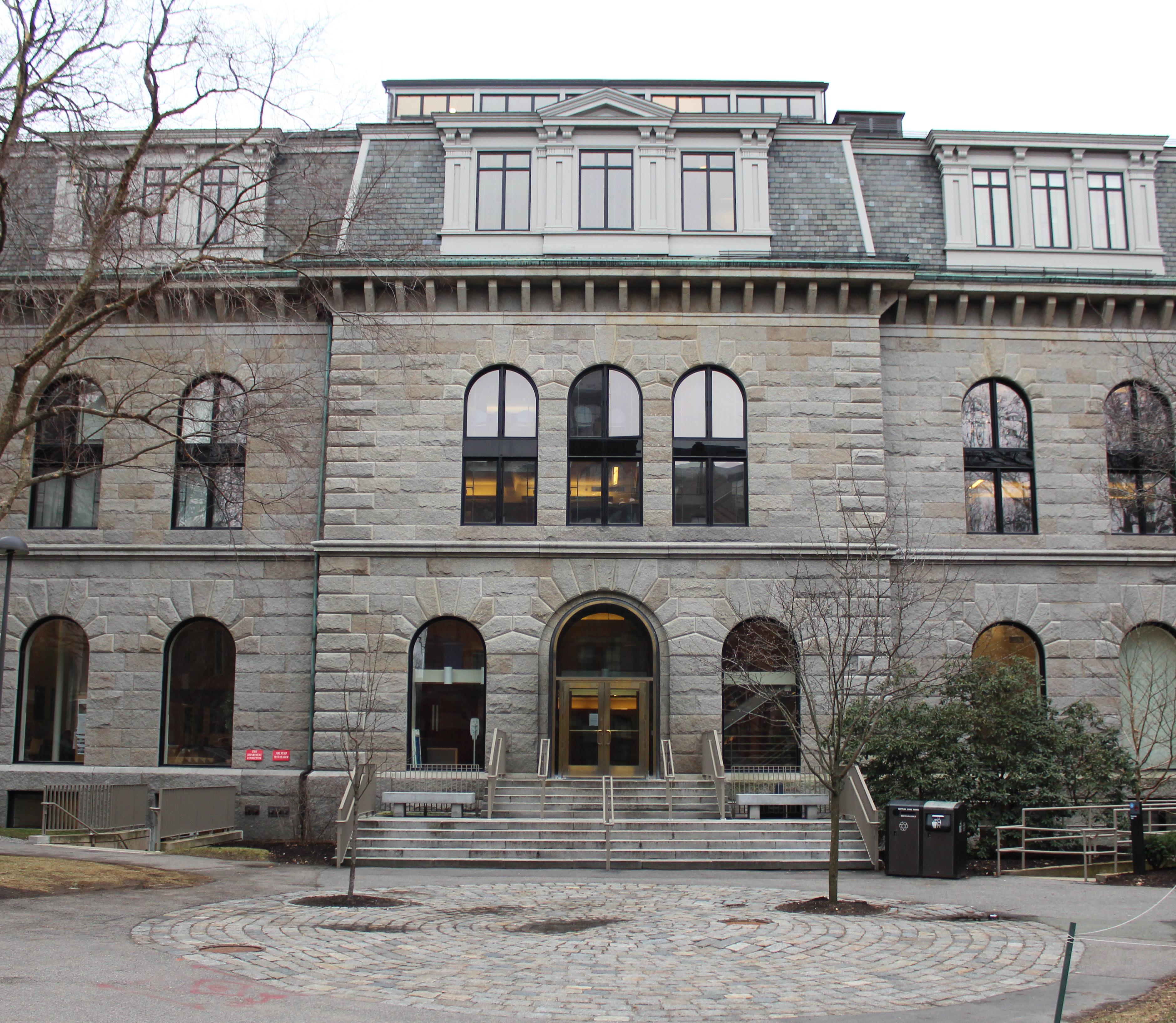
A committee within the Arts and Humanities division has proposed a range of potential substantial changes, including the introduction of a concentration in Ethnicity, Indigeneity, Migration and the consolidation of three language concentrations and one secondary field into a new concentration, according to an internal document obtained by The Crimson.
The document, which was circulated among divisional faculty last spring, is part of the Faculty of Arts and Sciences’ three-year strategic planning process, which aims to examine the resources needed to improve education, financial stability, and faculty support.
In response to feedback from the faculty, however, the divisional strategic planning committee is unlikely to move forward with the language consolidation proposal, according to a member of the committee who was granted anonymity to discuss the committee’s private deliberations.
That proposal would create a new concentration, termed “Languages, Literatures, and Cultures, which consolidate concentrations in Germanic Languages and Literatures, Romance Languages and Literatures, and Slavic Languages and Literatures as well as the secondary in Celtic Languages and Literatures.
The proposed LLC concentration has drawn significant backlash from faculty within the affected departments, who claim it would unfairly target small departments.
The document is provisional, and the Arts and Humanities strategic planning committee is “still very much in the midst of the planning process,” according
“Our planning process has been motivated by a sense that interests of students and scholars no longer align as well as they once did with our curricular structure,” Kelsey said in an interview. “Our primary aim is to open up new pathways for both faculty and students in the curriculum.”
The specifics of these “new pathways,” however, remain a source of deep uncertainty — and, in the case of the language proposal, fervent contention — within the division, as the strate -
gic planning committee enters its final year.
The Rise and Fall of ‘Languages, Literatures, and Cultures’
The committee’s document proposes new courses of study for undergraduates in the division, focused largely on interdisciplinary fields of research. They include the expansion of the Ethnicity, Migration, Rights secondary into a full concentration, dubbed “Ethnicity, Indigeneity, Migration,” which comes amid sustained calls for a degree-granting ethnic studies department at Harvard.
It also proposes a new secondary field in “Integrated Humanities,” which includes tracks in “Medical Humanities,” “Civic and Legal Humanities,” and “Environment and Design.”
But the creation of LLC, one
of the document’s most major — and most contested — proposals, may have already been scrapped.
According to the document, the LLC concentration would merge “the concentration of our ‘Language and Literature’ departments.” It would not include concentrations like East Asian Literatures and Civilizations or Near Eastern Languages and Civilizations, which “encompass an even wider scope of historical matters, including governance and politics.”
The new concentration would include internal tracks and joint concentrations, allow for the study of languages outside existing departments, and serve as “a stronger platform from which to promote language study,” the document states.
But four faculty from across the affected departments told The Crimson they felt the proposal targeted their concentrations
for having low numbers of undergraduate concentrators and appeared to be a stepping stone to consolidating the departments themselves.
The faculty said there was no compelling intellectual justification for the selection of concentrations included in LLC, which excludes similar concentrations in English and Comparative Literature. The Crimson granted anonymity to these faculty members to speak candidly about a controversial internal matter without fear of retaliation from administrators.
The faculty also said the strategic planning process has been opaque and insufficiently open to faculty input. Some said they believed the LLC proposal was moving forward but did not know for certain because of sparse communication from Kelsey and the committee.
Kelsey again presented the
proposal at a faculty retreat held in late August at the Science and Engineering Complex in Allston, which several faculty members said they took as an indication that the committee was moving forward with the proposal.
But a member of the committee said the LLC proposal was unlikely to move forward due to feedback from within the division.
In the interview, Kelsey said he presented the LLC proposal at the retreat “with hesitation,” due to the evolving nature of the committee’s discussions.
During several “lively” discussions with faculty in the spring, Kelsey said, “there was definitely more resistance from some quarters to the LLC concentration.”
“The strategic planning committee is now considering some other possible recommendations based on what we have learned,” Kelsey added. “So that’s the state of play.”
In a follow-up email, Kelsey defended the intellectual basis of the LLC concentration, writing that the four constituent fields were “united by the commonality of their declared aspiration: the study of language and literature.” He said the English concentration focuses more on creative writing, and that there were “arguments for or against including Comparative Literature, which distinguishes itself by virtue of methodology.”
Kelsey also wrote he has been “communicating on a regular basis” with divisional faculty and that the committee has conducted “extensive outreach,” adding that it would be “absurd” to share a “blow-by-blow account” of every committee meeting. He reiterated that the strategic planning committee “welcomes proposals from FAS colleagues.”
Missed Opportunities
The committee’s proposal comes as the humanities face declining interest, both at Harvard and nationwide. Over the past 10 years, fewer and fewer students at Harvard are concentrating in the Arts and Humanities division as School of Engineering and Applied Sciences concentrations rise
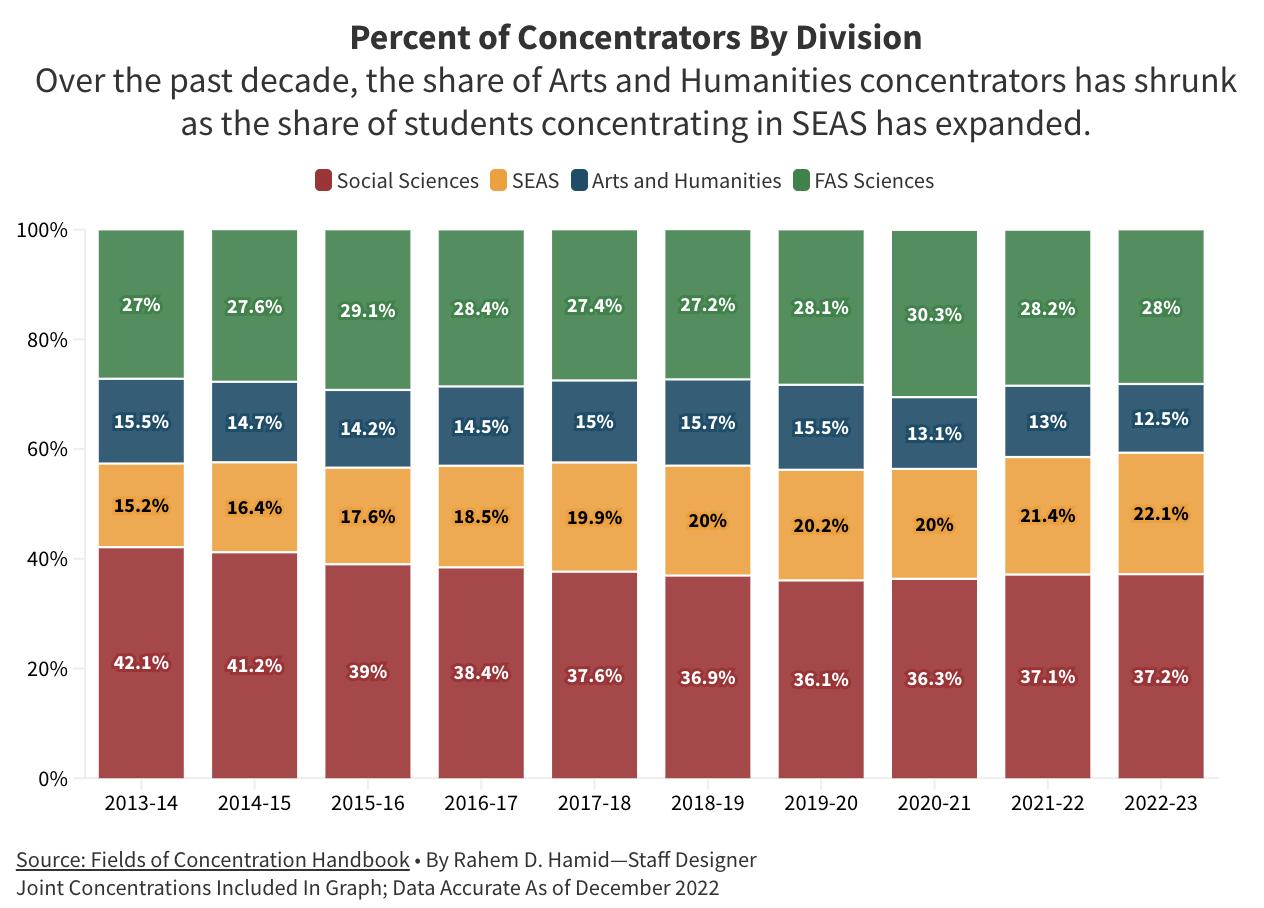
SEPTEMBER 29, 2023 THE HARVARD CRIMSON
COVER STORY 6
HUMANITIES. An internal document suggests new directions for Harvard’s humanities — pathways that highly contentious.
AIYANA G. WHITE — CRIMSON PHOTOGRAPHER
in popularity. Across the country, some small and underfunded universities are slashing humanities departments entirely.
David M. Stern, a professor of Comparative Literature, said the decline of the humanities — which he called “a very serious loss to American culture” — demonstrated “a real tendency towards professionalization that is certainly very anti-intellectualism.”

He also pointed out that undergraduate concentrations in the humanities are still seen as preparation for future graduate studies in that field and, ultimately, a position in academia — a conception he said ought to be abandoned as careers in academia become increasingly unattainable.
A report released by the Graduate School of Arts and Sciences last week — also as part of the strategic planning process — highlighted the need for FAS graduate programs to be realistic with their students about an academic job market that has grown significantly more competitive.
Wesley M. Jacobsen, the director of the Japanese Language Program and a professor of the practice of Japanese Language, attributed the drop in interest in the humanities to the false perception that the job market outside of academia has soured for graduates from these fields.
“In fact, the kinds of skills that you’ve gained, perspectives that you obtain, are going to apply to any kind of career that you even-
address a growing sense among certain faculty leaders that we are missing out on opportunities to draw more students and emerging scholars into our pursuits, and that more could be done to ensure that the arts and humanities thrive at Harvard and beyond in the decades ahead,” the document states. For some faculty, however, the focus on working within the Arts and Humanities division may hinder the strategic planning committee’s ability to truly facilitate interdisciplinary academics.
Gojko J. Barjamovic, a lecturer in Near Eastern Languages and Civilizations, said proposals to restructure the humanities should focus on the “really interesting new stuff” taking place on the borders between the humanities and the sciences or social sciences.
“If you were to say, ‘Okay, we need to restructure because we need to accommodate change,’ why would you then limit that to the humanities?” Barjamovic said. “If you were to go through with that argument, in my view, you would have to say, ‘Okay, but then we also have to include all the other disciplines.’”
Derek Miller, a professor in the English department, said he wished the whole divisional strategic planning process “had been far more bold.”
“My instincts personally were that we would be better off starting with something that was big and broad and reaching as wide as possible, rather than keeping
“reasonable concern” that he has discussed with FAS Dean Hopi Hoekstra and the committee.
“Ultimately, I would like to see a combination of finding new ways to support cross FAS curricular initiatives and of hosting concentrations or secondary fields within the Arts & Humanities that accept courses in other Divisions and in SEAS,” he wrote.
Seth Robertson, a lecturer in the Philosophy Department, said while he is concerned about de -
sion, Kelsey said, is based on an antiquated organizational structure — one he said will need to adapt to the changing nature of the humanities.
“The department structure in the FAS was largely set in place between 1890 and 1969, and the world has changed a lot since then,” Kelsey said. “Environmental threats to planetary well-being, historical reckoning with social justice, the emergence of the digital era, the uncertain future
Environmental threats to planetary wellbeing, historical reckoning with social justice, the emergence of the digital era, the uncertain future of democracy — it just strikes many of us that it’s time to rethink how we organize what we do.
clining interest, he still feels “optimism about the humanities.”
“There’s so much fascinating, important work going on now,” he said. “It just expands what we’re doing, what we’re talking about, who we’re talking to, who we’re reading, who we’re listening to, and who our ideas are helping.”
‘Metamorphosis’
The Arts and Humanities divi-
CURRENT
tually enter,” he said.
Still, Kelsey said the strategic planning process was not launched “out of some panicked response to numbers,” but to facilitate new, interdisciplinary courses of study within the humanities. Kelsey’s sentiment mirrors that of the document’s introduction, which says that the committee’s work “has not been a reaction to a perceived crisis in the arts and humanities at Harvard.”
“Rather, it has been a way to
our questions within the division,” he said.
“I think this institution has the reputation and resources to afford to take greater risks in how we do things,” he added. “And then if we fail, we can go back to doing things the old way or try another model.”
In his emailed statement, Kelsey acknowledged the criticism that a true strategic planning initiative for the Arts and Humanities should extend beyond the division itself, calling it a
of democracy — it just strikes many of us that it’s time to rethink how we organize what we do.”
Similarly, the planning document argues that for decades, the University has “shoehorned efforts to move into new areas of inquiry” into old infrastructure or “relegated them to standing committees reliant on fewer resources and volunteered ladder-faculty time.”
“Today, we need to become
adept at metamorphosis and not simply accretion,” the document reads.
The document’s final section, itself titled “Further Metamorphosis,” proposes a “one-semester intensive review” every five years to consider additional changes to the divisional structure, including the possibility of changing departments, adding concentrations, and “combining/sunsetting existing concentrations.”
Several of the faculty members whose concentrations would have been rolled into LLC said they felt it could be the start of a slippery slope to more radical changes, including eliminating their small departments altogether. While restructuring small departments is a “possibility,” Kelsey said, he would not “come very quickly to that conclusion,” citing the ongoing deliberations of the committee.
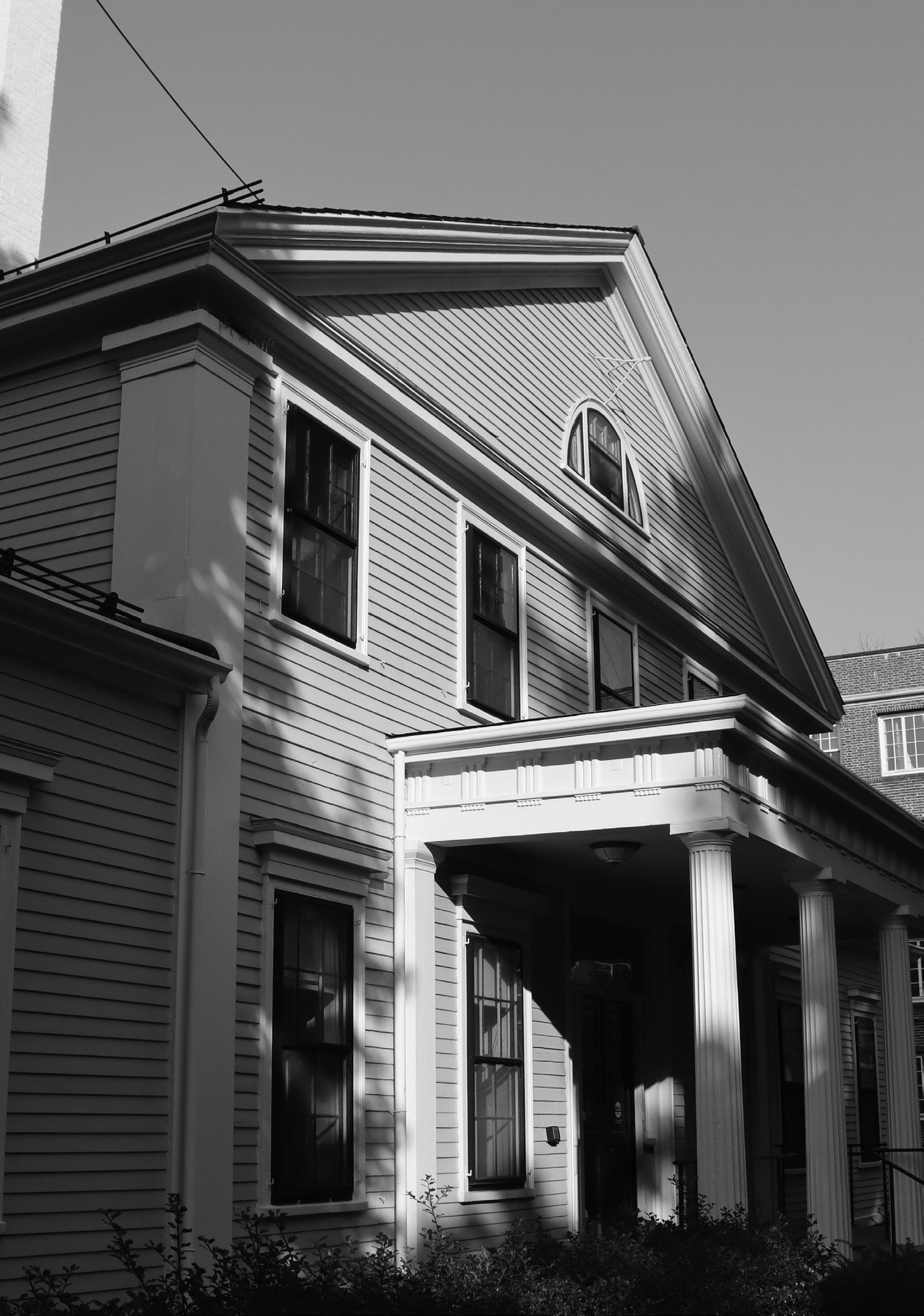
“It’s a wonderful thing to have small programs that are meeting the needs of students who are devoted to them, but we do have to keep our eye on the student body as a whole and making sure that we are delivering the experience of the arts and humanities that will best prepare our students as they go forth into the world,” he said.
Kelsey added that a preponderance of small departments and programs poses administrative burdens of its own. For instance, departments need to ensure compliance with governmental regulations, maintain digital presence, and administer
their own programs.
Kelsey announced the approval of new administrative personnel in an email to Arts and Humanities affiliates last week as one of the first substantive changes resulting from the strategic planning process — a move he said was met with “widespread enthusiasm.”
Though the LLC proposal is not likely to move forward, some faculty say that some form of restructuring will be required.
“There has to be the flexibility in there to allow research to flourish and education to flourish, and in new fields that do not fit the traditional structures,” said Jacobsen, the Japanese Language Program director.
Kelsey acknowledged that potential restructuring will make some faculty anxious or frustrated about the status of their department, but he described this as an unavoidable aspect of implementing necessary changes.
“Anytime you pursue institutional change, people are going to be anxious about the uncertainty. There is no way to eliminate that anxiety, as much as one can regret its occurrence,” Kelsey said. “I’m confident that when all is said and done, we will have recommendations that will represent an effort to listen intently to the entire community.”
“Does that mean everyone’s going to agree with the recommendations? Absolutely not. But that’s the nature of the process,” he added.
COVER STORY 7 SEPTEMBER 29, 2023 THE
HARVARD CRIMSON
Derek Miller English professor
I think this institution has the reputation and resources to afford to take greater risks in how we do things. And then if we fail, we can go back to doing things the old way or try another model.
Robin E. Kelsey Dean of Arts and Humanities
Slavic Languages and Literatures is one of the four programs that would be consolidated under the Languages, Literatures, and Cultures concentration proposal. MARINA QU — CRIMSON PHOTOGRAPHER rahem.hamid@thecrimson.com elias.schisgall@thecrimson.com
The Warren House is home to Celtic Languages and Literatures, one of the programs that would be consolidated under Languages, Literatures, and Cultures. SOPHIA C. SCOTT — CRIMSON PHOTOGRAPHER
HUMANITIES
OF STUDY
ARTS &
FIELDS
HUMANITIES
OF STUDY Art, Film, and Visual Studies Classics Comparative Literatures East Asian Studies English Folklore and Mythology Germanic Languages and Literatures History of Art and Architecture History and Literature Linguistics Music Near Eastern Languages and Civilizations Philosophy Comparative Study of Religion Romance Languages and Literatures Slavic Languages and Literatures South Asian Studies Theater, Dance and Media Art, Film, and Visual Studies Classics Comparative Literatures East Asian Studies English Ethnicity, Indigeneity, Migration Folklore and Mythology History of Art and Architecture History and Literature Languages, Literatures, Cultures Linguistics Music Near Eastern Languages and Civilizations Philosophy Comparative Study of Religion South Asian Studies Theater, Dance and Media Celtic Languages and Literatures Ethnicity, Migration, Rights Medieval Studies Ancient Studies Integrated Humanities Medieval Studies Translation Studies CONCENTRATIONS CONCENTRATIONS SECONDARY FIELDS SECONDARY FIELDS
PROPOSED ARTS &
FIELDS
Dershowitz Appeals $12,200 Sanction
APPEAL. Harvard Law professor emeritus Alan M. Dershowitz is appealing a sanction for his role in a 2022 lawsuit.
BY JO B. LEMANN CRIMSON STAFF WRITER
Harvard Law School pro -
fessor emeritus Alan M.
nor candidate Kari Lake.
U.S. District Court Judge John Tuchi ordered Dershowitz to pay the sanctions in July for signing onto a lawsuit brought by Lake and former Arizona State Rep. Mark Finchem seeking to ban the use of electronic voting machines in the state’s 2022 midterm elections.
The suit was later dismissed, and Maricopa
grounds that the lawsuit violated Rule 11, which says that an attorney cannot file a lawsuit for an “improper purpose” and must have sufficient legal and factual evidence.
Dershowitz filed his notice of appeal in July and must submit an opening brief to the Ninth Circuit Court of Appeals by Oct. 30.
Dershowitz has long had a complicated legacy at Harvard Law School. He began teaching at the Law School in 1964 — at the age of 25 — and is referred to known criminal lawyer in the
world.” Recently, however, Dershowitz has received criticism from HLS affiliates for his involvement in both former President Donald J. Trump’s and Harvey Weinstein’s legal defense teams and his alleged ties to Jeffrey Epstein.
In his July decision, Tuchi found that Dershowitz had limited involvement in the lawsuit — writing one paragraph and signing his name to the complaint— and only required him to pay 10 percent of the overall sanctions to Lake’s legal team.
Dershowitz said in an interview with The Crimson earlier this month that he plans to take the case to the Supreme Court if need be.
“I’m prepared to do whatever is necessary,” he said.
One of Dershowitz’s lawyers, Jack D. Wilenchik, confirmed that Dershowitz’s legal team plans to file its brief by the end of October, but added that he doesn’t expect a decision soon.
“The Ninth Circuit can sort of sit on things. They have a tendency to do that,” Wilenchik said.
While the lawsuit concerned the gubernatorial election as a whole, Dershowitz’s contribution had a narrower scope. Wilenchik explained that Dershowitz only weighed in on the need for public access to the records of voting machine companies.
“It was a very limited issue of whether companies that do work for the government, like that Dominion Voting Systems company, are subject to public records inspection,” Wilenchik said.
In the interview, Dershowitz defended the legal argument he contributed to the lawsuit.
“My basic point is you don’t use machines unless the machine company behaves like the government, with transparency,” Dershowitz said. “That’s right.”
Given this limited contribution, Dershowitz argued that he wasn’t required to verify that the rest of the lawsuit was sound.
“I added my paragraph as a constitutional lawyer,” Dershowitz said. “Not as a lawyer that deals with facts.”
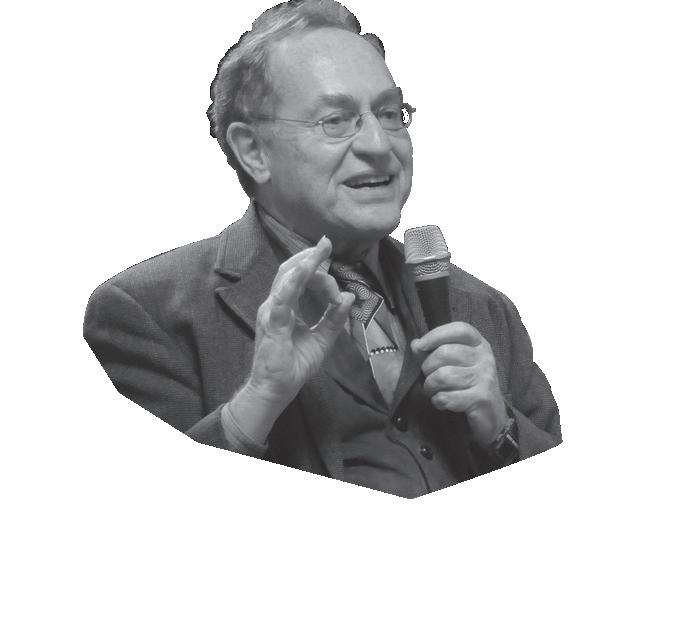
Dershowitz also explained that he once received advice from legal ethics expert Monroe Friedman — who died in 2015 — that signing “of counsel” rather than “counsel,” as he did in this case, on a legal brief would allow him to sign his name without taking on responsibility for the overall content of the lawsuit.
In his decision, Tuchi dismissed this distinction.
“Whether Mr. Dershowitz signed, or intended to sign, those filings as ‘counsel’ or ‘attorney’ or ‘of counsel,’ he signed them,” Tuchi wrote. “And he effectively conceded that he authorized his signature on these filings without investigating whether they were legally and factually sound.”
Dershowitz expressed confusion about the ruling.
“I still don’t understand what the court thinks I did wrong,” he said.
Dershowitz said this case had significant stakes for “the ability of older, semi-retired lawyers who have great narrow expertise in one area to write small portions of the brief or the complaints, or any kind of legal document and not be responsible for all the investigation.”
“If I write something I want the public to know I wrote it, and I want to be responsible for it,” Dershowitz said. “But I don’t want to be responsible for things I didn’t write or didn’t undertake any responsibility for.”
Nancy J. Moore, a professor at Boston University Law School focused on professional responsibility, said she thought the ethics rule in question did apply to this case.
“Rule 11 of the Federal Rules of Civil Procedure is very clear. It says when you’re an attorney and you sign a pleading, you are certifying that to the best of your knowledge, you have conducted a reasonable investigation, and that these pleadings are well-founded, and that he signed and there’s no exception,” she said. “He signed and there’s no exception.”
Moore said that Dershowitz could have contributed his work and simply not signed on to the lawsuit.
“You can do the work. You can get paid for the work that you do,” she said. “There’s a lot of lawyers working on this case — only a small number of them signed the brief.”
Moore also said she believes Dershowitz is not motivated by the financial aspect of the sanctions.
“He’s someone who has a fairly big ego,” Moore said. “He doesn’t like any attack on his reputation.”
For his part, Dershowitz called the case a “very dangerous decision” that could imperil the role of experts contributing written portions of lawsuits.
jo.lemann@thecrimson.com
Kennedy and Diplomats Reflect on 25 of Years Good Friday Agreement
BY THOMAS J. METE CRIMSON STAFF WRITER
United States Special Envoy to Northern Ireland Joe Kennedy
III spoke at a gathering Tuesday morning celebrating the 25th anniversary of the Good Friday Agreement and its lasting impact on peace in Northern Ireland.
The celebration — held at the Edward M. Kennedy Institute for the United States Senate — brought together officials from the U.S., U.K., and Ireland to discuss the landmark peace deal, which ended three decades of violence in Northern Ireland between the region’s Catholic Nationalists and Protestant Unionists through the creation of a power-sharing agreement.
Tuesday’s event was co-hosted by the Harvard Kennedy School’s
COLLEGE FROM PAGE 1
Belfer Center for Science and In-
ternational Affairs; the Consulate General of Ireland, Boston; the British Consulate General, Boston; and the Northern Ireland Bureau with support from the U.K. government. The Good Friday Agreement ultimately acknowledged Northern Ireland as a member of the United Kingdom, a recognition that could only be reversed by referendum, ending the brutal sectarian conflict known as “The Troubles.”
“What do the next 25 years hold?” Kennedy asked in his keynote address.
“Children will grow up to unite behind a vision of building one of Europe’s most dynamic energetic economies across a sectarian class and political divisions that pull together and are not drawn apart,” he said to attendees.
The program also featured re-
marks from George J. Mitchell, the former U.S. Senate Majority Leader; U.S. Representative Richard E. Neal; Lord Johnathan M. Caine, the U.K.’s Parliamentary Under-Secretary of State for Northern Ireland; and Darragh O’Brien, a member of Ireland’s Cabinet.
“I remember as someone who was not involved in politics in 1998 that morning of the agreement as if it was yesterday,” O’Brien said.
“That led that forward for me — as someone who was always interested in politics — was to actually get involved in politics.”
Caine was pressed by Meghan L. O’Sullivan — the director of the Belfer Center who moderated the panel — on the potential role the U.K. would play if Northern Ireland opted to form a United Ireland.
“It’s entirely a matter for the people of Northern Ireland to decide,” Caine said.
New Orgs Pause Leaves
per Harvard’s student organization handbook for the 202324 year. For undergraduates who entered the academic year with plans to start a new organization, the freeze in club recognition means they must operate without the benefits held by recognized student organizations.
Dalal M. Hassane ’26, a student organizer working to start a Kurdish Cultural Association, said the club will need to look toward other sources to support programming because Harvard Undergraduate Association funds are reserved for recognized student organizations.
Hassane, a Crimson Editorial editor, developed plans to start the club before the pause in recognition was proposed last spring. She added that it will be difficult for the new club to grow its standing on campus without being recognized as a club by the DSO.
“Without this official recognition, there can be some difficulties in being more visible on campus and really letting people know that we have a presence as Kurdish students and as people who want to bring
awareness to the Kurdish culture and history,” she said.
Sofia G. Melnychuck ’26, a co-founder of the International Folk Dance Club, said the organization’s most pressing issue as an unrecognized group is that it lacks a regular place to host its weekly Sunday meetings. “The main thing is that right now we are practicing outside,” she said. “And last one it was raining, but we still have very committed members that are willing to show up in the cold and in the rain.”
According to the 2023-24 resource guide for student organizations, only officers of recognized student organizations can make room requests for hosting club events.
Some students are turning to creative ways to create new organizations and still access DSO resources.
Ivan A. Garcia ’25 is currently working to establish what he dubbed the “Union College Club.” The club aims to foster connections between other undergraduate institutions and provide networking opportunities and pre-professional training to Harvard students.
“The current U.K. government’s view is that we believe the best future for Northern Ireland is as a part of a strong United Kingdom, but I fully accept other people will have a different view,” he added.
Mitchell, who was appointed by President Bill Clinton as the inaugural U.S. Special Envoy to Northern Ireland, was an active player in the negotiations towards the peace agreement in 1998.
“On the very first day of the negotiations, I said to the delegate that I did not come with an American peace plan,” Mitchell said. “If there is ever to be an agreement, it must be your agreement, and it was. The agreement was written and agreed by the elected representative of Northern Ireland.” During Kennedy’s keynote address, he reflected on his Irish heritage and great-great grandparents, who arrived at the wharfs of
Boston in 1848, after fleeing famine on a “coffin ship” for a better life in America.
“The young couple represented Ireland’s most precious resource and its most valuable export: its people,” Kennedy said.
“It’s a story of a family, a community pulling together rather than being drawn apart,” he added. “For no political, economic, or social advancement was possible for penniless immigrants without communities coming together to forge powerful coalitions that demanded change.”
While Northern Ireland has still experienced sporadic violence, as recently as this spring, Kennedy urged the room of assembled representatives to continue to heal and build upon the work started 25 years ago.
“There is no progress to be made by ignoring our past or living
numb to its present,” Kennedy said.
“From Belfast to Boston, we can help build a society where the troubles of the past give the way to triumphs for tomorrow, where children can read about their history without reliving it,” he added. Kennedy, who was appointed to his current post by President Joe Biden nine months ago, jokingly alluded to his unsuccessful 2020 Senate bid at the beginning of his remarks.
“I just have to say personally, there is no place I’d rather be than with all of you at the floor of the United States Senate,” said Kennedy, who lost in the primary to Sen. Edward J. Markey (D-Mass.) in 2020. “One way or another we got there,” he added during the audience’s applause.
thomas.mete@thecrimson.com
Unrecognized Clubs Without Resources
In order to gain access to College funding and use of the Harvard name, Garcia hopes to get his club “temporarily adopted” by a pre-existing organization. As the president of the Colombian Students Association, Garcia plans to bring his idea to the club’s board in order to “start getting the ball rolling with activities within this club while being a seed product of another.”
HUA Co-Presidents Shikoh
M. Hirabayashi ’24 and John S. Cooke ’25 said in an interview that they are against the recognition pause, with Cooke citing the importance of students’ “freedom to start whatever clubs they choose.”
“We’re really disappointed in this decision. From an HUA standpoint, we’re going to try the best we can to support student organizations in any form — that’s students looking to start new ones and that’s already existing one,” Cooke said.
Hirabayashi added that he and Cooke plan to host a slate of town halls to meet with student organizations in the coming months to “ensure support and solicit advice on how we can best support not just the current
student orgs but, more importantly, the people who want to begin new student orgs.”
Palumbo — the College spokesperson — reiterated in his statement the DSO’s goal of using a temporary pause to assess “independent student organizations currently in operation and to provide recommendations for a sustainable path forward.”
“We are grateful to the students who are participating in the review and look forward to providing an update to the community when the work is complete,” he wrote.
Palumbo declined to comment on when the DSO’s review will conclude or on student frustrations, though Donahue’s statement noted that new club recognition is expected to resume in fall 2024.
Despite the DSO’s messaging on the reasoning behind the club freeze, students questioned whether the office had made the most productive choice.
“It’s a little bit sad and disappointing,” Melnychuck said.

Hassane said she views the DSO’s efforts to review the student organization landscape as “important,” but she main -
tained that a freeze on recognizing new organizations ultimately hurts Harvard’s club ecosystem.
“I think there are ways — in order to go about this review process — while still giving new
student groups and new student organizations the space to organize,” she said. “I really don’t think this was the best decision.” ella.jones@thecrimson.com john.pena@thecrimson.com
NEWS 8 SEPTEMBER 29, 2023 THE HARVARD CRIMSON
LAW SCHOOL
HARVARD
MICHELLE LIU — CRIMSON DESIGNER
Alan M. Dershowitz, an emeritus Harvard Law professor, has had a complicated legacy at the school. SNOWERIA ZHANG — CRIMSON PHOTOGRAPHER
STAFF EDITORIAL
An Overdue Due Process for Research Misconduct

COLUMN HARVARD’S ROLE AMID CLIMATE CHAOS
Truth Versus Fossil Fuels
ENVIRONMENTAL ETHICS. To truly lead in climate scholarship, Harvard needs to disavow research funding from fossil fuel companies — funding which threaten the objectivity of crucial research on the environment.
BY PHOEBE G. BARR
that incited Gino’s LinkedIn post defending her lawsuit and HBS professors’ requests for anonymity in The Crimson can be contorted by the uninformed public into admissions of guilt or evidence of repressive work environments.
BY THE CRIMSON EDITORIAL BOARD
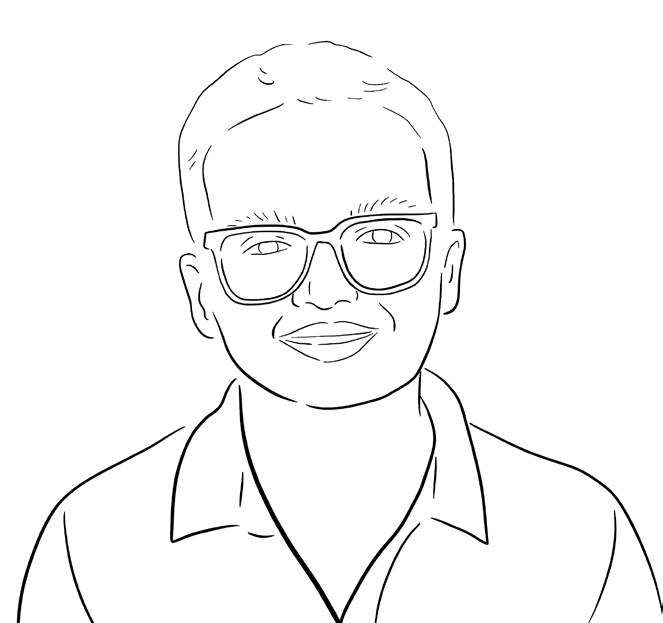
Apaper on preventing fraud facing allegations of fraudulent data? It seems like a twist of irony fit for an amateur author’s first novel. But as usual, reality — or, at least, Harvard Business School professor Francesca Gino’s reality — is stranger than fiction.
This summer, the data investigation blog Data Colada published allegations that at least four studies attributable to Gino contain fraudulent data.
We find ourselves unable to judge Gino’s guilt as of yet. The consequent actions taken against Gino seem damning: Following internal investigation, HBS Dean Srikant M. Datar imposed severe sanctions on Gino, even recommending that the University review her tenure. Yet Gino appears equally confident of her innocence: She has offered adamant rebuttals and filed a defamation lawsuit against Harvard, Datar, and Data Colada.
Our inability to evaluate these allegations reveals the harms of universities’ opaque, informal procedures for adjudicating such issues.
The content of the HBS internal investigation remains obscure — as it has in past similar cases. Although the research misconduct policy applied to Gino’s situation has been in effect for the past two years, some HBS professors say her case is the first they’ve ever heard of it.
Such ambiguous and inaccessible policy defers adjudication from the University to a series of ill-suited actors. Independent groups like Data Colada make valiant efforts, but lack the resources and repute to collect the full story. Meanwhile, courts of law are not courts of science: Judges may not be equipped to settle the complex technical inquiries that decide cases of academic misconduct.
Surely, our ultimate defense against research misconduct cannot rest on a GoFundMe campaign or a legal specialist’s hazy recollection of high school science. Considering both resources and competencies, universities are the best choice to arbitrate academic misconduct allegations.
The current delegation of such investigation to external, unfamiliar actors opens the process up to a sensationalized reception in the public sphere. The legitimate frustrations and fears
FRAUDULENT FINDINGS? The data fraud allegations against professor Francesca Gino make clear Harvard needs a clearer process for dealing with academic integrity disputes. OP-ED
Faced with the insufficiency of these alternate investigators, Harvard has a responsibility to step up and lead, by establishing detailed procedures for a transparent, fair system of adjudication in response to claims of research misconduct.
Without endorsing Gino’s claims of sex discrimination, which may well be spurious, we acknowledge the disproportionately poor treatment of underrepresented groups — such as women and people of color — in trials of innocence. From recusal rules to faculty hiring, this Board recognizes the outsized detriment of informal systems on the least advantaged in society. This bias is a strong motivation for rigorous, strict procedures.
Our proposal for a clearer system of justice takes inspiration from the legal concept of due process. Like an arraignment, the University should formally notify professors as soon as serious allegations are raised. Then, it should put together a committee of peers — a jury of sorts — to decide whether to issue an indictment and trigger preliminary consequences such as suspension. Following a positive decision would be a formal trial, ending in the public declaration of findings as far as employer-employee confidentiality allows and recommending courses of action to the dean. Finally, the dean — acting as judge — would publicly issue a decision with rationale.
We maintain that Harvard must be ready to revoke tenure in response to well-substantiated findings of grave academic misconduct. To remove tenure’s protections in the narrowly defined context of serious research misconduct would aid the free pursuit of knowledge — a primary argument for the existence of tenure.
But the possibility of tenure revocation cannot occur in the vacuum of context that we currently inhabit. There is, both in Gino’s case and beyond, a critical need for clearly communicated procedure. Only then can we stand confidently behind any verdict or administrative action.
–This staff editorial solely represents the majority view of The Crimson Editorial Board. It is the product of discussions at regular Editorial Board meetings. In order to ensure the impartiality of our journalism, Crimson editors who choose to opine and vote at these meetings are not involved in the reporting of articles on similar topics.
Food for Thought
BY VIOLET T.M. BARRON
If everyone lived according to the rules of my mother, there wouldn’t be a messy bedroom in sight and we would each play an equal role in dinner preparation. Cars would be abandoned for bikes and public transportation, and global production of single-use plastics would halt immediately. And we would all have worked in a restaurant sometime before the age of 30.
I only truly understood my mom’s enduring insistence on the value of restaurant work this summer, when I found myself back in my childhood home with no plans for the foreseeable future. June had snuck up and rendered me purposeless and green with envy, separated from my peers who had the foresight to apply to resume-worthy internship opportunities or metamorphic study abroad programs. After a wildly unsuccessful last minute application scramble and a slew of cold emails met with no response, I took to the streets of Los Angeles with 20 copies of my resume in hand, fueled by a sense of desperate hope. By some miracle, within a few days, I had landed a part-time, minimum wage job at a local restaurant. My role at the restaurant was expansive: taking orders, serving food, bussing tables, making drinks, cleaning and restocking — you get the idea. While my position was rather ambiguous, what I learned from my time there was clear. Two months in the food service industry gave me a rudimentary understanding of the Spanish language, an indelible urge to shout “behind!” when passing behind someone, and an irrational fear of getting trapped in a walk-in cooler — but most importantly, this experience gave me invaluable perspective.
From my interactions across the counter, I learned patience. I met many a Karen whose food was just a little too cold or service a little too slow (I would say we saw an average of three a day). My faith in human decency was tested each time an American Express Platinum cardholder didn’t leave a tip. The receiving end of a service job presented social challenges unlike anything I had ever experienced at Harvard.
From my interactions behind the counter, I learned gratitude. The 0.9 mile walk to the Quad now feels like nothing compared to the two-hour commute one of my coworkers made everyday. No paper nor problem set will ever compare to the sheer chaos that is the Monday lunch shift. What I do — what we all do — at this school is not as hard as it once seemed.
One could make the argument that, as Harvard students, our annual academic hiatuses are best spent doing even more learning or working in a lucrative industry, hunched over an office desk or sitting at a lab bench.
To that, I say: If we truly hope to leave this school “to better serve thy country and thy kind,” we must first possess a baseline understanding of this socalled country and kind. This isn’t the kind of understanding that can be gleaned from taking notes in a lecture hall, reading assigned texts, or even volunteering at a charitable organization. This kind of understanding can only be found via work that doesn’t necessarily boost a LinkedIn profile, isn’t always glorious, and may feel disconnected from the intellectual aspects of our lives.
For many Americans, working in a restaurant is not a novelty or a choice but a necessary source of income and stability. However, the Harvard student body is hardly reflective of this vast majority. Harvard Economics professor Raj Chetty ’00 found that a whopping 67 percent of Harvard undergraduates come from the top 20 percent of the national income distribution, while a mere 4.5 percent come from the bottom 20 percent.
Many students here have never and will never work a restaurant job. If this sort of work is a choice for you — perhaps even one you could avoid entirely — I implore you to give some serious thought to this choice.
Then if, God forbid, you ever find yourself sans summer internship or fresh out of college and unemployed, take a walk around your neighborhood and see if any restaurants are hiring. I think you just may find yourself to be a better person for it. And even if you don’t, my mom certainly will.
In the 1970s, scientists at Exxon noticed something troubling: Their industry was warming the planet. Emissions caused by unchecked extraction were projected to ratchet up the average global temperature, with what the researchers called “potentially catastrophic” results. In fact, these scientists accurately predicted global temperatures jumping about 0.2 degrees Celsius each decade, driving us toward two full degrees Celsius above pre-industrial averages by 2050.
In response to the predictions, Exxon quietly made plans to protect its own operations from sea level rise, and then lied — brazenly, knowingly, unforgivably — for decades, throwing doubt upon climate science they knew was right and thereby shielding their business model from public criticism.
Between 2010 and 2020, Harvard publicly received at least $20 million from four major fossil fuel companies.
The result? Fossil fuel companies still rake in hundreds of billions of dollars today. The rest of us have inherited a world where, despite the heat waves and devastating floods surrounding us, lawmakers still debate whether human-caused climate change really exists. The disinformation propagated by companies like Exxon has helped set social consensus so far behind scientific consensus that groups of scientists are chaining themselves to government buildings in a desperate bid to drive political action.
Most people I’ve spoken to aren’t surprised by these facts. The fossil fuel industry is a business, after all, and it will do anything to protect its bottom line, even if that requires lying and obfuscating the science.
But most people are surprised when I tell them that Harvard partners with these very same fossil fuel companies in its own climate research.
In its 2023 sustainability action plan, Harvard laid out its plans for “How We Lead” on the climate crisis, and concluded that the University can make its principal impact through research and teaching. But a significant amount of that impact is sponsored by the very companies that benefit from climate misinformation and further fossil fuel extraction.
Between 2010 and 2020, Harvard publicly received at least $20 million from four major fossil fuel companies. And that’s a lower bound: Harvard doesn’t always reveal the sponsors of its research, so much of the information available comes from fossil fuel companies’ tax forms rather than what Harvard admits.
Where did the money from last decade go? It’s hard to say for sure where Harvard distributed these funds, given the lack of transparency. But fossil fuel companies publicly sponsor — among other places — the Harvard Project on Climate Agreements, the Harvard Environmental Economics Program, the Environment and Natural Resources Program, and the Corporate Responsibility Initiative (whose “Corporate Leadership Group” through time has included Chevron and ExxonMobil).
Some of the directors of these research projects also work with fossil fuel companies. But
even academics who have never engaged with fossil fuel companies can be affected by industry funding. Even if they take fossil fuel industry funding with the best of intentions, unconscious bias can still influence their research. This phenomenon is well documented — for example, fossil fuel funding empirically increases research favorability toward natural gas.
When a corporation funds academic work, there is an inherent power imbalance at play. No matter how objective they seek to be, researchers know they are beholden to that corporation for funding. That’s why, all the way back in 1915, the American Association of University Professors considered freedom from vested influence by external interests a key component of academic freedom.
Harvard has restricted industry donations before in service to academic freedom. Since 2002, Harvard has held a policy rejecting research funding from the tobacco industry, which, like the fossil fuel industry, has historically spread misinformation on public health.
Yet tax forms and giving reports indicate that Harvard has accepted at least a million dollars from the fossil fuel industry for public health research, despite the numerous connections between public health issues and climate change.
Why do we accept fossil fuel funding? We know this industry is not above manipulating science to turn a profit. When we have centers like the Salata Institute for Climate and Sustainability, independently endowed to the tune of $200 million, we clearly don’t need to expose our academics to that manipulation.
Some universities are already taking action to protect their research. Last fall, Princeton announced that it would reject funding from 90 fossil fuel companies. Vrije Universiteit Amsterdam announced an even stronger dissociation this April, refusing any research partnerships with fossil fuel companies that don’t follow the Paris Climate Accords. And this July, Cambridge University received a report that recommended a similar end to collaboration with certain highly damaging fossil fuel companies.
When a corporation funds academic work, there is an inherent power imbalance at play.
Nearly a thousand individual academics, including many Harvard affiliates, have signed onto an open letter calling for fossil free research at their institutions. The call is growing stronger every day: For the sake of good climate science, academia needs to cut fossil fuels out.
And Harvard needs to lead. Harvard’s wealth and prestige make it the perfect place to conduct cutting-edge research into climate solutions. But as long as the fossil fuel industry has its hands in our research, dragging us backward as they’ve been doing to the world since the 1970s, Harvard will not be a leader. It’s time for Harvard to take the next step since divestment. It’s time for fossil free research.
–Phoebe G. Barr ’24 is a History and Literature concentrator in Lowell House. Her column, “Harvard’s Role Amid Climate Chaos,” appears on alternate Thursdays.
THE HARVARD
EDITORIAL 9 SEPTEMBER 29, 2023
CRIMSON
–Violet T. M. Barron ’26, a Crimson
lives in
House.
Editorial Editor,
Adams
EILEENE LEE — CRIMSON DESIGNER
Harvard Should Protect Whistleblowers
BY LEAH L. PIERSON AND HALEY K. SULLIVAN CONTRIBUTING OPINION WRITERS
Harvard Business School professor Francesca Gino, a prominent academic studying honesty, has recently made headlines for allegations that she authored papers containing fraudulent data. The accusations stem from four posts written and published by Leif D. Nelson, Joseph P. Simmons, and Uri Simonsohn on their blog, Data Colada.
The Data Colada posts present a careful and devastating indictment of Gino’s work. For instance, one post describes a dataset containing a demographic question asking students to report their class year. Instead of a typical response (e.g. “junior” or “class of 2016”), 20 respondents gave the nonsensical answer of “Harvard.” The data collected from these respondents overwhelmingly supported the study’s hypothesis, strongly suggesting that the data were tampered with. As one Harvard professor put it, “We are never going to get stronger evidence of fraud, short of the researcher cackling maniacally as they manipulate the Excel spreadsheet on camera.”
Data Colada’s report led Harvard to undertake an internal investigation into Gino’s work and ultimately place her on unpaid administrative leave. Gino responded by suing Harvard — as well as Nelson, Simmons, and Simonsohn — for at least $25 million, due to the impact of the allegations on her career and reputation.
Gino’s lawsuit is likely to fail — similar lawsuits have not succeeded, and many consider hers unconvincing — but the involved parties now face the prospect of a protracted legal battle and hundreds of thousands of dollars of legal fees. While Harvard has ample resources to defend itself, Nelson, Simmons, and Simonsohn do not; they are private citizens who are not backed by a $50.9 billion endowment.
We, along with many members of the academic community, are deeply concerned that this lawsuit will deter future efforts to uncover fraudulent research. A GoFundMe aiming to finance Data Colada’s legal defense has raised more than $357,000 from thousands of people as of this writing, including multiple Harvard professors, but we believe that Harvard should cover these costs. Simine Vazire, one of the GoFundMe’s organizers, agrees, recently telling The Crimson that a goal of the GoFundMe is to “put some pressure on Harvard and on the three data quality researchers’ universities to step up and support.”
The allegations against Gino occur amidst broader challenges related to ensuring the reliability of research. Influential social science experiments have been recreated but failed to yield the original results. In the biomedical sciences, nearly 2 percent of papers include figures with images that appear to be deliberately manipulated, while a similar percentage of scientists admit to having engaged in fraud. The combined effect of un-replicable study results and fraud significantly undermines the credibility of academic research.
Blogs like Data Colada represent an important and all too rare check on suspect research, but there is little professional incentive to do this kind of work. The threat of lawsuits likely makes others even less willing to report suspected research misconduct. Universities that employ academics accused of fraud should therefore pay whistleblowers’ legal fees for
OP-ED
COLUMN QUEER QUERIES
It’s Time for Queer Affirmative Action
LGBTQ+ ADMISSIONS. Given the discrimination that LGBTQ+ individuals face in high schools across the country, college admissions need queer affirmative action.
BY AARYAN K. RAWAL
When I was in high school, my school district adopted regulations that prevented queer students from having their sexual or gender identities disclosed without their consent.
The change was liberating. No longer fearful that a misplaced comment about my sexual identity would lead to parental rejection and housing insecurity, I expressed my queerness and authentically engaged with my education for the first time. I drew connections between course materials and queer history; I allowed my queerness to inform discussions with teachers; I explored intellectual passions that were related to my queer identity.
But now, my home state is trying to mandate that all school districts forcibly out their LGBTQ+ students.
three reasons: They benefit from outsiders exposing their employees’ misconduct, they are responsible for their researchers’ behavior, and they should ensure others can afford to speak up by subsidizing this kind of public good.
First, universities have a stake in uncovering their professors’ research misconduct. Harvard’s reputation is tied to the quality of its research. In addition, fraud can expose univer-
mons’s, and Simonsohn’s own institutions.
Finally, the work done by blogs like Data Colada has always been important, but not lucrative; now, it may become extremely costly. Covering whistleblowers’ legal fees would set an important precedent. While the Data Colada GoFundMe campaign has exceeded its fundraising goal, crowdsourcing legal fees is not a sustainable long-term solution, nor is it one that is likely to reassure other academics con-
Blogs like Data Colada represent an important and all too rare check on suspect research, but there is little professional incentive to do this kind of work.
sities to financial risk: Duke University recently paid the US government $112.5 million after a whistleblower alleged that falsified research had been used to attain federal grant funding. While it is difficult to quantify the financial value of Data Colada’s report, Harvard should at least ensure Data Colada does not pay to perform this valuable service.
Second, Harvard is responsible for the conduct of its researchers. As such, it should ensure that people who catch its employees doing their jobs poorly – and perform an important public service in the process – are not financially penalized as a result. Notably, this is also an argument that Harvard should cover Data Colada’s legal expenses rather than Nelson’s, Sim-
Deregulate the Dining Halls
BY
It’s Tuesday night. I try to eat in Winthrop House with a friend from Currier House.
But, as he swipes his ID and is granted access to the dining hall of his sister House, the guardian device rejects me with a red flash.
“Which House are you in?”
“Pforzheimer House,” I reply meekly.
“Then you can’t eat here tonight — try Adams House instead.”
If you visit the Harvard University Dining Services website, you will be treated to a vast, byzantine matrix of dining restrictions based on House affiliation, the rows and columns barring any visitors to each River House at least one night out of the week.
Some of these restrictions are downright inscrutable to anyone who has not chosen to memorize the “Hours & Interhouse Restrictions” webpage. For instance, Dunster House: “M-W, 1 interhouse guest with resident only from 6-7:15, Dunster+Athletes in season 7:158:30”; “Th, Community Night until 7:15 (Dunster only), Dunster+Athletes 7:15-8:30.”
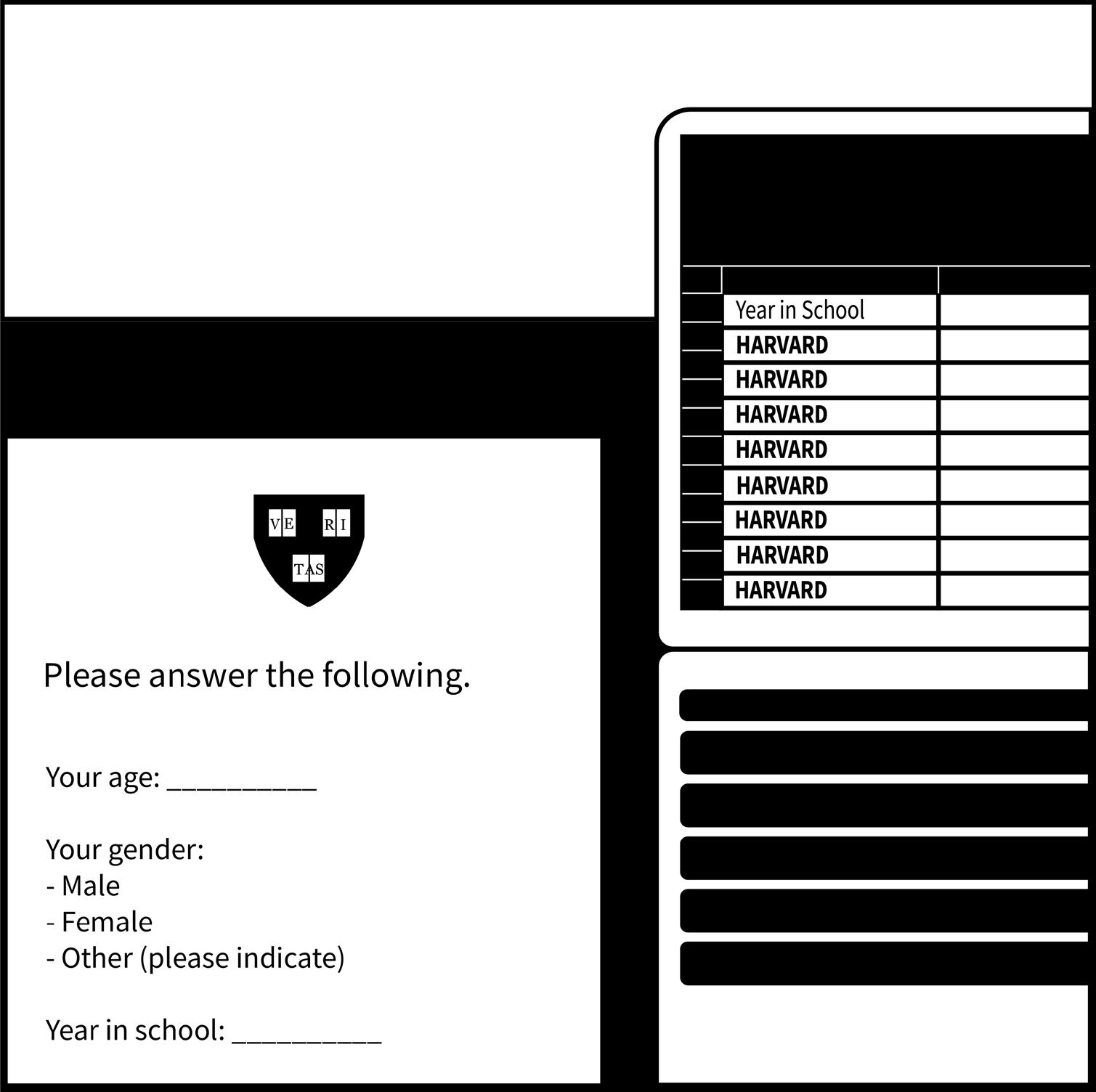
Huh?
In restricting dining to House residents, weekly “Community Nights” and other mealtime restrictions split apart friends who, by the luck of the draw, reside in different Houses. Broader campus cohesion is sacrificed to the altar of a narrower House community.
These restrictions need to go. This level of micromanagement of student dining is not only inconvenient, but entirely at odds with the goal of fostering community on campus.
“Let’s grab a meal sometime” may be the
most vacuous phrase at Harvard — more a polite goodbye than an actual invitation. But the cliche betrays a nugget of truth: Campus social life revolves around dining together. Perhaps more than anywhere else, community is built over a plate of red spiced chicken or beef fajita fettuccine. This reality makes abolishing interhouse restrictions far from a trivial goal.
Let students make their own decisions about when and where to dine — and whom to dine with. Let the beautiful, chaotic web of our social life fully flourish during mealtimes.
Don’t get me wrong: The residential House system is a positive quirk of Harvard life. Community based on a shared pride of place and frequent serendipitous encounters — however arbitrary its randomized algorithm-forged outer bounds might be — is a wonderful part of the social tapestry of this University.
However, walled-off dining halls are not the manner in which we should attempt to generate House camaraderie. If someone doesn’t want to dine with their mostly uncho -
sidering making similar allegations. (It does, however, show how much the public values Data Colada’s work.)
Harvard has the opportunity to set an important precedent, fulfill its obligations to Data Colada, and perform a valuable public service by covering Data Colada’s legal fees. It should seize this opportunity before academia as a whole pays the price.
–Leah L. Pierson is a sixth-year M.D.-Ph.D. student at Harvard Medical School and the Harvard T.H. Chan School of Public Health. Haley K. Sullivan is a fourth-year Ph.D. student at the Harvard Kenneth C. Griffin Graduate School of Arts and Sciences.
It’s surreal to witness leaders attempt to deny students in positions like mine the chance to safely express their true identities. I feel worse when I realize the current reality of those like me: a generation of LGBTQ+ applicants, particularly those from communities of color and southern states, experiencing discriminatory legislation that prevents them from thriving in the admissions process.
The prevailing national assumption after Obergefell v. Hodges was that massive campaigns against LGBTQ+ community members were over. After decades of virulent anti-marriage equality legislation, the queer community secured legal recognition — and by extension, a degree of mainstream affirmation — from an institution that had historically sanctioned the view that same-sex conduct was so immoral it must be punished.
Of course, there were still attempts to deny LGBTQ+ people equality following Obergefell v. Hodges. But, with the Republican Party seemingly softening on anti-LGBTQ+ rhetoric and support for LGBTQ+ rights generally growing, those attempts were met with successful resistance.
Alas, the post-Obergefell optimism was misplaced. Anti-queer forces have pushed trans athlete bans in state legislatures. According to the president of a right-wing think tank that has funded several bans, their goal was never to protect athletic parity; it was to “expose” transgender issues and get “opponents of the LGBT movement comfortable with talking about transgender issues.”
In other words, trans athlete bans were designed to normalize anti-trans rhetoric, starting the ball rolling on state legislation attacking transgender people. Unfortunately, this strategy worked. Legislators were able to harness the anti-LGBTQ+ support of bans on athletics to propose restrictions affecting entire schools. In 2020 and 2021, attacks against queer youth were concentrated on student athletes. But in 2023, the targets have broadened to the very existence of transgender and queer students. Of the nearly 500 anti-LGBTQ+ bills — a record high — introduced this year, almost half focus on schools.
The uncomfortable reality is that the current generation of LGBTQ+ applicants is facing woefully discriminatory school environments that suppress their potential. Queer students in many states simply do not have a fair shot in hyper-competitive admissions systems.
Harvard admissions officers reviewing these applicants are thus faced with a choice: They can evaluate them just as they would any other student, placing the queer student at a disadvantage, or they can account for the disparities the student faced simply because of their LGBTQ+ identity. The latter obviously requires an admissions process that is not blind to a student’s queer identity — otherwise known as queer affirmative action.
sen housemates, they should not be forced to. Interhouse barriers unnecessarily restrict choice — undermining instead of meaningfully contributing to campus community. As a beneficiary (and sometimes victim) of the Quad-River sister House system, I do not feel that Harvard is fostering community when I am sent, alone, to Adams on a Thursday night, while friends from Currier can sit down in Winthrop. The maze of restrictions unfairly disadvantages those with a wider net of friends outside their House than inside it — especially as within-House friends will choose to dine as a group on Community Nights anyway.
The sister House system proves that Harvard understands that student convenience — in this case, for Quad residents spending dinner hours on the River — sometimes justifies mixing residents of different Houses even during restricted dining hours.
We need to extend that logic. Indeed, outside of avoiding overcrowded dining halls at peak hours — which can be achieved by capping, instead of outright banning, interhouse dining — no argument in favor of dining restrictions holds water.
Annenberg Hall — that melting pot that forged so many of our lasting friendships — is the perfect model for dining at Harvard. Let students make their own decisions about when and where to dine — and whom to dine with. Let the beautiful, chaotic web of our social life fully flourish during mealtimes.
Of course, any proposal for queer-concious admissions policies — assuming that queer-conscious admissions face similar levels of scrutiny to race-conscious admissions — must grapple with the Students for Fair Admissions Inc. v. President & Fellows of Harvard College decision. I will not purport that a column written by a sophomore with no legal training can fully obviate these concerns. But, acceptable rationales may exist.
Traditionally, attempts to justify affirmative action rested on four interests: rectifying the effects of societal discrimination, boosting the historical underrepresentation in professions, increasing the number of professionals who practice in underserved areas, and achieving educational benefits that flow from a racially diverse campus.
The first three interests were rejected by the Supreme Court in Regents of the University of California v. Bakke in 1978 — but only in the context of race-based affirmative action. Decades after Bakke, it may be fruitful to ground rationales for queer-conscious admissions in a university’s interest in rectifying societal discrimination. When Justice Lewis F. Powell Jr. rejected this interest in Bakke, he conceded that a university “certainly has a legitimate and substantial interest in ameliorating, or eliminating where feasible, the disabling effects of identified discrimination.” He rejected the interest not because it is illegitimate, but because it was far too unfocused.
But for LGBTQ+ applicants, this interest can be sharply focused. Systemic racism is often baked into institutions, whereas anti-queer legislation directly names LGBTQ+ students as its target. Obviously, this column skirts difficult questions: What does queer affirmative action look like in practice? What types of anti-queer legislation should trigger consideration of an applicant’s sexual and gender identity? Is there an appetite for any affirmative action program after SFFA v. Harvard?
It may be easier for Harvard to simply ignore these questions. But, if we ignore the plight of the discriminated queer student in admissions, our admissions office must recognize it is closing Harvard’s gates to students with experiences like mine.
–Aaryan K. Rawal ’26 is a Government concentrator in Eliot House. His column, “Queer Queries,” runs biweekly on Tuesdays.
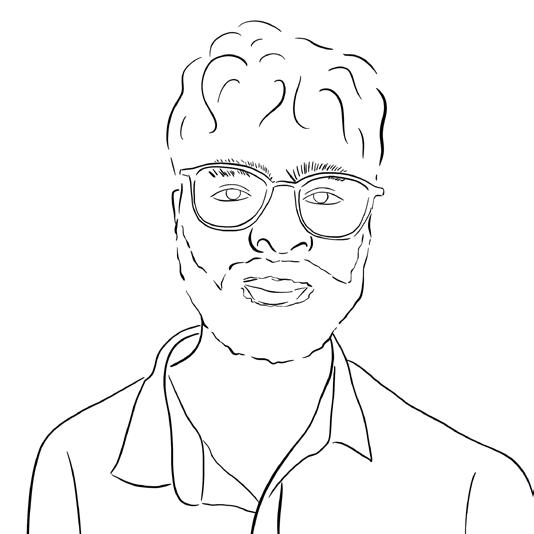
THE HARVARD CRIMSON EDITORIAL 10 SEPTEMBER 29, 2023
EMILY N. DIAL — CRIMSON DESIGNER
OP-ED
–Sam E. Meacham ’25, a Crimson Editorial Editor, is a Social Studies concentrator in Pforzheimer House.
SAM E. MEACHAM
Allston Struggles Amid Migrant Influx
OVERWHELMED. Allston has struggled to provide adequate services to migrant families amid record arrivals.
As the Massachusetts shelter system strains to accommodate record numbers of arriving families, Allston expanded services in June with the opening of a new family welcome center — though the neighborhood continues to struggle to meet the needs of all.
In June, the Brazilian Worker Center in Allston became the first family welcome center created by the state as a spike in the number of arriving families overwhelmed the Massachusetts shelter system. The center aims to “provide support to newly arrived immigrants in the United States,” according to its website.

“The administration is opening a ‘Family Welcome Center’ in Allston to serve as a central entry point for families, especially migrant families, struggling to access basic necessities, connecting them with essential supplies, services, and transportation to a safe place to stay,” the state an-
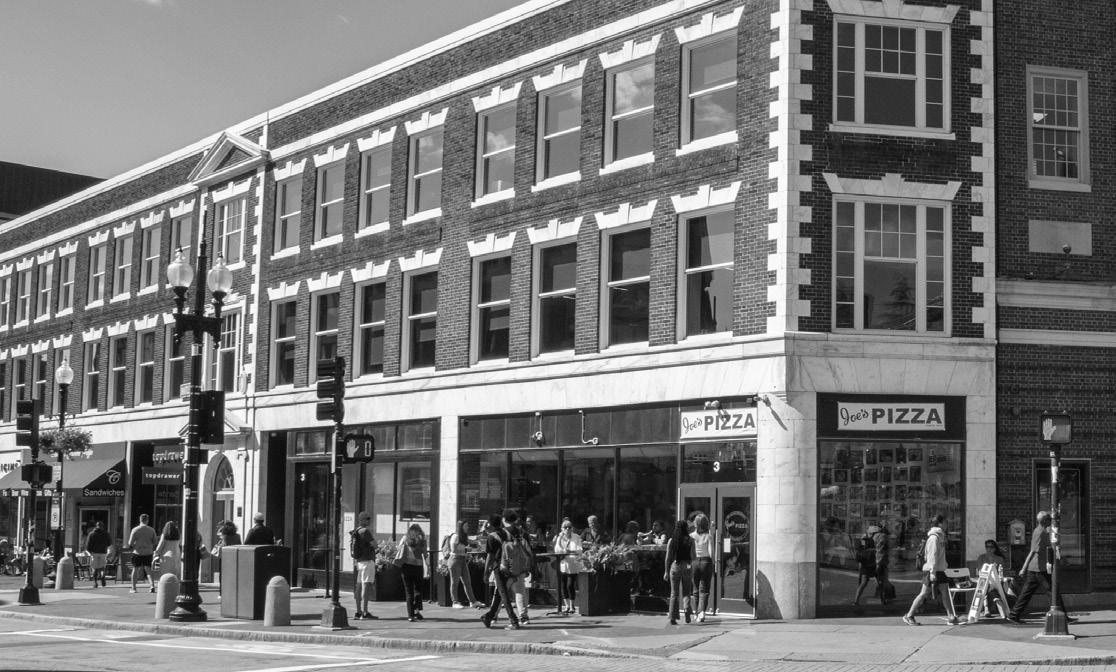
nounced in a press release.
Lorrayne Reiter, the immigrant defense project coordinator at the Brazilian Worker Center, said that the first few weeks of the opening of the Allston family welcome center saw 30 to 40 families arrive per day, “which was a lot.”
A little over a month after the opening of the Allston family welcome center, the state opened up a second family welcome center in Quincy, alleviating pressure on the Allston facility.
“Right now, with another family welcome center, there’s not a surge as it was before,” Reiter said. “Right now, we’ve been seeing like 12 to 15 families per day, which is a good amount.”
On Aug. 8, the administration of Massachusetts Governor Maura T. Healey ’92 announced a state of emergency because of the surge in immigration and called for more support from the federal government. Healey called for “streamlining the work authorization process and passing comprehensive immigration reform,” according to the administration’s press release.
As a part of Healey’s state of emergency, her administration mobilized 250 National Guard members to assist with staffing temporary shelters across the state. In the press release,
Healey and Lieutenant Governor Kimberly L. Driscoll attributed the crisis to a lack of housing and monthslong delays in worker permits.
“We know what it will take to truly address the root causes of this emergency — rapidly increasing housing production across the state and implementing comprehensive immigration reform at the federal level, including work authorizations,”
Driscoll said in the press release.
According to a Healey administration briefing obtained by The Crimson, the number of families staying in the statewide shelter system is slated to nearly double by next month compared to the beginning of the year — from 3,800 in January to 7,500 by October.
“We feel overwhelmed,” said Heloisa M. Galvão, the executive director of the Brazilian Women’s
After Dozens of Partial Shutdowns, Red Line Still Slower Than When Repairs Began
Group in Allston, which provides migrant services like citizenship classes and legal assistance.
Boston’s high concentration of nonprofits and city-provided resources for migrants tends to attract new arrivals to the area, who then must face the tremendous cost of rent in one of the most expensive cities in the country.
“They just put as many mattresses as they can in a bedroom and that’s how they’re living,” said Carolline P. De Paula, director of education at the Jackson Mann Community Center in Allston. “We have the whole family living in one bedroom, because that’s what they can afford, being in Boston.”
Galvão recounted how one family this summer called the Brazilian Women’s Group on Tuesday saying they hadn’t eaten since Saturday.
Another mother came to the Brazilian Women’s Group in distress because bug infestations in her housing were keeping her children up at night, she said.
“Her kids were literally being eaten up by bedbugs and cockroaches,” Galvão said.
Some relief has come from a Massachusetts law that went into effect this summer allowing undocumented immigrants to apply for a standard driver’s license.
Former Massachusetts Trans-
portation Secretary Gina Fiandaca said in the June press release announcing the policy change that all residents, regardless of immigration status, will now be able to apply for a license and “legally drive to get to work, school, the doctor’s office, and to see family and friends.
De Paula said that she thinks that “with a driver’s license being accessible” that overcrowding “might change a little bit” — because the change allows migrants working in Boston to commute from elsewhere, rather than having to contend with the city’s housing prices. Despite challenges, local migrant service providers said recent efforts by the state have helped alleviate some of the pressure.
“Since the beginning of the opening we have been seeing more than 1,200 families,” Reiter said. “We could not do that if it weren’t for the partnership with the state.”
“I think what has been happening is great,” De Paula said. “And I think Healey has been giving more attention to this and being more vocal and people are mobilizing more, because we do need to speed this up.”
Joe’s Pizza Expands its Dough-main
CAROLINE K.
New York-based chain Joe’s Pizza welcomed customers on Sept. 15, bringing the iconic taste of its NYC-style pizza to Harvard Square.
Located on 3 Brattle St., the storefront is the first Joe’s location in Massachusetts. The new location joins the wide variety of options for pizza in Harvard Square, including Pinocchio’s Pizza & Subs and Otto. Joe’s Pizza opened its first location in 1975 in Greenwich Village and has now expanded to Cambridge, as well as other parts of New York City, Miami, and Michigan. Previously, Milk Bar occupied the space where it currently operates.
Joe Pozzuoli, president and majority owner of Joe’s Pizza, said Massachusetts is “a new market” for the chain.
“It is a convenient location for us because it’s close enough to New York where it’s easy to get to,” he said.
At Joe’s, customers can order whole pizza pies, salads, and slices — with the latter beginning at $4 per slice. The pizza options include cheese, Sicilian, caprese, and more.
Joyce Q. Lu ’26, who visited the restaurant on opening day, said the pizza “definitely tasted like it was from New York.”
“I didn’t think it was anything amazing, but if you like thin-crusted pizza and you like New York pizza, then I would definitely recommend,” she said. “I think it’s a little overpriced, but then again, everything in the Square is kind of overpriced.”
The store features a plethora of pictures of celebrities who have visited the chain, including Kim Kardashian, Dua Lipa, and Conan O’Brien.
“They make it all old time-y with all the photos,” Scolnik-Brower said, speaking to the atmosphere of the store.
Annie Steffen, a local resident, and Liv Hurley visited the store together.
When the MBTA launched its online slow zone tracker in March, Interim General Manager Jeff Gonneville struck an optimistic note, writing that he expected that “over time, this platform will demonstrate the progress we’re making to remove speed restrictions.”
Six months later, there has been little sign of progress.
According to the dashboard, Red Line riders are experiencing commutes worse now than when extensive repair began in late February, with the pace of track shutdowns set to remain steady in the coming months.
On Feb. 25, the date of the first Red Line track work diversion of 2023 — a shutdown between Alewife and Kendall stations — the “total slow zone time” recorded by public transit advocacy group Transit Matters’ slow zone tracker was 40 minutes, meaning it took 40 minutes longer than normal to get from one end of the Red Line to the other.
Seven months later, with 15 weekend shutdowns and 18 evening shutdowns implemented so far for “improvement work across the MBTA system,” and several more scheduled to come in October, the Red Line’s total slow zone time has not decreased
from February, but increased.
At the start of September, the Red Line took twice as long to traverse the full extent of its track as in February — forcing riders to endure slower commutes and longer wait times.

Though slowdowns have declined somewhat over the last two weeks, in interviews with The Crimson, T administrators, riders, and advocates all reported a lack of visible progress. “I would say there hasn’t been any real tangible improvements,” said Seth M. Kaplan, a volunteer at Transit Matters.
Hannah R. Wolfe, a clerk at the Harvard Book Store who commutes to work on the Red Line, said the MBTA is “flailing.” Wolf said she felt the shutdowns have only made the T worse.
Lindita M. Veli, a Harvard Undergraduate Dining Services’ worker in Dunster House, said the delays have worsened her commute: She has to leave her house an hour and a half before work begins to arrive on time.
“It’s a lot of hours,” she said.
“It’s not comfortable for us.”
Veli added that some days, she simply has to Uber to work.
In a statement to The Crimson, MBTA General Manager Phillip Eng wrote that he welcomes resident feedback, acknowledging that the T has “more work to accomplish along the remainder of the Red Line.”
“Ultimately, we will restore public trust and ridership by delivering improvements riders will notice,” he wrote in an emailed statement. “I pledge to keep listening, taking action on feedback, and being accountable to riders.”
Publications and advocacy groups such as the Boston Globe and Transit Matters described the T as in “crisis,” set off in the summer of 2022 when the Orange Line underwent an unprecedented monthlong shutdown and the Federal Transit Administration forced the T to take emergency measures to ensure safety and track maintenance.
Since then, the T has been forced to make service cuts and initiate extensive inspection, repair, and maintenance across dozens of miles of track.
In March this year, a routine inspection exposed issues with the T’s documentation of track defects, forcing the system into a brief “global slowdown,” keeping trains between 10 to 25 miles per hour and dramatically increasing the number of slow zones.
This month, the FTA issued emergency orders on workplace safety after warning the T that its working conditions brought about “a substantial risk of serious injury or death of a worker.”
The warning came after several near-misses of track workers by oncoming trains, including
two incidents between Harvard and Porter stations where workers tried to signal to the approaching train to stop — but it didn’t. The letter added that the workers were able to reach the operational control center in time to avoid a collision.
Last week, the FTA again chastised the T in a letter from Chief Safety Officer Joe DeLorenzo, after discovering the T had “directly violated” emergency orders. DeLorenzo threatened to withhold federal funding or institute more restrictions on work at the T.
Thomas P. Glynn III, chair of the MBTA Board of Directors, said that significant progress had been made within the MBTA administration, though he conceded there was little to show for yet “from a rider perspective.”
“The ingredients are there for optimism,” he said, referencing the April arrival of Eng as general manager and significant staffing changes Eng had made among T executives in recent months.
Glynn added that “short-term pain” like partial shutdowns would be necessary to realize any improvements.
“It’s gonna take a significant amount of time to get things back on track, to line up the budget, the personnel, and performance so that the service is as good as it once was,” he said.
jack.trapanick@thecrimson.com
Students welcomed the new location with enthusiasm. Lillian Sun ’26 discussed the “unique flavors” offered at Joe’s, highlighting the “Fresh Mozzarella” option.
“I don’t really see that anywhere else. I see more like traditional pepperoni pizza or cheese pizza,” Sun said.
Sasha G. Scolnik-Brower ’17 knew of the New York location and wanted to check out the new Cambridge location for himself.
“I’m not a connoisseur, but I thought it was great,” Scolnik-Brower said. “It’s nice to have one right in town.”
“We couldn’t be more happy with the enthusiasm and support received,” Pozzuoli said.
Joe’s has not yet set its official hours, but Pozzuoli hopes to continue serving until 3 a.m. on weekends.
“We’re trying to go as late as we can,” Pozzuoli said.
“I hope they start building a Boston wall of all the Boston people that come,” said Steffen. “We were just talking about all the celebrities on the wall, pointing them out.”
When Joe’s Pizza first started to expand, the owner, Joe Pozzuoli Sr., resisted.
“He wanted to keep the product — the business — pure, so to speak, without diluting ourselves by expanding,” Joe Pozzuoli Jr. said of his father.
However, they could not ignore the overwhelming demand for Joe’s products.
“We felt that there’s demand for this pizza for sure,” Pozzuoli said. “It just seemed to make sense.”
“Our product is an old school product. We’re not reinventing the wheel,” Pozzuoli added. “But we feel we do it right.”
Massachusetts launched a family welcome center in the Brazilian Worker Center in Allston. SAMI E. TURNER — CRIMSON PHOTOGRAPHER
ALLSTON
METRO 11 SEPTEMBER 29, 2023 THE HARVARD CRIMSON Joe’s Pizza is located at 3 Brattle St., the former storefront of Milk Bar and &pizza. ARIANA-DALIA VLAD — CRIMSON PHOTOGRAPHER
The MBTA Red Line's total slow zone time has not decreased from February, but increased. JULIAN J. GIORDANO — CRIMSON PHOTOGRAPHER
sidney.lee@thecrimson.com jack.trapanick@thecrimson.com sami.turner@thecrimson.com
BY
HSU AND SIDNEY K. LEE CRIMSON STAFF WRITERS caroline.hsu@thecrimson.com
BY JACK R. TRAPANICK CRIMSON STAFF WRITER
BY JACK R. TRAPANICK AND SAMI E. TURNER CRIMSON STAFF WRITERS
CRIMSON
Jocelyn Viterna is the chair of Harvard’s Women, Gender, and Sexuality Studies, a professor of sociology, and a researcher of sexual and reproductive rights.

This interview has been edited for length and clarity.
FM: In your Los Angeles Times article about Evelyn Beatriz Hernanda Cruz who was found guilty of aggravated homicide for giving birth to a stillborn baby, you write about the “moral panic” happening in El Salvador. Can you talk a little bit about that theory of the “moral panic”?
JV: What we see in El Salvador is that the large majority of women who went to jail for pregnancy-related crimes did not have an abortion. They were seven, eight, even nine months pregnant. They lived in impoverished conditions. They went into labor when they were alone. They had no support. Sometimes they tried to call 911, but because it was a high crime area, the police or the ambulance didn’t come, and something happened that the baby was either stillborn or died shortly after birth through no fault of their own.
In 1998, a new abortion ban went into effect, and in 1999, it was put into the constitution. The funny thing is that abortion had always been illegal in El Salvador, there were just a few
I
JOCELYN VITERNA ON EL SALVADOR, ABORTION BANS, AND FINDING PATTERNS
SOCIOLOGIST Jocelyn Viterna sat down with Fifteen Minutes to talk about her research into gender politics and reproductive justice in El Salvador. “If a social movement is not based in actually changing the hearts and minds and practices of individuals, then I think it’s always going to be vulnerable,” she says.
I’ve been really moved by cases in Latin America that have had a lot more success than the United States has, and one in particular was Argentina. In Argentina, the pro abortion rights movement partnered very closely with other progressive movements. It was sort of lots of movements that were siloed, but it worked very closely to think about how abortion rights were also part of workers’ rights, and were also part of socioeconomic inequality arguments, and the like. I think that kind of broadbased coalition led to change that is much less likely to be overturned and much more likely to support anyone who needs to access reproductive care without shame and with community support.
That kind of broadled much less likely to be overturned and much more likely to support anyone who needs to access reproductive care without shame and with community
exceptions, like if the life of the mother was at risk, then their doctors could perform an abortion. What this new law did was it took away those exceptions, and it said “no abortion, no exceptions, not in any case.”
But in the process of changing that law, the anti-abortion movement started talking extensively about these “unnatural mothers” or these “perverse mothers” who would throw away their babies and how this was a terrible travesty in society. There would be newspapers that talked about “hundreds of babies are being thrown away,” even though they had absolutely no data that was happening. So the only explanation I have for why women who have some sort of obstetrical emergency are reported for abortion is the moral panic that arose around this time.
FM: So legally the way that, for example, a case like this would be persecuted, is not saying, “It’s illegal that you had a stillborn baby,” but saying, “We assume that you had an abortion because this happened, and because of that, we can persecute you,” and then the evidence gets muddled. But what’s illegal is the abortion, and it’s assumed that someone had that?
JV: Right. Doctors were told, if you suspect someone had an abortion, and you did not report it, you could go to jail as an accomplice.
FM: In that same article, you wrote that a “series of assumptions served as the sole basis for a guilty verdict,” referring to the conjectures made about Cruz’s possible motives. How does the Salvadoran legal system diverge from the “innocent until proven guilty” principle in the United States, and how does that affect women’s verdicts when it comes to stillbirths?
JV: I think largely because there was such an intense pressure put on state officials but there was also a sort of a sense of a mission among state officials that they were going to tackle this problem of “unnatural mothers” killing their babies, there was a hunt to put them in jail no matter what the evidence.
I actually interviewed one politician who was a key pro -
ponent of the anti-abortion legislation. When I asked him why he didn’t believe that the women were innocent given all of the evidence of their innocence, he told me that women who are good mothers, who are true mothers, can do anything to save their children if they really want to. And in fact, he talked about how mothers can lift burning cars off their children with a surge of energy.
When change is created, at the institutional level, you hope that it will be enduring because institutions endure, but as we’ve seen with the Jackson v. Dobbs case, that’s not always true.
FM: You’re planning a few trips to El Salvador this year in continuation of your research. What are your goals in your upcoming visits?
JV: I always have a lot of irons in the fire when I go to El Salvador. I think the thing I’m most excited about is I meet with the women who were formerly incarcerated. I met them in jail when they were still incarcerated for pregnancy related crimes, and over the
years, the feminist group there has worked hard to get them out of prison. And now they are mobilizing into their own group and trying to figure out how to restart their lives in a country that still tends to label them as “baby killers” and where it’s very difficult to find work or get education. I’ve been working with them on some different training programs as well as sort of building a webpage and thinking about how they want to move forward in the world.
FM: When did you learn Spanish? And was it in preparation of your work in El Salvador, or did you learn it before?
JV: I was born and raised in a rural community in western Nebraska, and in seventh grade, I only had one elective in my schedule, and I could choose industrial arts, vocational agriculture, or home economics. Then in eighth grade, I moved to Manhattan, Kansas, where my dad took a new job, and although it’s only a town of about 60,000, it felt like a rocking metropolis to me. This school offered all these different courses, and that was the first time I had a chance to study a language. I started studying Spanish there, and I just fell in love with it. I also had an incredible teacher named Ms. King, who felt it was very important to bring current events into the classroom. And it was the 1980’s and the current events of the 1980’s was the civil war in El Salvador. So not only did
AMANDA Y. SU — CRIMSON PHOTOGRAPHER
I love the language aspect of it, but I think it was the introduction into Spanish that also brought me to El Salvador, because it was through my Spanish class that I became aware of what was happening in El Salvador.
FM: Though El Salvador is more known for its justice violations against mothers, the U.S.’s own abortion debate seems to have escalated in recent years. Do you believe there are any similarities between abortion rhetoric in the United States and arguments used in El Salvador?
JV: Absolutely. The rhetoric and the arguments used by the anti-abortion activists is almost identical, just translate it from English to Spanish.
FM: Your research into gender-based legislation has likely involved peering into the world of social movements and how they have or haven’t worked. In your opinion, what makes a pro-abortion movement successful?
JV: When change is created, at the institutional level, you hope that it will be enduring because institutions endure, but as we’ve seen with the Jackson v. Dobbs case, that’s not always true. If a social movement is not based in actually changing the hearts and minds and practices of individuals, then I think it’s always going to be vulnerable.
FM: How do you think gender politics affects the success of a social movement? In what ways are women “allowed” or “not allowed” to effectively I have an idea that I’ve been puzzling over in social movement theory for a while now. I’m thinking about how to study this, the caveat is that I haven’t studied this or tested this. Of the case studies that we have of social movements, we can see that gender is front and center of how people think about presenting themselves and their narratives and their arguments. I also feel like, from my own research about the war in El Salvador to other things I’ve read about movements, that gender is regularly mobilized and particularly the notion of women and mothers and children. These identities are mobilized to suggest that a movement is righteous, that a movement is So, for example, gun control movements might argue that we need better gun control because guns are regularly used to kill women and children in intrafamilial violence situations. But on the other side, the gun rights lobby might argue that women need weapons to protect themselves from predators, or that we should arm teachers to protect children. I think there’s something about the fact that we so often use feminine identities to signal virtue, that regardless of if the progressive or conservative movement, in the process what we’re doing is reinforcing some of these traditional notions of femininity as good and pure and wholesome and caring in ways that actually make it harder to make progress on gender-based movements.
FM
Q&A:
The only explanation
have for why women women who have some sort of obstetrical emergency are reported for abortion is the moral panic that arose around this time.
Fifteen Minutes is the magazine of The Harvard Crimson. To read the full interview and other longform pieces, visit THECRIMSON.COM/ MAGAZINE SEPTEMBER 29, 2023 THE HARVARD
12
FIFTEEN QUESTIONS
michal.goldsein@thecrimson.com
Artist Profile: Eliza Clark Is Not a Sad Girl Novelist
 BY SAMANTHA A. CHUNG CRIMSON STAFF WRITER
BY SAMANTHA A. CHUNG CRIMSON STAFF WRITER
On the night of the Brexit referendum, in a tiny town on the English seaside, 16-year-old Joan Wilson is doused in gasoline and set on fire by three other teenage girls. The crime goes largely unreported. Alec Z. Carelli, a journalist disgraced for hacking the phones of dead children, takes it upon himself to tell her story.
Framed as Alec’s nonfiction book, Eliza Clark’s sophomore novel, “Penance,” is a mishmash of interviews, news articles, Tumblr threads, stolen diary entries, and fictionalized prose. Partially inspired by the 1992 murder of Shanda Sharer and the controversial crime writing of Truman Capote, “Penance” is an unreliable narrator’s account of a grisly murder and a glimpse into the vicious experience of teenage girlhood.
Clark, whose debut novel “Boy Parts” achieved viral success and who was named in Granta’s 2023 list of the Best Young British Novelists, sat down with The Harvard Crimson to discuss her latest novel.
“Penance” is a bold experiment in both content and form, as well as a biting satire of the modern true crime industry. The
novel’s satirical element originated from Clark’s dissatisfaction with what she calls “trashy true crime” — the kind of insensitive, sensationalized reporting that permeates mainstream true crime commentary.
“To see the rise of the Netflix version of true crime was really, really obnoxious,” she said.
In addition to tackling the true crime industry, “Penance” also takes a deep dive into online true crime fandom and the culture of mid-2010s Tumblr. The book’s main characters are passionately involved in serial killer fandom (which is exactly as messed up as it sounds). In the novel, they’re known as “creekers” — fans who are dedicated to shipping the two male perpetrators of the fictional Cherry Creek school shooting.
“I think a lot of the impact that Tumblr has had on broader online culture isn’t given the credit that it’s often due for how much of an effect it did have on things like how we talk about social justice,” Clark said. “And I think a lot of that online stuff has been washed over from Tumblr in a way that’s quite interesting.”
Clark herself was active in fandom spaces in the early 2010s, when they started to switch from disconnected LiveJournal forums to centralized social media platforms such as Tumblr — a change that she believes created a hostility in fandom, particularly between teenagers, that “Penance” depicts.
“It was a really fun thing to mine, and a funny thing to re -
visit. Sometimes it was quite exhausting,” she said. “I had a chat with a publisher, who I won’t name, about possibly getting me to write a YA novel for them. And I just thought, I can’t cope with thinking about teenagers again or anymore or in depth, because it’s already so draining.”
Writing about fandom was also a way to explore the social dynamics of high school. There’s no shortage of teenage bullying in “Penance,” from targeted harassment at school to anonymous online hate. The two situations, Clark says, naturally bleed into each other.
“I think fandoms are an interesting microcosm for recording teenage behavior in the way teenagers deal with power dynamics, because power dynamics do quite quickly form in fandoms — which I think are very reflective of schools, and of people who are a bit low down on that social hierarchy in school taking the opportunity to be quite cruel online,” she said.
Where does that cruelty come from? Clark, who describes herself as an introspective child, remembers observing power dynamics in school and thinking about the ways in which students who are picked on can end up bullying others.
“High school is quite feral and almost uncivilized,” Clark said. “It almost reminds me of the way that chimps have really specific social dynamics. I think human beings are quite like hierarchical apes naturally. To a degree, people grow out of that when they
get older, but also I think they kind of don’t.”
“Penance” carries a political dimension to it as well. The murder in the novel takes place on the night of the 2016 Brexit referendum, and subsequently receives very little news coverage in comparison. The timing wasn’t originally meant to be political.
Clark was inspired instead by the 1992 murder of Suzanne Capper, whose death coincided with the much higher-profile murder of James Bulger, and as a result went largely unreported in the news.
“I didn’t initially set out to write a State of the Nation novel,” Clark said. “But the more that I went into it, and the more that I worked with that, the more it became a stand-in for a general bad vibe. I talk a lot about tiny pocket hells in the book, and I was thinking a lot about the political climate in 2016 as a bit of a pocket hell situation.”
Clark started writing “Penance” in 2019 and finished it two and a half years later in 2022. In between, her debut novel “Boy Parts” — a dark comedy about a woman obsessed with taking explicit photos of mediocre-looking young men — achieved viral fame on TikTok.
“It went from being this indie press book that had done quite well, to being this huge, huge hit,” Clark said. “That was really strange both to witness happening, but then also to see the change of conversation around my work as well.”
After the success of “Boy
Parts,” Clark began to find herself often referred to as a “sad girl novelist” and her work as a “feral girl book” — labels that she identifies as the result of readers’ “weird projection” onto herself as a young female writer.
“I think I got called a ‘cool girl novelist’ derogatorily in The New Statesman last week,” she said. “I’m nearly thirty. You don’t need to call me a girl all the time.”
This labeling partially motivated Clark to step outside the so-called “sad girl” genre of literature with “Penance” — a novel that, while still centered around female experiences, takes daring experiments with form.
“I was concerned about being pigeonholed as a particular type of writer who only deals with stories about young women and that kind of thing — the quite bland, pejorative stuff people tend to say about young women,” she said. “So I wanted to do something that was formally quite different.”
Clark has several projects lined up after the U.S. release of “Penance” on Sept. 26. “Boy Parts” is being adapted into a one-woman play at London’s Soho Theatre, set to premiere on Oct. 18. Clark is also working on a collection of short stories that will be released in the UK at the end of 2024, along with various projects for film and TV. No matter what comes next, it’s clear that Clark will continue to explore new ground, creating work that refuses to be labeled.
Rhythms in the Rain: A Night of Latin Dance and Culture
BY XINRAN (OLIVIA) MA
WRITER
As the light rain drizzled on to the Old Cambridge Baptist Church on the night of Saturday Sept. 23, live Latin music by Ten Tumbao reverberated off the roof of the José Mateo Ballet Theatre’s Sanctuary Theatre. Crowds of people danced salsa and swing across the floor.
Halfway through the party, the participants were treated to an Eleguá dance performance by Cuban artist Yoandry San Juan Estévez. Dressed in a traditional red and black costume, Estévez swept the floor with his enthu-
siasm, interacting with the audience during his movements and introducing the crowd to the Yoruba culture that Elegúa, a deity of roads, is venerated in.
The Ten Tumbao dance party was a replacement for the 14th Annual Dance for World Community Festival, created by the José Mateo Ballet Theatre in 2008. A free, daylong event with five stages, the festival had originally planned to feature over 60 performance groups, 25 instructors, and 30 participating advocacy groups, reaching a potential audience of over 20,000 people — but was unfortunately postponed due to poor weather. With the main festival postponed almost a
year later to June 8, 2024, the Ten Tumbao performance — which was initially part of the concluding indoor part — became the sole act of this year’s festival.
The event was nonetheless special, featuring the aforementioned performance of a traditional Eleguá dance by Estévez, who traveled to Boston with the support of MetaMovements, an artist collective that collaborates with artists in Cuba and the Dominican Republic to create cultural exchange via Latin dance and music.
Anara Frank, the Director of MetaMovements Dance Company, commented on the special bond that this event created be -
tween artists from the U.S., Cuba, and the Dominican Republic. She then expounded on the important cultural history and lineage behind the dance.
“The program that we do in Cuba is designed by the artists that we work with, so they talk about what things in their culture they want to share with people, what people would participate in,” Frank said. “And so it’s really like, through the eyes of the dancers and musicians, what is Cuba, what is happening in Cuba.”
Estévez’s performance epitomizes Frank’s sentiment. After sharing this piece of culture with the audience, he gave an explanation of the tradition:
“[Eleguá] is considered in the Yoruba tradition to be the first to come and the last to leave; every event, performance, or party, to be able to invite everyone to come and to be able to say when it’s time to go,” Estévez added. He then proceeded to expand on the significance of this festival to him as an artist and its meaningful cultural exchange.
“Dance is like a tool for therapy in a lot of ways. It creates a space for bringing joy into your life. It brings a space for movement for getting to know people socializing in a new environment,” said Estévez.
Despite the rain, people were still finding ways to connect, so -
cialize, dance, and have fun in the Sanctuary Theatre. Angela C. Tramontano commented on how she, as a dancer for 14 years, found it important to connect with the dance community through returning to the Dance for World Community Festival again this year.
“It is still a pretty good turnout today, even though it is not outside tonight,” Tramontano said. “But people still came. And people are having fun and the music is great.”
“When it rains, it rains,” Frank added. “Nothing we can do. But I think it is great that people came out and they’re still supporting José and the festival.”
BOOKS samantha.chung@thecrimson.com
NOVELIST Eliza Clark boldly experiments with both content and form in her new novel, “Penance.”
Eliza Clark sat down with The Harvard Crimson to discuss her sophomore novel, “Penance.” COURTESY OF ROBIN CHRISTIAN AND HARPERCOLLINS
CONTRIBUTING
THE HARVARD
ARTS 13 SEPTEMBER 29, 2023
CRIMSON
MUSIC
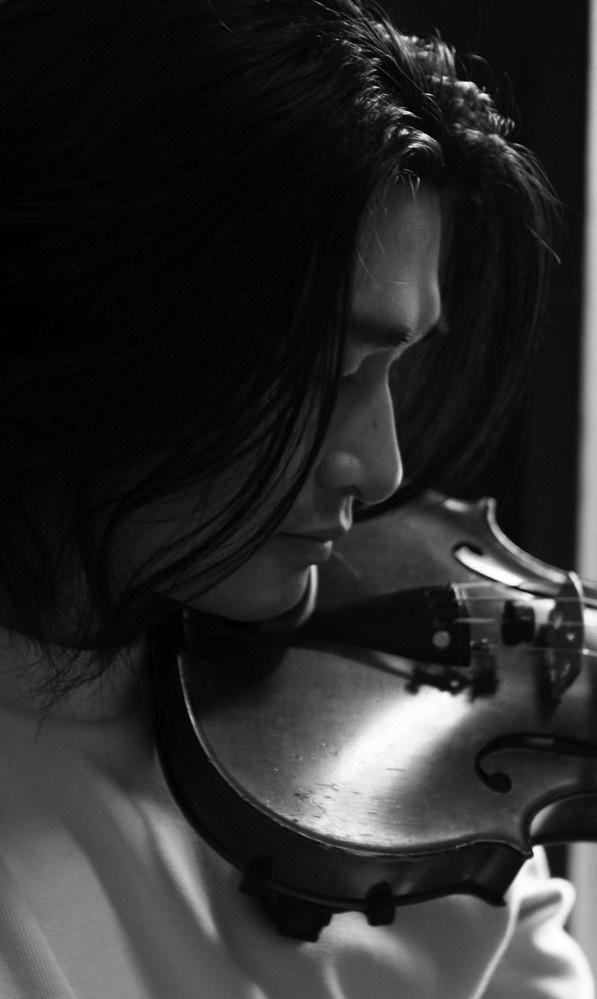 BY EMMA H. LU CRIMSON STAFF WRITER
BY EMMA H. LU CRIMSON STAFF WRITER
Stories told through creative and artistic media can often be the most emotive and resonant. Through musical expression, singer and multi-instrumentalist Jeff Wang is emerging as a local artist with compositions that pay homage to narratives lost in history, aiming to speak to various experiences of Asian American communities. Thirty one-year-old Jeffrey Wang is a musician from Arlington, Mass. who goes by the moniker “Model Peril.” The name is referencing the dichotomy of the experience of many Asian Americans, being cast as embodiments of both the mythic “model minority” — a stereotype that frames Asian American and Pacific Islander individuals as a monolith of economic success and socio-political deference — as well as the concept of “Yellow Peril,” a xenophobic notion that East and Southeast Asian migrants pose a threat to the “civilized” West. In this way, wang reclaims the stereotype in a more positive light, renouncing the negatives through his music.
Still, Wang has come a long way in finding footing in his artistic identity. Despite learning to play the violin at age seven, Wang admitted he didn’t enjoy it until college. Moreover, although he had been writing songs for the past decade, he had not been satisfied with them.
“I would get 90% done with songs, and then I would be like ‘Nah, I don’t like this, these songs,’ and kind of put them away and move on.”
This shifted for Wang, however, with rising anti-AAPI hate that occurred particularly over the Covid-19 pandemic and the apathy he observed from the general public about said rise in hate.
“Like the Atlanta shooting back in 2021, I realized a lot of people — at least from my sphere of social media — didn’t seem like people cared too much,” Wang said.
Wang’s frustration at this lack of empathy drove him toward understanding the history of Asian people in the United States, which he found incredibly lacking in his educational experience. Wang points out that AAPI history in the classroom tends to center around the Asian continent, leaving a gap in knowledge about the communities within this country.
“There’s pretty much no focus on history inside America about Asian people, except maybe the internment camps, and I personally remember we pretty much barely touched on it.”
Thus, Wang’s self-titled album, anticipated to release next spring, seeks to bring awareness to untold tragedies of our American history. “Model Peril” centers around the experiences of East and Southeast Asian communities specifically, starting with his newly released song, “1930, Watsonville.” The single focuses on a fictitious couple during a historical tragedy whereupon a white mob attacked Filipino farmworkers, after Filipino men were seen dancing with white women.
Despite the grave subject matter of many of these songs, Wang seeks to create a completely different tone, one that he said would sound more energetic, so the
Model Peril: AAPI History in the Present
VIOLINIST Jeffrey Wang creating music under the name Model Peril is set to bring a unique listening experience with a new album coming out this spring. With a focus around the experiences of East and Southeast Asian communities specifically, he seeks to bring AAPI history from the past into the present.
darker context isn’t as apparent.
Wang cites “Pumped Up Kicks” by Foster The People and Say Anything’s “Alive With the Glory of Love” as examples of such songs he draws inspiration from. The juxtaposition of lyric and sound creates a unique listening experience with new songs, as Wang explains for himself, “I’ll start singing along with it and not realize the lyrics are either really poignant or pretty messed up if you were actually to say that out loud without music. And then that sticks with you when you come to that realization.”
Thus, Wang believes, enjoying a song beforehand may compel listeners to dive deeper into the historical undertones after they perhaps come to discover the graver lyrics. With this focus on East and Southeast Asian history, Wang sought input from a variety of audiences to help him tell these stories.
“I’ve had listening parties for every single song I’ve written,” Wang said, “to make sure I get feedback from everyone, musicians and non-musicians, people in the Asian community — and people outside of it and other minority communities.”
As a result, Wang reports seeing improvements in the emotional development of characters in his songs. Moreover, collaboration is a meaningful part of his songwriting process. “I see it much more as a group thing rather than just me trying to do something to shove it down people’s throats. I just want it to be more like a communal aspect.”
Wang also finds audience feedback vital, as he works to ensure his art remains respectful of the history from which it draws upon. “I don’t want to make it seem like I’m trying to exploit this for attention or anything like that,” he said. “I’m gonna make sure I do right by these tragedies.”
In highlighting these untold tragedies, Wang contextualizes the presence of Asian communities in American history.
“Sometimes I feel like the Asian community is a little closed off to other minority communities because we have the whole model minority thing,” Wang said, “and I think sometimes that gets to people’s heads — thinking that we are actually better, or something, than other communities — which is unfortunate because, if you really dive into the history of all these tragedies, you can see that we were treated the same exact way.”
“The term ‘Asian’ is just way too encompassing for more than half the population of this world, so I don’t think it’s fair to lump us all in.” In the future, Wang sees the possibility of taking collaboration further, to be able to accurately represent the nuanced and disparate AAPI communities through features on his album; “There are tragedies for South Asians, and more Middle East tragedies too, so I think, if possible, to find people in those communities that I could help create something similar.”
For now, though, Wang has a start on his creative vision. With its enthralling, yet sobering, effect, “Model Peril” brings light to histories of American people that have nearly been all but erased. “1930, Watsonville” is available to listen to on all streaming services. Wang’s self-titled album, “Model Peril,” is expected to be released in the spring.
emma.lu@thecrimson.com
Review: ‘It Lives Inside’ Doesn’t Dig Deep Enough
BY VIKRAM M. KOLLI CONTRIBUTING WRITER
In the shadowy narrative of “It Lives Inside,” where an ancient demon lurks and sanity teeters on the precipice of darkness, Bishal Dutta crafts a tale that transcends the bounds of conventional horror. Beneath the eerie whispers and unsettling visuals lies a deeper, uncharted abyss — a profound exploration of cultural identity in a world where being different is the truest terror.
The film introduces us to Samidha, portrayed convincingly by Megan Suri, a second-generation immigrant who has chosen to go by the name Sam to distance herself from her South Asian her-
itage. Her journey becomes a battle not only against an ancient South Asian demon but also a struggle to reclaim her cultural roots when she breaks a mysterious jar carried around by her former friend, another Indian girl now ostracized in the complex social ecosystem of the town’s high school.
Utilizing an element of Hindu and Buddhist mythology, the fear factor is driven by a Pishach, a demonic figure that attempts to possess human beings and shift their thoughts, driving the victims insane. The affliction is portrayed through a combination of eerie visual and auditory cues: The camera work becomes disorienting, with unconventional angles, adding to the sense of un-
ease, and the sound incorporates unsettling whispers and voices that seem to emanate from nowhere, effectively creating a chilling atmosphere. One of the film’s notable strengths is its cinematography, especially notable in its incorporation of close-up shots to heighten the intensity of the story. The visual effects, particularly the use of reds, add to the film’s eerie atmosphere. These two strengths act in tandem to support Suri’s compelling performance as Sam, who proves her dynamic ability as an actress by breaking away from her innocent high school cliché in her most notable previous work, “Never Have I Ever.”
But where “It Lives Inside” truly excels is in its incorpora-
tion of cultural identity, as the film adeptly conveys the feeling of otherness and the relentless pressure to conform that often confront Black and Brown individuals in predominantly white environments. Sam’s genuine struggle to distance herself from her Indian heritage is depicted authentically: She surrounds herself with white friends, distancing herself from other South Asian peers, and deliberately speaks Hindi reminiscent of a parlor trick. It results in inevitable conflicts with her traditionalist mother — a recurring motif in the experiences of second-generation Americans. This conflict reaches its clearest expression with Sam’s jabbing question, “Why did you even come here, if
you were just going to be another
Desi housewife?”
Even so, the film unfortunately falls short in delivering a substantial exploration of these important subjects. While there is an exploration of the internal turmoil experienced by Sam, it regrettably neglects to delve into the external factors and repercussions of her choices, leaving a notable void in its narrative depth. Where is law enforcement following the murders and disappearances? And wouldn’t the mental toll of such crises prevent Sam from returning to her social circles?
Despite its narrative shortcomings, “It Lives Inside” should be commended for its effort to amplify an underrepresent-
ed culture and shed light on the complexities of cultural identity. Bishal Dutta’s debut film introduces us to fresh faces and themes in the horror genre, but had it fully embraced the unique aspects of its story instead of relying too heavily on standard horror conventions — eerie opening scenes with mysterious objects, plot holes resulting from the protagonists’ actions, and an open-ended sequel teased in the penultimate scene – the lessons of the work would have had greater effect on the viewer.
While “It Lives Inside” offers a glimpse into the challenges of cultural assimilation, it ultimately leaves audiences wanting more in-depth exploration of its central themes.
ARTS 14 SEPTEMBER 29, 2023 THE HARVARD CRIMSON
COURTESY OF DIANA VESPINA
Field Hockey Readies for the Ivy League Season

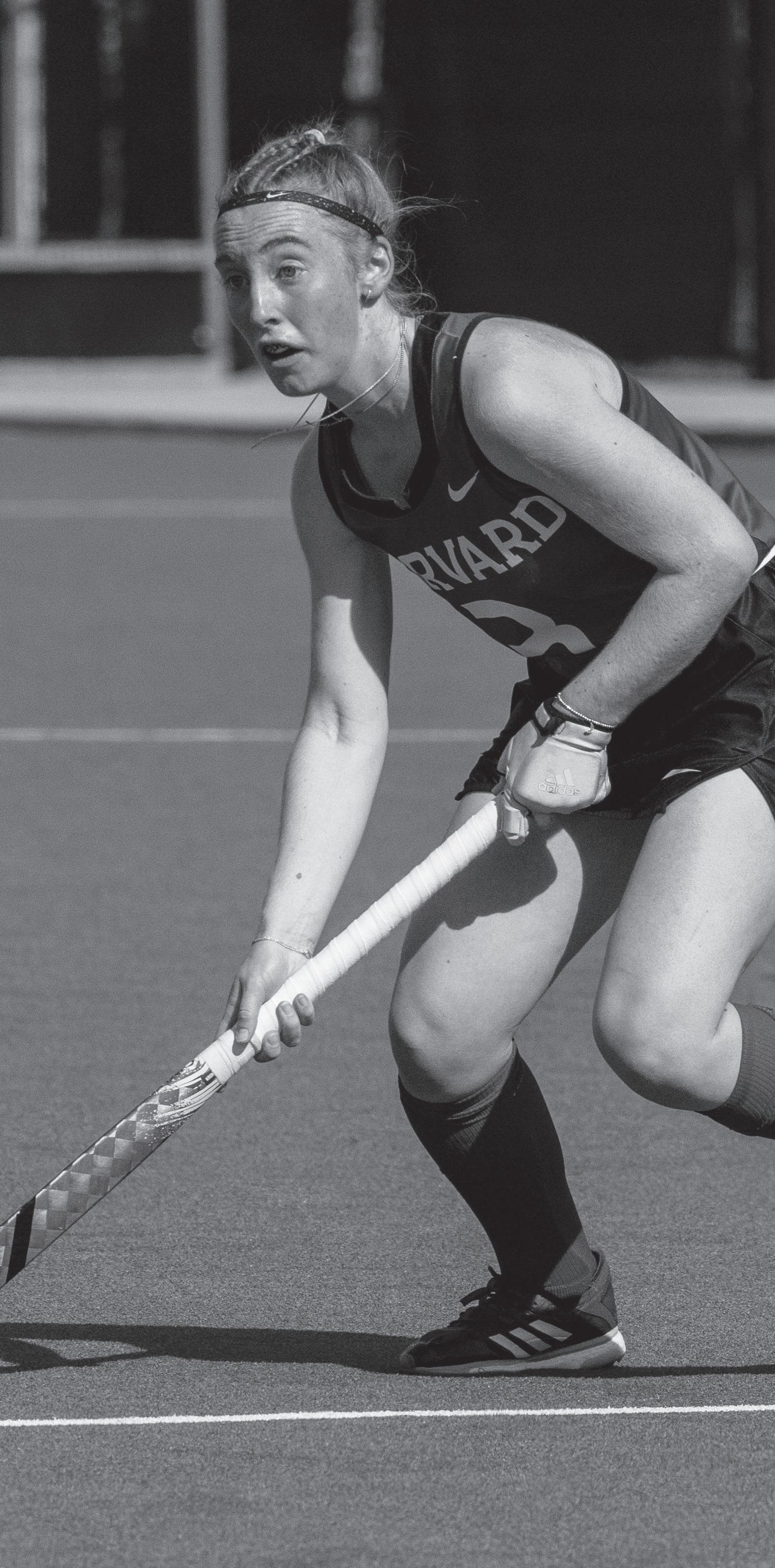
WEEKLY RECAP SCORES
into every week.
“One big thing [Broze] and I have been working on this season is developing our team culture,” she shared. “We read this really cool book called Legacy over the summer…and we came up with sort of ten core team values.” Each week, the team tries to embody a mantra of the week. For instance, one mantra the Crimson has is to keep a “blue head,” meaning to keep calm under high-pressure situations. By
READ
IN FIVE MINUTES
HARVARD BEATS BROWN IN CLOSE 34-31 CONTEST TO WIN FIRST IVY
GAME OF 2023
This past Friday, the Harvard football team (2-0, 1-0 Ivy League) opened Ivy League play with a rivalry game against the Brown Bears (1-1) (0-1 Ivy League). The game ended in a victory for the Crimson, as it continued its 12-game winning streak against the Bears by a score of 34-31. “Nothing we didn’t know going in,” said head coach Tim Murphy about playing against the Bears. “They always seem to have a great quarterback and other offensive players. We thought it was going to be a shootout.” Quarterback Charles DePrima played an outstanding game, recording over 200 passing yards, 100 rushing yards, and four total touchdowns. Running back Shane McLaughlin had a strong game as well, posting over 150 rushing yards on only 16 carries. Wide receiver Cooper Barkate also continued to make a major impact, as the sophomore hauled in 10 pasess for 132 yards and a touchdown.
TIM MURPHY REFLECTS ON FRIENDSHIP WITH DARTMOUTH’S BUDDY TEEVENS
focusing on weekly values like so, Guckian, Broze, and their team aim to build a legacy that goes beyond their time as captains. The Crimson — also known for putting up goals in the fourth quarter that lead to overtime — hope to use these team-building lessons to learn what can get it out of time crunches in the last seconds of a game.
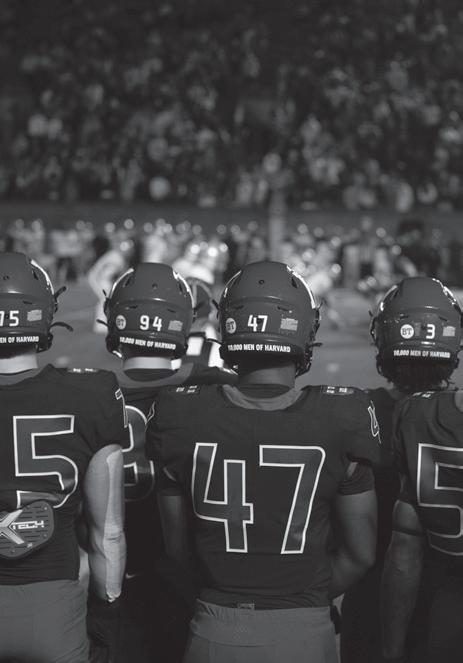
“We have taken a few losses and [are trying to] learn what will help us to win in those final few seconds of the game where it’s like small margins. I’m not sure we’ve quite found that yet. We just seem to be one play away.”
Though Harvard has not entered the make-or-break moments in its season just yet, the team will enter the key portion of its Ivy League season tomorrow
evening. This will play an important role in whether the team will get a bid to the NCAA tournament later on in the season via the Ivy League Tournament.
“Winning the Ivy League lets us host the tournament, and if we then win that tournament, that’s our bid to the NCAA tournament, which is our ultimate goal,” Guckian said. “I really think that taking on those top-
ranked teams puts us in a great position to take on the likes of Princeton and Cornell.”
Tomorrow, Harvard will travel to enemy territory for a 5:00 p.m. EST game against Yale, returning to Cambridge on Sunday for a 1:00 p.m. EST matchup with Syracuse University. The games will be streamed on ESPN+.
To this day, Tim Murphy and Buddy Teevens have never agreed on if Murphy was safe. It was a 1969 Little League all-star game, and Murphy was trying to score from second base. Trying to prevent him was Eugene F. “Buddy” Teevens III, the legendary Dartmouth football coach who passed away Tuesday at the age of 66 following injuries he suffered in a March 16 bicycle accident.in St. Augustine, Fla. in St. Augustine, Fla. The two boys collided at home plate, and Murphy was called safe. More than 50 years later, Teevens continued to dispute the call. “It’s so silly that we’ve talked about it so many times. ‘I was safe!’ ‘No, you weren’t!’,” Murphy recalled with a laugh.
Sophomore midfielder Kitty Chapple moves the ball upfield vs. Delaware on Oct. 16, 2022. DYLAN J. GOODMAN — CRIMSON PHOTOGRAPHER
FIELD HOCKEY IVY KICKOFF. Field hockey will take on the Yale Bulldogs this weekend in its much-anticipated Ivy League opener. BY MAIREAD B. BAKER CRIMSON STAFF WRITER SEPTEMBER 29, 2023 THE HARVARD CRIMSON SPORTS 15 mairead.baker@thecrimson.com
WOMEN’S SOCCER VS. BROWN L, 0-2 FIELD HOCKEY VS. DUKE L, 2-3 RUGBY VS. ARMY W, 45-3 VOLLEYBALL AT DARTMOUTH W, 3-1 MEN’S SOCCER VS. UNH L, 0-1 WATER POLO VS. MERCYHURST W, 22-2 FOOTBALL VS. BROWN W, 34-31 GOLF MACDONALD CUP T-5TH
IT
Men’s Soccer Keeps it Close Against Ranked Opponents
Harvard vs. Cornell, 1-1
BY MADDIE B. BARKATE CRIMSON STAFF WRITER
Harvard men’s soccer (1-3-4, 0-0-1) went (11-2) in their last four games, including a 0-1-1 record against ranked opponents. In this span, senior Willem Ebbinge moved to second all-time at Harvard in career assists, and he now leads the team with seven points. Junior Alessandro Arlotti is close behind with five points, and junior Jan Rieke has played every minute on the season so far for the Crimson.
Harvard vs. No. 18 New Hampshire, 0-1
A quick goal by the Wildcats in the ninth minute put nationally-ranked New Hampshire up early, where they stayed for the remainder of the game, despite a standout performance from sophomore goalkeeper Lucian Wood, who made six saves. Harvard had early chances against the Wildcats, with both Ebbinge and Arlotti forcing New Hampshire graduate student goalkeeper Joseba Incera to make diving saves. However, the Wildcats struck soon after, with a long shot from graduate student Atila Ashrafi deflecting off the post in the direction of graduate student Eli Goldman, who was able to place it past Wood. Wood made multiple saves on the night, including three in the first half, to keep the game close for the Crimson. It allowed for several scoring opportunities, including two shots on goal from senior Kaoru Fujiwara. However, Harvard was kept off the board for the rest of the night and the Wildcats came away with the win.
Arlotti tallied his first goal of the season as the Crimson tied Ivy League rival Cornell in its league home opener on Jordan Field. Ebbinge, coming back from his time with the New Zealand national team, has been nothing but stellar for Harvard so far this season, and quickly made an impact in the fifth minute against the Big Red. A long ball into the box from the left side of the field found Arlotti, who quickly headed it into the back of the net to put the Crimson up one. But Cornell was not to be kept off the board for long. Just six minutes later, Big Red senior Matthew Goncalves was able to beat Wood and even the score. Both teams pressed hard throughout the rest of the game, but Wood was able to make several saves, including three in the second half, to keep the game even at 1-1.
Harvard vs. Fairfield, 4-2
The Crimson earned their first win of the season against the
GAMES TO WATCH THIS WEEK
Fairfield Stags on Sept. 19th. Firstyear Dylan Tellado scored the first two goals of his career, earning his first career brace, and was supported by goals from Arlotti, as well as senior Ale Gutierrez.
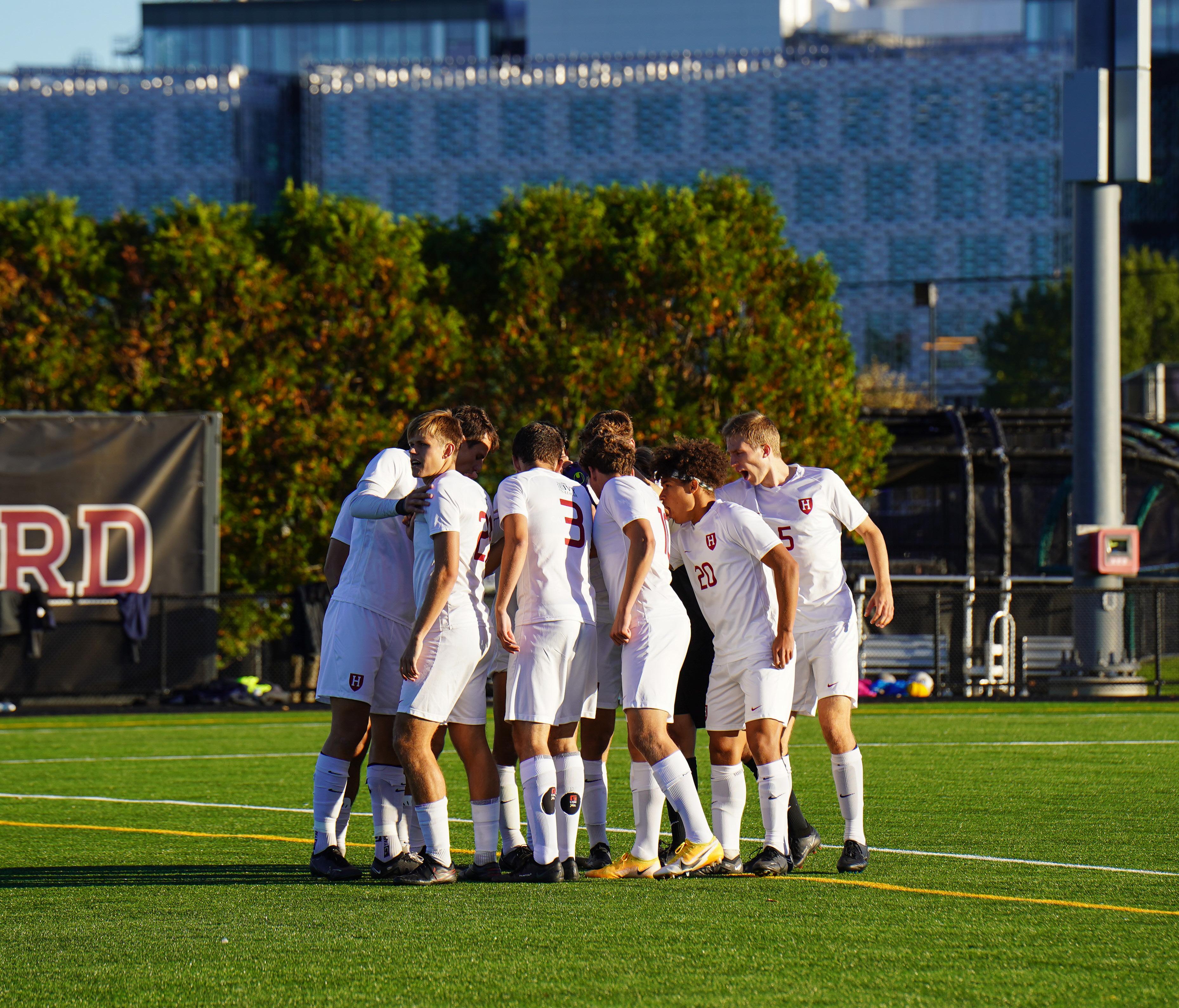
Ebbinge and Arlotti once again had big games for Harvard. Ebbinge’s four assists on the night brought him to second all-time at Harvard for career assists, as well as tying the school’s single-game assist record. Arlotti also tied his single-game assist record with three on the night.
Gutierrez opened the scoring in the 28th minute off of a play from Arlotti and Ebbinge. Just two minutes later, Bjarnson was able to increase the Crimson’s lead off of another assist from Ebbinge and Arlotti. Harvard was able to finish out its three goals in an eight-minute period with Tellado’s first of the night and ended the half with a commanding lead.

The Stags were undaunted and stormed back early in the second off of a shot from sophomore William Pierce in the 49th. Just a few minutes later in the 65th, Pierce struck again, this
time with a penalty kick to cut the Crimson’s lead to one. However, Tellado answered one minute later with his second goal of the game, increasing Harvard’s lead to two, where it stayed for the rest of the match.
Harvard vs. No. 12 Vermont, 1-1
It was a game of penalty kicks for Harvard and the nationally-ranked University of Vermont.
First-year goalkeeper Nick Willen made his first career start for the Crimson and was tested early, when junior Yaniv Bazini netted a penalty kick for the Catamounts to put Vermont up 1-0. Harvard played from behind until the 78th minute, when Arlotti drew a penalty kick and Ebbinge was able to put it away. Harvard generated few opportunities through the first half, with Arlotti earning a chance at the net off of a play by Ebbinge, who was making his first start of the season back with the Crimson after helping New Zealand qualify for the Olympics. Although Vermont played well through the
first, Harvard held advantages on shots (14-11) and shots on goal (72), mostly due to their strong second half.
Arlotti had another chance at the goal in the 57th minute, which was later followed by an Ebbinge free kick which forced Vermont’s senior goalkeeper Owen Jack to make a save. Senior Nik White almost tied it up for the Crimson in the 65th, as well as sophomore Marcos Ojea Quintana in the 77th. Finally, Arlotti was able to draw a foul just inside the box to set up a successful penalty kick from Ebbinge. Although both the Harvard and the Catamounts had late chances to win the game, both goalkeepers were able to make the saves and end the game tied 1-1.
Next Up
The Crimson will take on their second Ivy League rival of the season when they travel to Columbia on Saturday, Sept. 30th, at 1:00 p.m. EST.
maddie.barkate@thecrimson.com
MEN’S SOCCER
FRIDAY Field Hockey 5:00 p.m. Cross Country at Battle in Beantown Men’s Soccer at Columbia 1:00 p.m. Women’s Volleyball at Columbia 7:00 p.m. SATURDAY Women’s Golf at Yale Invitational Women’s Soccer at Columbia 5:00 p.m. Football at No. 5/6 Holy Cross 5:00 p.m. Men’s Water Polo at Princeton 12:00 p.m.
TAKING ON THE BEST Harvard hung tough against two top-20 teams, losing a close 1-0 match to UNH before forcing a 1-1 draw with Vermont.
The Harvard men’s soccer team huddles up against Columbia on Oct. 8 , 2022. SAMUEL M. BENNETT — CRIMSON PHOTOGRAPHER SEPTEMBER 29, 2023 THE HARVARD CRIMSON SPORTS 16
Read more at THECRIMSON.COM THC
Ethical Blindness
Newborn monkeys taken away from their mothers

Left alone in steel cages
Their eyes sewn shut
Raised by humans wearing welding masks
Experimented on and killed
Tell President Gay and Harvard Medical School to Stop This Torture: PETA.org/Harvard
a
a
Figure 3 in “Triggers for Mother Love” (bit.ly/3CuouJV) Margaret S. Livingstone (bit.ly/3rPG7z8) CC BY-NC-ND (bit.ly/3CTEzKx)
Photo of
mother monkey holding
stuffed animal after her real infant was taken away:
In Photos: The Feast of Saints Cosmas and Damian
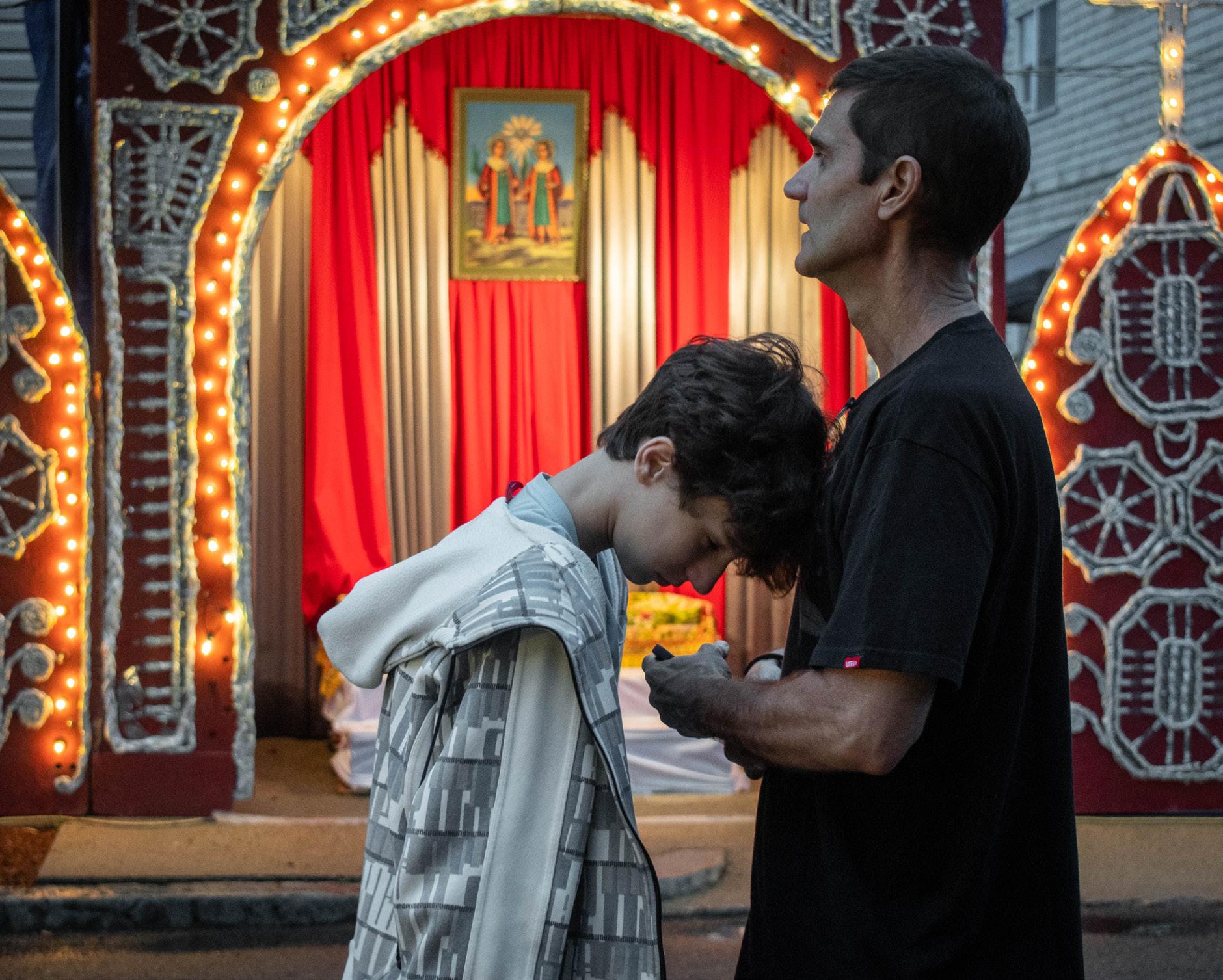


A priest prepares to lead the procession of the statues on Friday evening in front of the chapel.

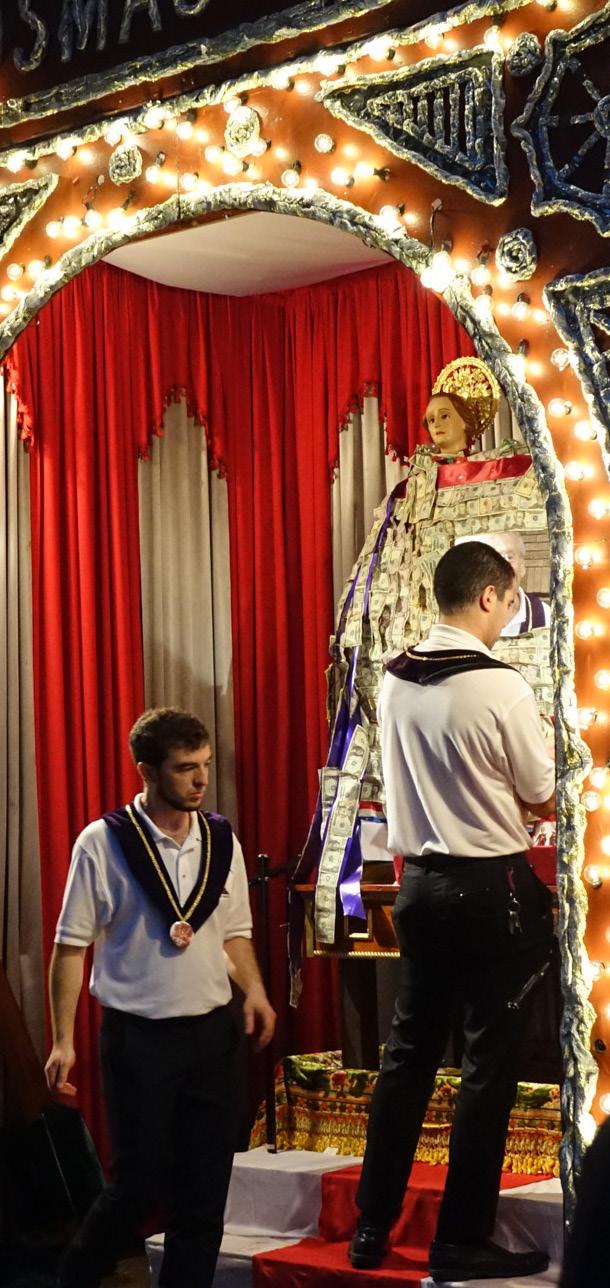
JULIAN J. GIORDANO
the rain, they lined up for a turn on the “Wave Runner.”


SACHI LAUMAS — CRIMSON PHOTOGRAPHER
“My hope is that we have young people that are involved and keep getting involved,” says DiDomenico. He adds that he hopes “their kids and their grandkids will continue this tradition that was started 100 years ago.”
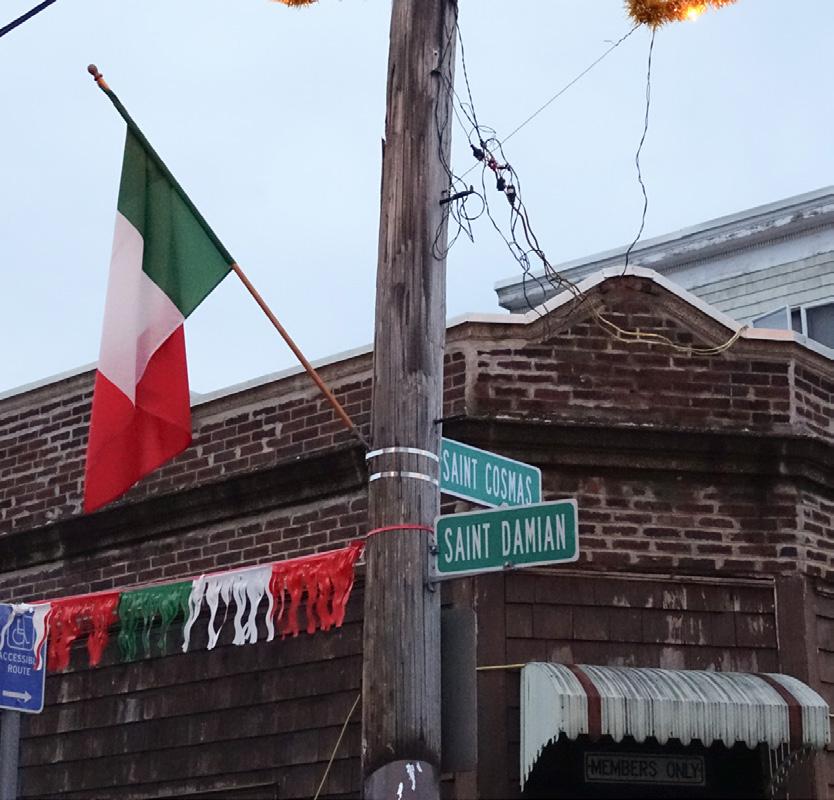
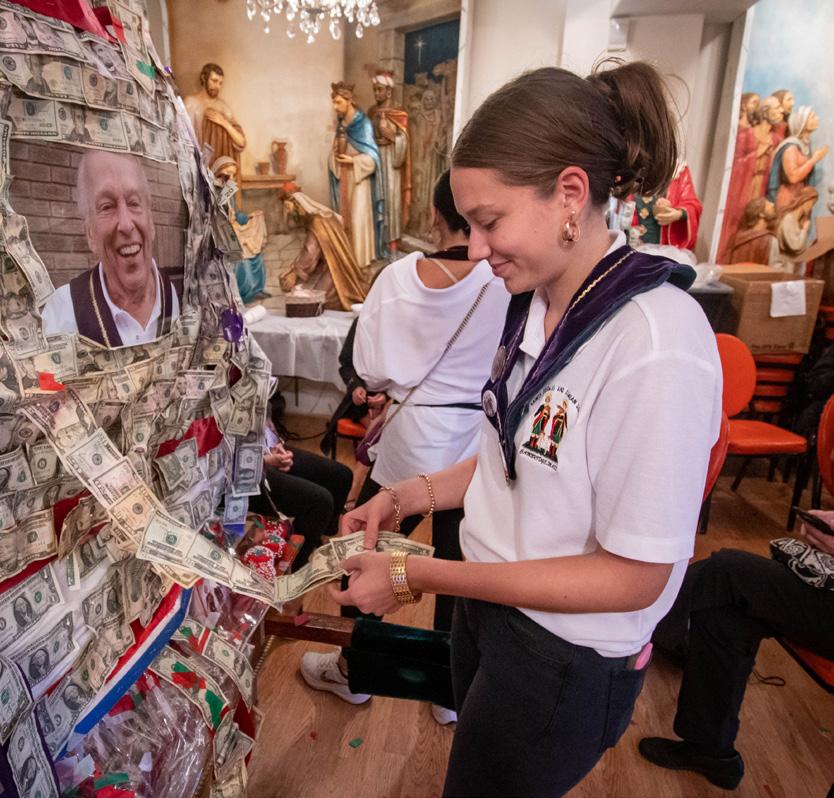
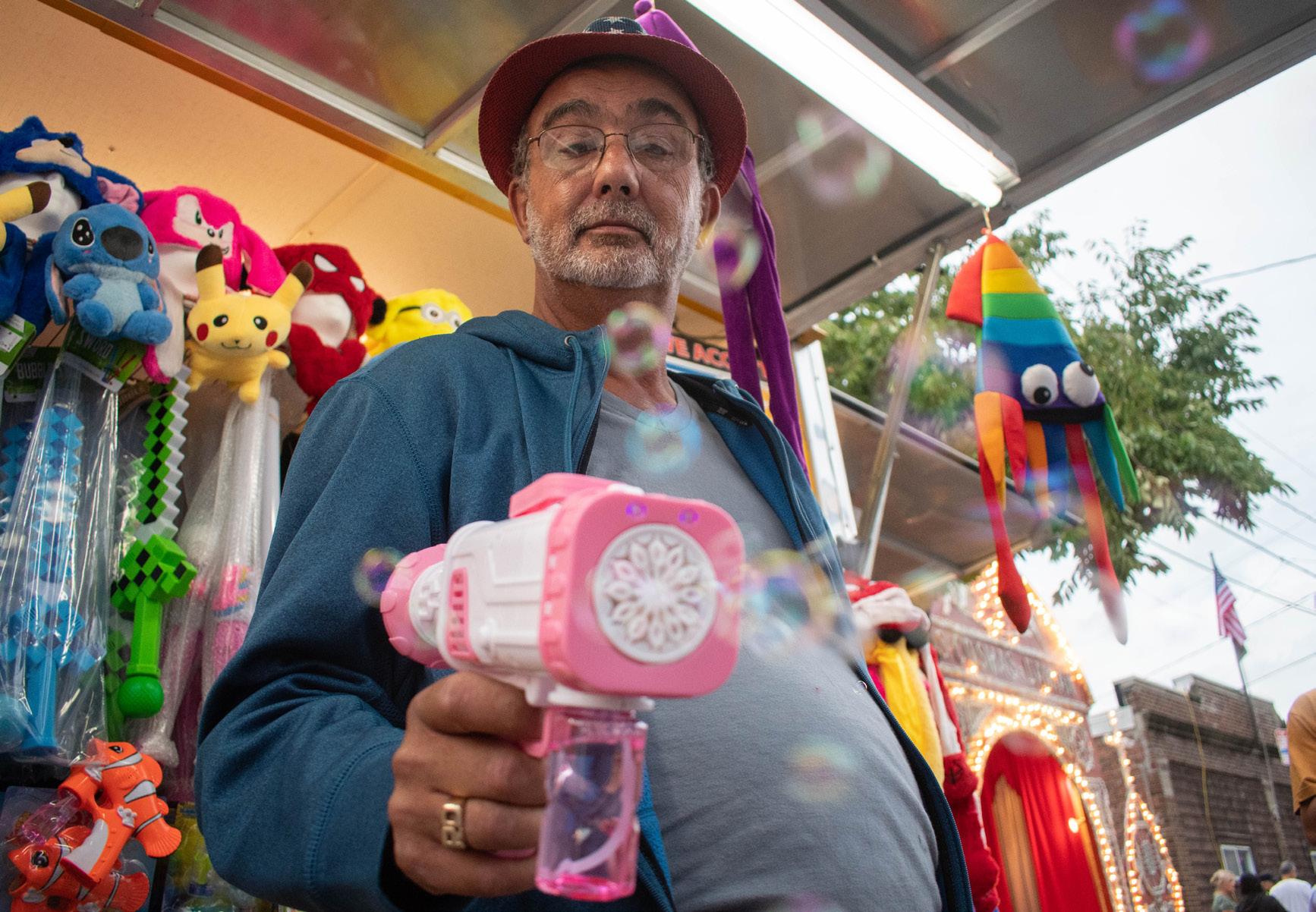

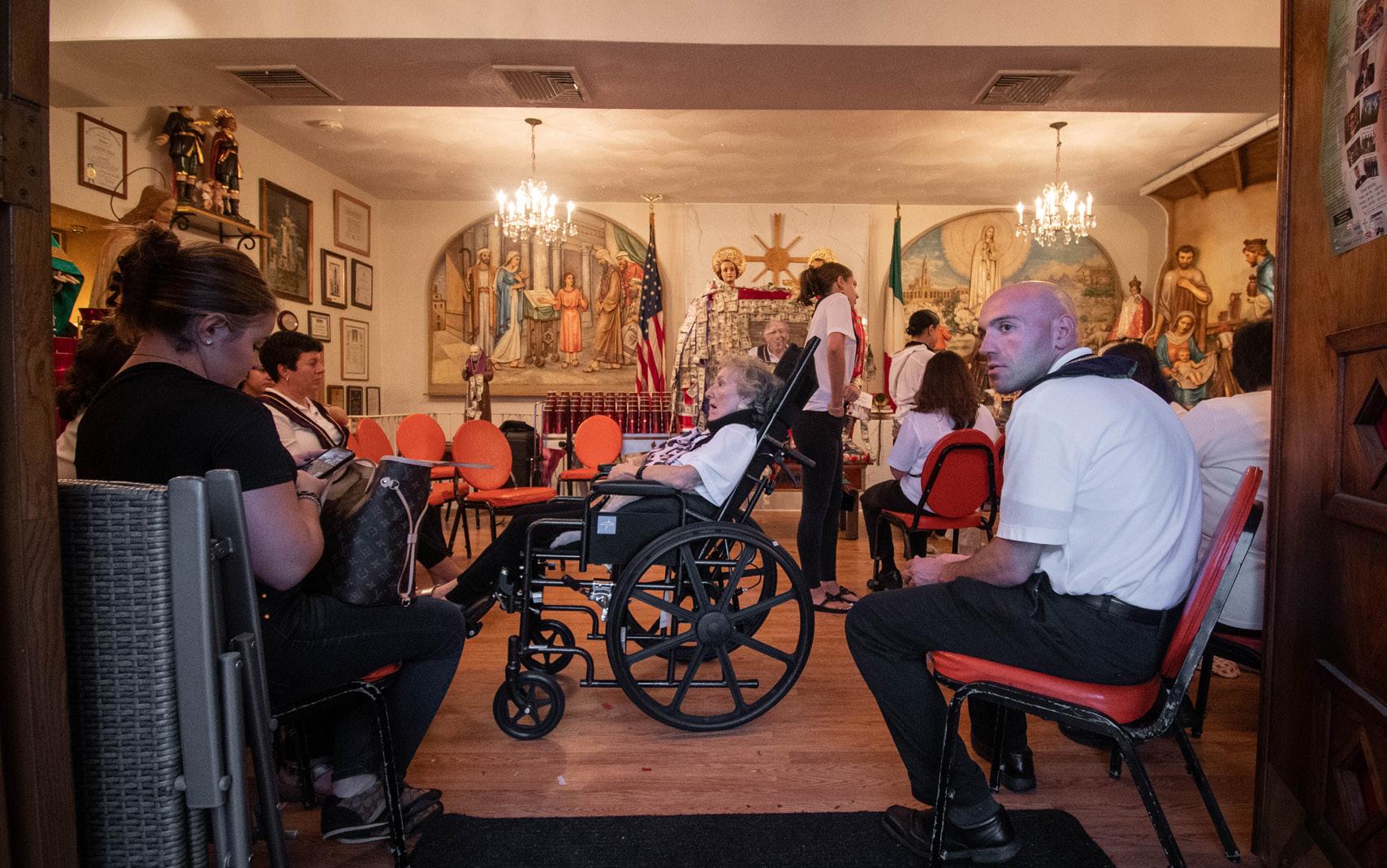
BEN Y. CAMMARATA— CRIMSON PHOTOGRAPHER

IN PHOTOS 18 THE HARVARD CRIMSON SEPTEMBER 29, 2023
EVERY YEAR, the residents of East Cambridge gather at the intersection of Porter Street and Warren Street to celebrate the Feast of Saint Cosmas and Damian, a festival brought by Italian immigrants from the town of Gaeta in 1926. The 98th annual celebration took place the weekend of Sept. 8 to 10, and we sent a team of photographers to cover it. Dozens of local businesses participate in the festival, from carnival attractions to local eateries. DiDomenico says that the festival costs upwards of $150,000 to put on each year. The event has dozens of sponsors, including Harvard and MIT. As a kid, DiDomenico followed his father — who was president of the Society — during the festival each year. After his father passed away, Sal took over running the festival. Now, his two teenage sons participate in the festival. BEN Y. CAMMARATA — CRIMSON PHOTOGRAPHER After the procession, the statues are placed on display on Warren Street. The priest leads a general intercession and attendees line up to be anointed with holy water and to pin money onto the statues. JULIAN J. GIORDANO — CRIMSON PHOTOGRAPHER A young boy admires another carnival ride as he rides one himself. Another reaches out to highfive his father aboard one of the carnival rides at the festival. These rides were popular with small children attending the festival: despite
— CRIMSON PHOTOGRAPHER
Cambridge.
chapel
Marietta Colarutolo. In
1920s, Colarutolo
city, Gaeta. As
Cosmas
BEN Y. CAMMARATA — CRIMSON PHOTOGRAPHER
year,
East Cambridge
weekend
day. Saints Cosmas
Damian
healing. BEN Y. CAMMARATA — CRIMSON PHOTOGRAPHER
Italian
Street
Street,
Saint Cosmas and Saint Damian streets. SACHI LAUMAS — CRIMSON PHOTOGRAPHER
The members of the Saints Cosmas and Damian Society gather in the chapel on Porter Street in East
The land where this
now stands was purchased in the 1940s by a group of women led by
the
and other local women had organized a group that would periodically gather to pray to the patron saints of their
the group grew, they called for life-sized statues of Saints
and Damian to be sent from their homeland.
Every
the Society parades the statues around
on the
after labor
and
are the patron saints of medicine. Attendees pray to the saints and pin money to the statues, asking for favors and
The
flag hangs proudly at the intersection of Porter
and Warren
also known as
JULIAN J. GIORDANO — CRIMSON PHOTOGRAPHER
















 BY LEANNE ALVARADO — CRIMSON PHOTOGRAPHER
BY LEANNE ALVARADO — CRIMSON PHOTOGRAPHER






















 BY SAMANTHA A. CHUNG CRIMSON STAFF WRITER
BY SAMANTHA A. CHUNG CRIMSON STAFF WRITER
 BY EMMA H. LU CRIMSON STAFF WRITER
BY EMMA H. LU CRIMSON STAFF WRITER


















